
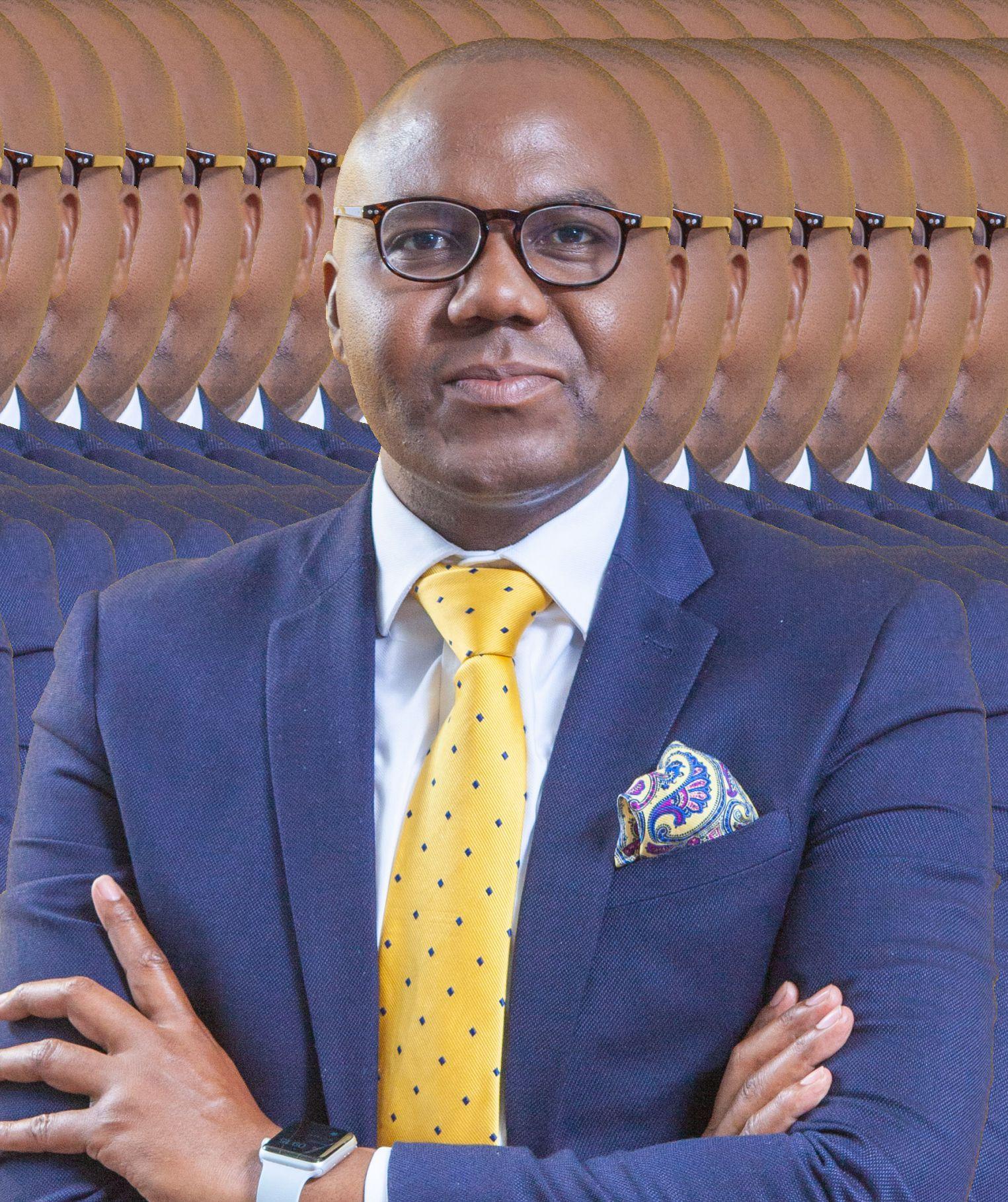

Afric n Leadership Promoting African dignity & opportunities globally OCTOBER 2022 THE ACCIDENTAL BANKING CZAR LANCE MAMBONDIANI

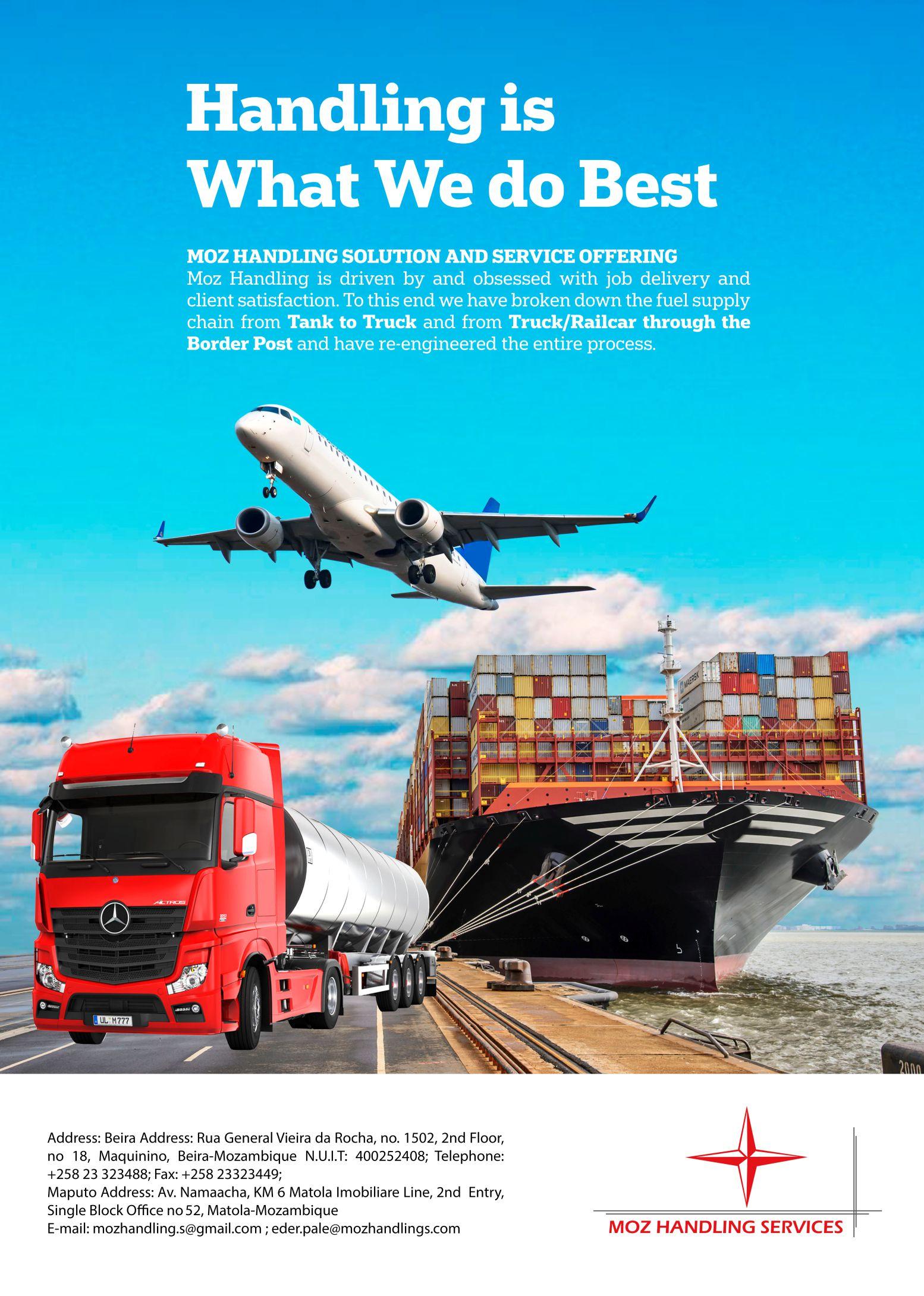
11. IFAL New York 2022 - Profile His Excellency Dr Mohamed Irfaan Ali President of The Co-operative Republic Of Guyana
12. IFAL New York 2022 - Profile of H.E. Gaston Browne Prime Minister of Antigua

. IFAL New York 2022 - Profile of Hon. Dr. Terrance M. Dew Prime Minister, St. Kitts and Nevis
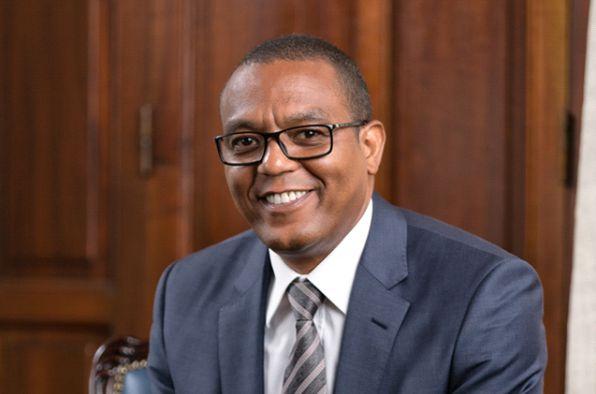
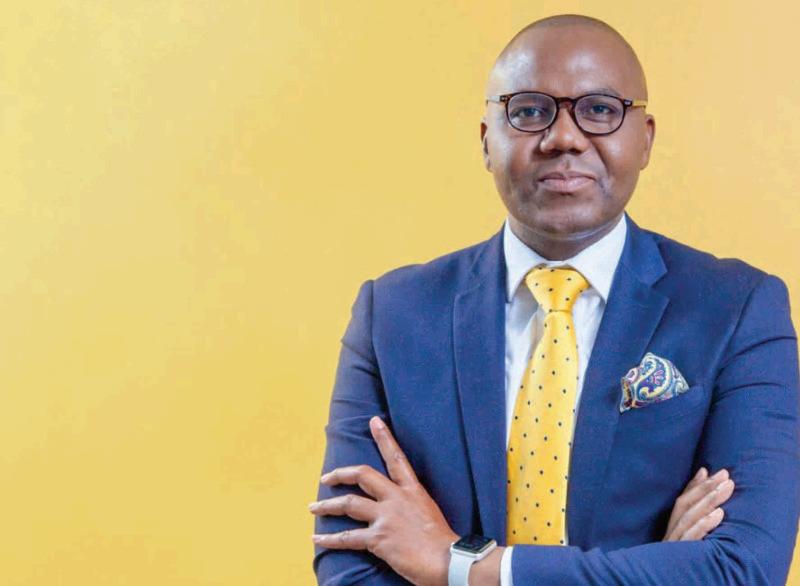
IFAL New York 2022 - Profile of HE Hon Philip Joseph Pierre Prime Minister of St Lucia
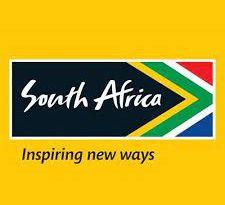
15. IFAL New York 2022 - Profile of HE Adama Barrow, President of The Gambia
16. IFAL New York 2022 - Profile of Hon. Mario Augusto Caetano Joao Minister of Economy & Planning
30. Mrs. Victoria Irabor & Depowa Uplifting the Wives of Fallen Heroes' By Extending a Helping Hand
Contents AFRICANLMAGAZINEwEADERSHIP ww africanleadershipmagazine co uk 64. 5 Actions to Prepare African Countries Better for the Next Pandemic 53. Trade-driven Industrialization In Africa 41. Nafco: Sustaining Government's Legacy Through The Free School Feeding Program In Ghana 62. Africa Youth Leadership: Building Local Leaders To Solve Global Challenges 67. Nigeria Pitches Debt Forgiveness for Climate-Change Funding Plan 69. Statement By H.E. Cyril Ramaphosa, President of The Republic of South Africa on Climate Change 45. Spearheading Pipeline Transportation of Petroleum Products & Storage In Zimbabwe 56. Mastercard: Promoting African Innovation & The Digital Economy 23 18 38
13
14.
49 04 P A G E
Afric n Leadership
...A Publication of
Ken Giami
Founder & Executive Chairman
Group Managing Editor - Kingsley Okeke editor@africanleadership.co.uk
Editor - Kembet Bolton kembet@africanleadeship.co.uk
Head of Creatives - Joseph Akuboh A.
Editorial Board
Peter Burdin, London UK - Chair Nwandi Lawson, Atlanta USA - Member
Simon Kolawole, Lagos Nigeria - Member
Peter Ndoro, SABC EditorJohannesburg - Member
Frenny Jowi, Nairobi Kenya - Member
Brig. Gen. SK Usman Rtd., Abuja Nigeria - Member David Morgan, Washington DC USA - Member

Furo Giami - Chief Operating Officer / Executive Director
Boma Benjy - Iwuoha - Group Head, Finance & Administration
Sasha Caton - Manager, UK & European Operations
Ehis Ayere - Group Head, Sales & Business Development
Izuchukwu Samuel Ukandu - Manager, Client Relations & Partnerships
Amana Alkali - Executive Assistant to the Chairman
Samuel M. Elaikwu - Manager, Sales & Business Developments
Happy Benson - Director of Operations North America
Christy Ebong - Head, Research & Admin - North America
Stanley Emeruem - Business Development Managers
Muna Jallow - West African Rep for The Gambia and Senegal
Oluwatoyin Oyekanmi - Head, South African Bureau
Bernard Adeka - Head, Nigeria SS/SE
CORPORATE HEADQUARTERS
Portsmouth Technopole, Kingston Crescent, Portsmouth PO2 8FA, United Kingdom; t: 44 23 9265 8276 | fax: +44 (0)23 9265 8201 | e: info@africanleadership.co.uk w | www.africanleadershipmagazine.co.uk
AFRICA & REGIONAL REPRESENTATIVES
Abuja Accra Atlanta Banjul Bujumbura Freetown Johannesburg London Monrovia Nairobi Washington DC
ISSN 2006 - 9332
While great care has been taken in the receipt and handling of materials, production and accuracy of content in the magazine, the publishers will not take responsibility for views expressed by the writer
JOIN THE CONVERSATION www.africanleadershipmagazine.co.uk
FOLLOW US ON SOCIAL MEDIA

Facebook: African Leadership Magazine

Twitter: @AfricanLM
Instagram: @africanleadershipmag
LinkedIn: African Leadership Magazine

YouTube: African Leadership Magazine
...Identifying, Celebrating & Enabling Excellence in Africa

AFRICANLMAGAZINEwEADERSHIP ww africanleadershipmagazine co uk
Magazine
The African Leadership Organization 05 P A G E
H. E. JOHN MAHAMA FMR. PRESIDENT OF GHANA H.E. MRS AMEEN GURIB-FAKIM FMR. PRESIDENT OF MAURITIUS


“It is always an honour to be in the companyofsuchdistinguishedfellow Africans, that the African Leadership Magazine events bring togetherAfricans who have committed their lives to changing the negative narrativeaboutourcontinent.”
“It is very gratifying that we now have an organization like African Leadership Magazine, which endeavors to promote good governance and impactful leadership in Africa - bring the best of Africa to theglobalstages.”
DR GOODLUCK JONATHAN FMR. PRESIDENT OF NIGERIA

“African Leadership Magazine has become a brand for Africa and I am pleased to be associated with it especially because of the caliber of AfricanLeadersonitʼsboard.”
H.E. JOHN KUFOUR FMR. PRESIDENT OF GHANA

“I believe people are more important than power and anything that promotes good people and leadership is what we need in Africa, and that is what African Leadership Magazineisdoing.”
H.E. JAMES A MICHEL FMR. PRESIDENT OF SEYCHELLES

“I wish to express my sincere thanks and deep appreciation to the African Leadership Magazine for the work that it is doing on the continent, and especially in advancing the cause of small Islands Developing states, Any effort aimed at increasing the visibility of the good workbeing done by leadership in Africa does positively impact on the continent and that is what the African Leadership Magazineisdoing.”
H.E. ERNEST BAI KOROMA FMR. PRESIDENT OF SIERRA LEONE
“I am delighted to be associated with the sterling work that the African Leadership Magazine is doing on the continent. Democratic governance is the elephant in the room, and the continent needs to reaccess its governance systems. The agenda on global sustainable development shows that Africans are lagging behind. Africa will need to reinvent its governance system with its youth growingpopulation.”
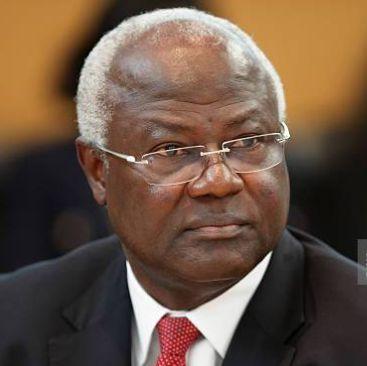
WHAT NOTABLE LEADERS ARE SAYING ABOUT AFRICAN LEADERSHIP MAGAZINE AFRICANLMAGAZINEwEADERSHIP ww africanleadershipmagazine co uk 06 P A G E
P A G E
“I feel deeply honored to be associated with the African Leadership Magazine as it is a veritable platform to honor true service in Africa. I commend your efforts and assure you of my continued support and the support ofthegoodpeopleofLiberia.”
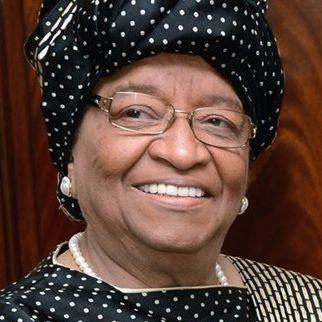
“African Leadership Magazine is doing a wonderful job of speaking for Africa and Africans. The magazine remain a good example of what young people in Africa can do in the world. Best wishes in keeping the Africandreamalive.”


“It is an honour to participate at this African Leadership Magazine's 2020 Ceremony, and I commend the magazine's focus to reshape positively, the dominant narratives about the African continent, especially towards the pursuit of peace-building and democracy on thecontinent”
“I thank you so much, African Leadership Magazine for the great work that you are doing for the continent. Your tradition of awarding excellence as I have seen in the line up of African Leaders who have received the African Leadership Awards, is something ver y commendable”
“The future of African people and improving the quality of Leadership on the African continent is my vision and I find in African Leadership Magazine - a true partner I am also happy that the African Leadership Awards is doing at a lower level, what I intend to achieve at the Head of State level. That is why I flew to Paris just to be a part of what you are doing here at the African Leadership Magazine”

“The African Leadership Awards truly captures the essence of my message which is that, success shouldnʼt be solely defined by wealth. It should be about the positive impact and influence that one has had in his community”
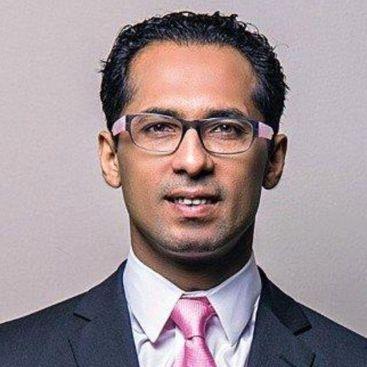
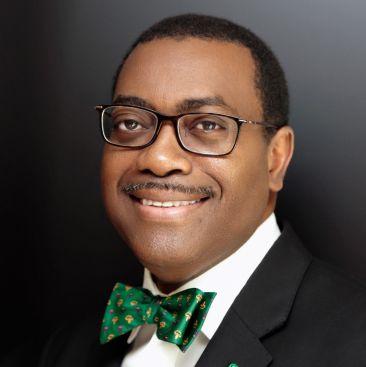
WHAT NOTABLE LEADERS ARE SAYING ABOUT AFRICAN LEADERSHIP MAGAZINE
DR. MO IBRAHIM Founder, Mo Ibrahim Foundation
MRS. ELLEN JOHNSON - SIRLEAF Nobel Peace Prize Winner & Fmr. President, Republic Of Liberia
MO DEWJI Tanzania Businessman & Philanthropist
H.E JAKAYA KIKWETE Fmr. President Of Tanzania
H.E DAVID MABUZA Deputy President Republic Of South Africa
AFRICANLMAGAZINE EADERSHIP
DR. AKINWUMI ADESINA President, African Development Bank
www africanleadershipmagazine co uk 07
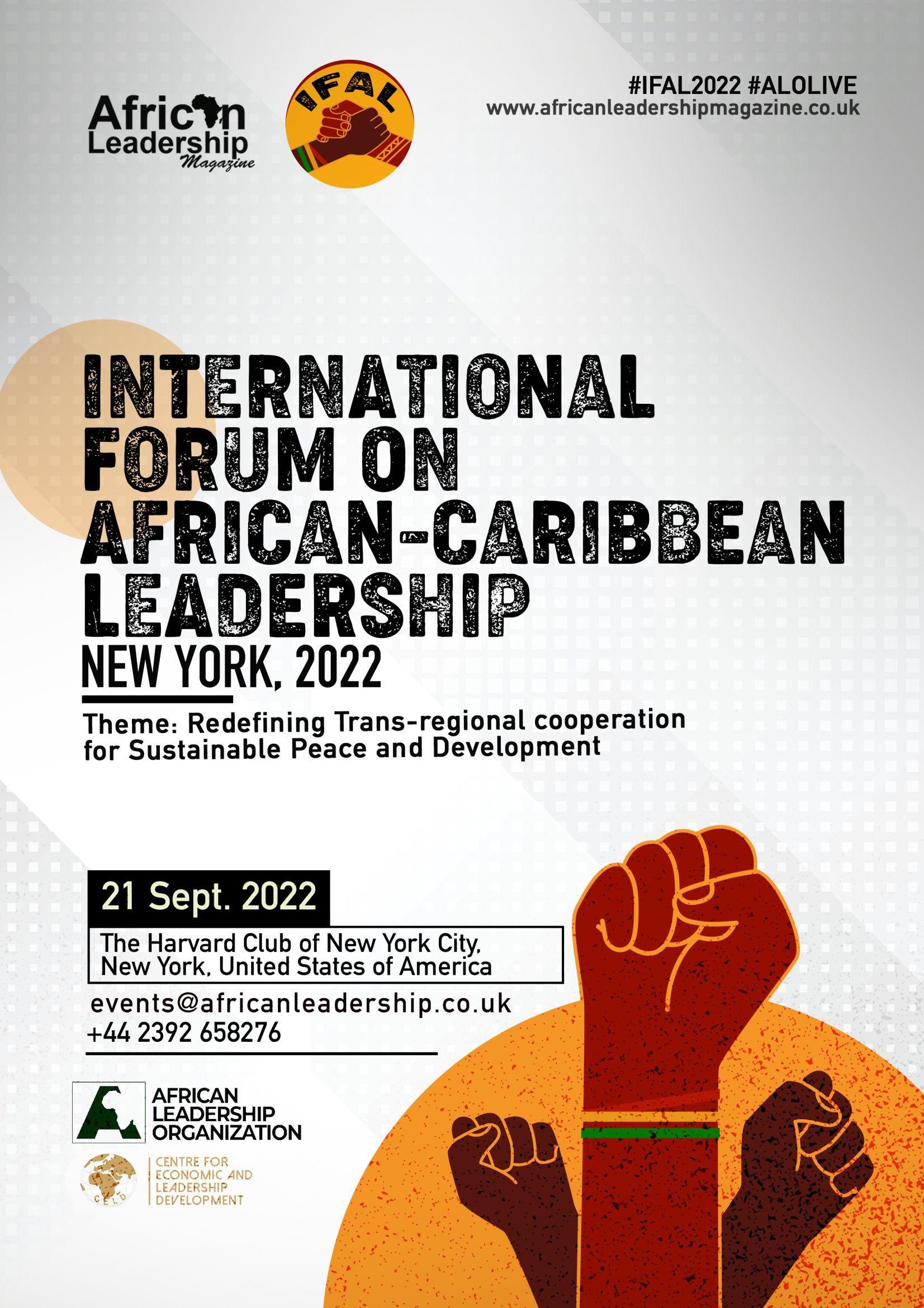
African Leadership Magazine (ALM) has concluded its first-ever International Forum on African-Caribbean Leadership (IFAL) with five Heads of states from Africa and the Caribbean region attending and calling for greater cooperation among the nations and peoples of both regions. The forum, which took place on the margins of the 77th United Nations General Assembly (UNGA) at the iconic Harvard Club of New York City, also brought together over 250 business, political and social justice leaders to debate issues ranging from climate action, reparations, food security, trade and defence, among others.
The five heads of states who also addresses the forum included H.E. Dr Mohamed Irfaan Ali, President of Guyana; H.E. Gaston Browne, Prime Minister of Antigua and Barbuda; H.E. Dr. Terrance M. Dew, Prime Minister, St. Kitts And Nevis, HE Philip J. Pierre, Prime Minister of St. Lucia and HE Adama Barrow, President of The Gambia, ably represented by the Gambia Minister of Foreign Affairs. The event was therefore truly an opportunity for the regional leaders to build strategic partnerships, bilateral cooperation, as well as increase engagements in trade and investments, innovation and technology transfer, culture and tourism, and other sectors. The theme of the programme was - Redefining Trans-regional Cooperation for Sustainable Peace and Development.
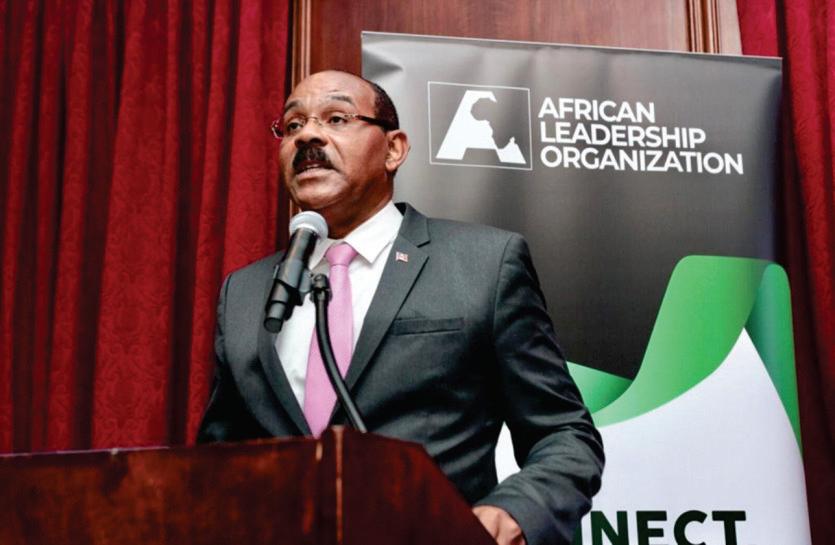
The forum, which also featured two high-level panel sessions on the current state of governmental and economic policies impacting social institutions in Africa and the Caribbean countries, with three experts as panellists, namely- Van McCormick, Executive Director, International Economic Alliance (Havard); Hon Marlo Oaks, Treasurer- State of Utah; and Mr. Nathan Estruth, Former Vice President, Procter & Gamble. The second panel session took a different turn with focus on “Viewing the World from the Lens of Regional/Domestic National Security with Gen (rtd) William “Kip” Ward, Former Commander of US AFRICOM and US Colonel Sergio Do La Pena (fmr0 Deputy Assistant Secretary for Western Hemisphere, US Department of Defence as expert panellists.
The events also had a special awards presentation ceremony to honour and recognise African leaders who have distinguished themselves excellently in business and public service, as well as contributed immensely to the socio-economic development of their communities. The honourees during the International Forum on African-Caribbean Leadership (IFAL) included Mr.
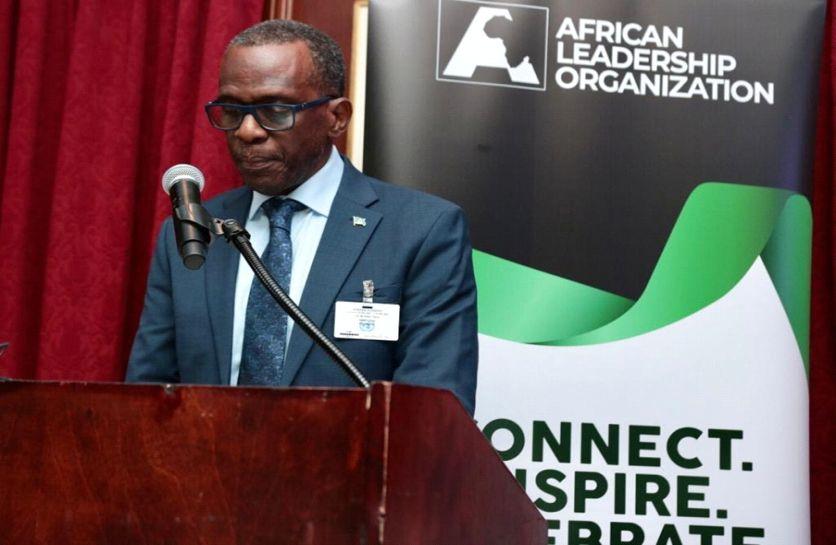
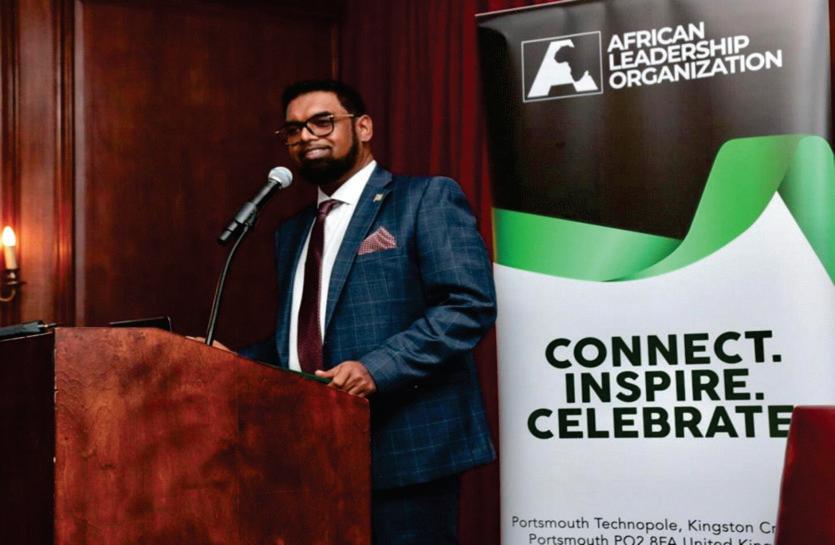
AFRICANLMAGAZINEwEADERSHIP ww africanleadershipmagazine co uk
IFAL NEW YORK 2022 09 P A G E
Hanan Abdul-Wahab, CEO, National Food Buffer Stock Company Limited (NAFCO) Ghana who received the African Business Leadership Commendation Award in Food Security; H.E. Mário Augusto Caetano João, Minister of Economy and Planning, Angola who received the African Public Service Excellence Award; and Barr. Mrs Vickie Anwuli Irabor, President of the Defense and Police Officers' Wives Association (DEPOWA) who received the SDG Advocacy & Mental Health Leadership Award. The other honorees included Mr Wilfred Matukeni, CEO, National Oil Infrastructure Company, Zimbabwe who received the African Business Leadership Excellence Award; and Mr José de Lima Massano, Governor, National Bank of Angola who received the African Public Service Leadership Excellence Award.
The International Forum on African-Caribbean Leadership (IFAL) is an ALM flagship event held annually on the sidelines of the United Nations General Assembly to bring leaders together in setting policy direction and as a peer review mechanism. Over the years, the event has become a platform that connects world leaders, especially from Africa, policymakers and private sector players with focus on the challenges and the progress of the African people. This forum which has been running for eight years and primarily focused on African leaders was expanded in scope for the first time to include Caribbean nations in a bid to strengthen trans-regional cooperation between Africa and the Caribbean nations.
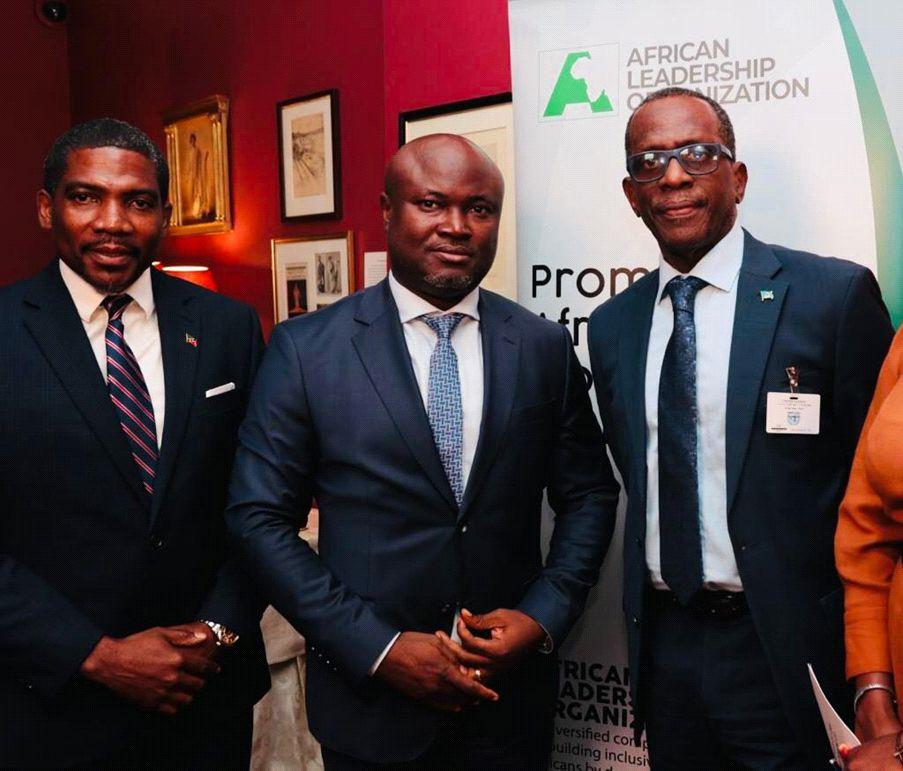
AFRICANLMAGAZINEwEADERSHIP ww africanleadershipmagazine co uk IFAL NEW YORK 2022 10 P A G E
His Excellency
Dr Mohamed Irfaan Ali
President of the Co-operative Republic of Guyana
President of the Co-operative Republic of Guyana and Commander-in-Chief of the Armed Forces, His Excellency, Dr Mohamed Irfaan Ali, was sworn in as Guyana's Ninth Executive President on August 2, 2020.
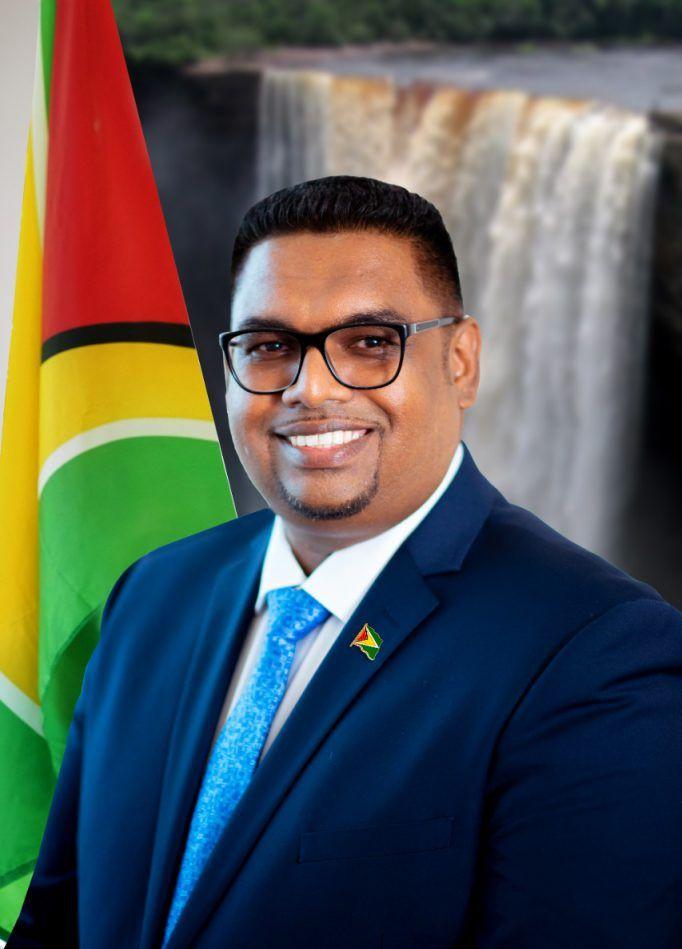
Dr Ali is one of two sons of his parents, who are both educators. He was born on April 25, 1980, into a Muslim, Indo-Guyanese family at Leonora, West Coast Demarara,
His early education started at Leonora Nursery and Primary schools and progressed to the Cornelia Ida Primary School, while he completed his secondary education at the St Stanislaus College in Georgetown.
Dr Ali is the holder of a Doctorate in Urban and Regional Planning from the University of the West Indies, a Master of Arts Degree in Manpower Planning, a Post Graduate Diploma in International Business, a Post- Graduate Certificate in Finance from Anglia Ruskin University, an LLM Degree in International Commercial Law at the University of Salford and a Bachelor of Arts Degree (Hons.) in Business Management from the University of Sunderland.
He was also a member of the Canadian Institute of Management (up to 2017) and Project Management Professional-PMP (2006).
He previously served as Project Manager of the Caribbean Development Bank's Project
Implementation Unit in the Ministry of Finance and Senior Planner in the State Planning Secretariat. He became a member of the National Assembly of Guyana in 2006 and was subsequently appointed to the portfolios of Minister of Housing and Water and Minister of Tourism Industry and Commerce. During his time at the Ministry of Housing, he implemented the most extensive endowment campaign in the history of the country, backed by a massive distribution of lots to citizens of all social strata and geographic regions.
In the National Assembly, Dr Ali was also a leading spokesperson on the economy and finance. He served as chair of one of the most important committees, the Public Accounts Committee, and co-chair of the Economic Services Committee of the Parliament of Guyana.
Dr Ali is married and is a father
AFRICANLMAGAZINEwEADERSHIP ww africanleadershipmagazine co uk
IFAL NEW YORK 2022 - PROFILE 11 P A G E
H.E. Gaston Browne
Gaston Browne is the Prime Minister and Minister of Finance, Corporate Governance and Public Private Partnerships. He is a graduate of the University of Manchester, United Kingdom with a Master of Business Administration (MBA), majoring in Banking and Finance. He served as Commercial Banking Manager for a major banking consortium in Antigua and Barbuda, comprising offshore and onshore banks and trust companies, managing in excess of US $400 million dollars in assets.
He became an elected member of Parliament in 1999 representing the constituency of St. John's City West and has been re-elected in four subsequent general elections.
PM Gaston Browne is well known for his philanthropic work which is seen through his contributions to the empowerment of the Point and Villa areas within his Constituency

In 2012, he was elected as Leader of the Antigua and Barbuda Labour Party which he steered to
victory in General Elections in 2014, becoming Prime Minister, and then again in March 2018, increasing its representation in Parliament.
Between 1999 and 2004, he served as Minister of Planning, Trade, Industry, Commerce and Public Service Affairs. While in opposition in Parliament between 2004 and 2014, P.M. Browne returned to the private sector as a businessman and launched several successful ventures to include Real Estate Development and Real Estate Management.
On becoming Prime Minister, the Caribbean Heads of Government appointed him to have lead responsibility for financial matters, cricket, aviation and derisking in the quasi Cabinet of CARICOM.
Prime Minister Browne is married Member of Parliament, Mrs. Maria Bird Browne and is the father of three children. He has special interest in soccer, crick and yachting.
IFAL NEW YORK 2022 - PROFILE AFRICANLMAGAZINEwEADERSHIP ww africanleadershipmagazine co uk
Prime Minister of Antigua
12 P A G E
Hon. Dr. Terrance M. Dew
Prime Minister, St. Kitts and Nevis
The Honourable Dr. Terrance M. Drew is the 4th Prime Minister of the twin-island Federation of St. Kitts and Nevis following General Elections on August 5th, 2022, in which he led the St. Kitts – Nevis Labour Party to secure an outright majority in Parliament, winning 6 of the 11 seats in the National Assembly
Prime Minister Drew also currently holds the portfolios of Minister of Finance, National Security, Immigration, Health, and Social Security
Dr. Drew is serving his first term as the elected Member of Parliament for the constituency of St. Christopher 8.
Prime Minister Drew serves as the Lead Head of Government within CARICOM bearing responsibility for Health.
A medical doctor, Prime Minister Drew has provided health care as a General Practitioner at the Joseph Nathaniel France General Hospital as well as via private practice in St. Kitts, following his studies at Instituto Superior de Ciencias Médicas in Santa Clara, in Cuba (from 1998), and has specialized in Internal Medicine in St. Kitts, following his studies at the Paul Foster School of Medicine in Texas (2010-2013)
Prime Minister Drew is a Diplomate of the American Board of Internal Medicine (ABIM).
Prime Minister grew up in the community of Upper Monkey Hill located in the parish of St. Peter and is the son of Ras Gerzel Pet Mills and Michael 'Mic Stokes' Heyliger
Prime Minister Drew founded the C.A.R.E. Foundation in February 2021, a non-profit, non-partisan organization that aims to provide assistance to citizens nationally, across both islands of St. Kitts and Nevis.

AFRICANLMAGAZINEwEADERSHIP ww africanleadershipmagazine co uk
13 P A G E
His Excellency Honorable Philip Joseph Pierre has served as Prime Minister of St Lucia, an island nation since July 28, 2021. Pierre is the Minister of Finance, Economic Development and Youth Economy and has been the leader of the Saint Lucia Labour Party (SLLP) since June 18, 2016.
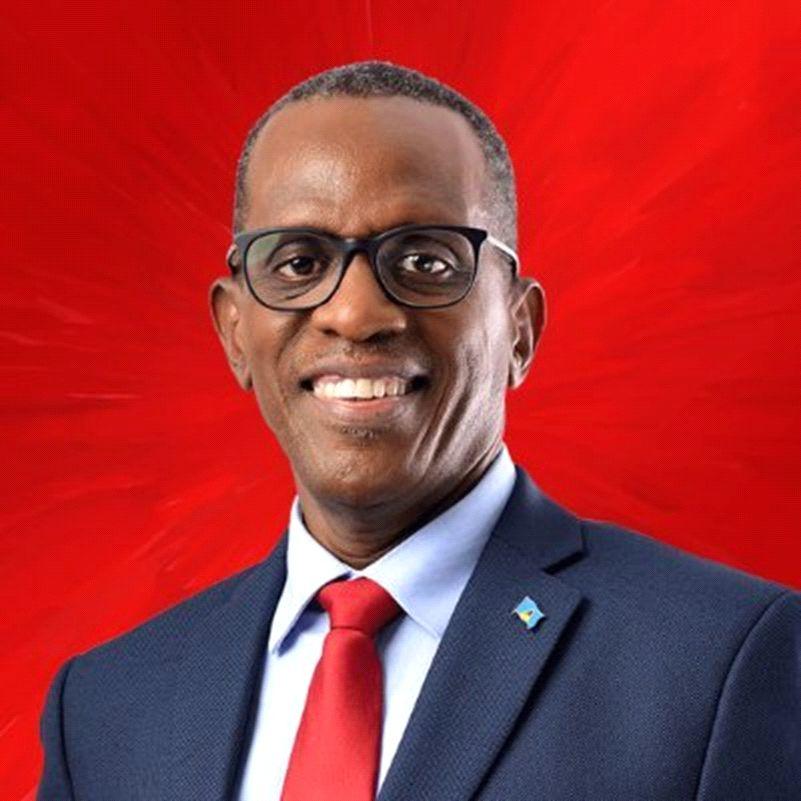
Pierre was born and raised in Waterworks, Castries East on Saint Lucia. The exact date of his birth is unclear and it was estimated to be sometime between 1954 and 1955. Pierre's mother, Evelyn, was a teacher, and his father, Auguste, was a policeman. He studied at Saint Mary's University and completed a BA (hons) in Economics and a Master of Business Administration at the University of the West Indies.
After graduating, Pierre began his career as a lecturer at St. Mary's
HE Hon Philip Joseph Pierre
Prime Minister of St Lucia
University serving there from September 1972 to September 1973. He was then a manager at J.Q. Charles Limited (1976-1978), Audit Clerk at Coopers and Lybrand (1978-1984), Audit Senior at Panell Kerr Forster (1984-1988), and Financial Controller at Stanthur Company Limited (1988-1990). He was also a Director of the National Research and Development Corporation (NRDF) from 1985 to 1994. From 1990 to 1997 he was Managing Director of Philip J. Pierre Business Services Limited (Saint Lucia).
Pierre joined the Saint Lucia Labour Party (SLP) in 1985 and served as the party's treasurer from 1986 to 1992. In 1992, he stood for the first time in the Castries East general election but did not win. Pierre stood again in 1997 and won. In the subsequent Kenny Anthony-led SLP government, Pierre served as Minister of Tourism, Civil Aviation, and International Financial Services from 1997 to 2000.
Pierre was re-elected as MP for Castries East in the 2001, 2006 and 2011 general elections. In 2011, he was sworn in as Deputy Prime Minister and Minister of Infrastructure, Port Services, and Transport. In the 2016 general election, Pierre retained his seat but the SLP lost the election. Kenny Anthony resigned as party leader and Pierre was then elected as his successor on June 18, 2016. He also became parliamentary leader of the opposition.
Philip J. Pierre National Address Announcement (Caribbean News Global)
Pierre is a member of the Commonwealth Parliamentary Association (CPA). He is also a member of the Caribbean Community Parliamentary Assembly and attended its inaugural session in Barbados in 1996. He led the SLP in the 2021 general elections, where the party won a majority of seats. He was sworn in as Prime Minister of Saint Lucia on July 28, 2021.
AFRICANLMAGAZINEwEADERSHIP ww africanleadershipmagazine co uk
IFAL NEW YORK 2022 - PROFILE 14 P A G E
HE Adama Barrow
His Excellency President Adama Barrow was until he election as president, a real estate developer. The is the 3rd and current president of The Gambia. Barrow defeated Yahya Jammeh in the 2016 Gambian presidential election, but because the incumbent president initially refused to recognize the victory, Barrow was inaugurated at the Gambian embassy in Senegal on January 19, 2017. He returned to Gambia on January 27, 2017.
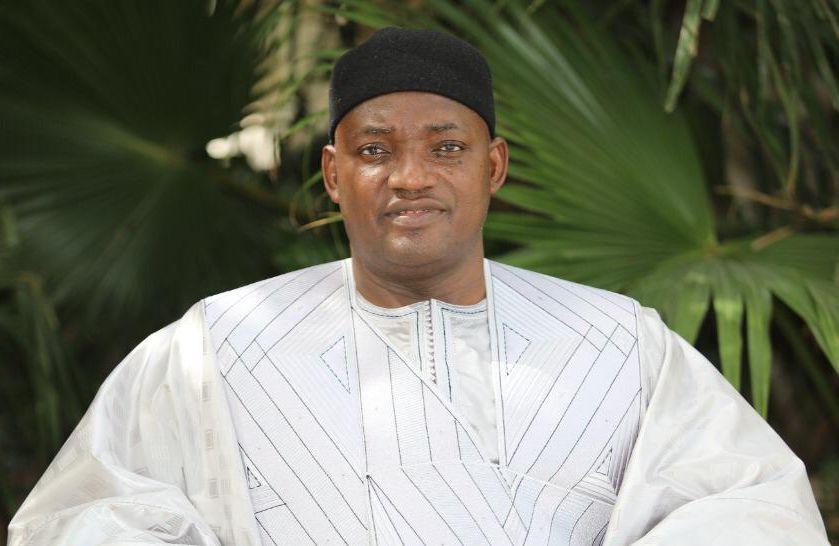
Barrow was born on February 16, 1965, in Mankamang Kunda, British Gambia (Gambia), in a small village near Basse Santa Su to Mamudu Barrow and Kaddijatou Jallow, two days before Gambia achieved independence from the United Kingdom. Barrow attended Koba Kunda primary school, Crab Island secondary school, and then received a scholarship to the Muslim High School located in Banjul, the capital of Gambia.
After graduation, Barrow worked for Alhagie Musa and Sons, a Gambian energy company where he became a sales manager. Barrow moved to London, England, in the early 2000s, where he studied for a degree in real estate while working as a security guard to help finance his education. Barrow returned to Gambia in 2006 and founded Majum
Real Estate. He remained CEO of the company until 2016.
On October 30, 2016, Barrow was chosen by a coalition of seven opposition parties as their endorsed candidate for the 2016 Gambian Presidential Election. Before being a presidential candidate, Barrow had not previously held any elected office, but he had served as treasurer of the United Democratic Party (UDP). He resigned from the UDP on November 3, 2016, to run as an independent with the backing of Coalition 2016. During his first campaign, he promised to return Gambia to its membership in the Commonwealth of Nations and the jurisdiction of the International Criminal Court. He also promised to reform security forces, suggesting that they should be “distanced from politics.” Barrow won the election held on December 1, 2016, with 43.34 percent of the vote, Yahya Jammeh won 39.6 percent of the vote, and a third-party candidate Mama Kandeh won 17.1 percent of the vote.
He also won reelection in 2022, to serve for his second and final term.
Barrow is a devout Muslim who follows Sunni Islam.
AFRICANLMAGAZINEwEADERSHIP ww africanleadershipmagazine co uk
IFAL NEW YORK 2022 - PROFILE 15 P A G E
Hon. Mario Augusto Caetano Joao
Minister of Economy & Planning
Mário A. Caetano João was born in 1978 in Luanda, Angola, where he attended primary and secondary school (1983-1995), with a pause from 1990-1992 when he moved to Bonn, Germany. He then went to the Czech Republic where he completed high school and college (1995-2007). He holds a Masters in Agricultural Economics (MSc) from the Faculty of Economics and Management of the University of Agriculture in Prague (2006), a Masters and PhD in African Studies from the Faculty of Arts of the Charles University of Prague, Czech Republic (2007 and 2009) and is a PhD candidate at the Faculty of Economics and Management at the Prague University of Agriculture (since 2018).
Within his professional journey, he has beena trade and investment manager at the Portuguese Agency for Investment and Foreign Trade (AICEP), Commercial Section of the Portuguese Embassy in Prague (20042007) and Head of Liaison and Cooperation Section at the Angolan Customs (2008-2012). At the same time, he was a member of the Multisectoral Technical Group for the implementation of the SADC Protocol on Trade
(2008-2010) and the Angolan Negotiating Group for the Negotiation of Economic Partnership Agreements with the European Union (2007-2012). In 2011,he livedin Gaborone, Botswana, where he worked as a trade expert in the SADC Directorate of Trade, Industry, Finance and Investment (TIFI).
In 2012, he was transferred to the Studies and International RelationsDirectorate of the Angola Ministry of Finance, having held the position of Head ofDepartment for Macroeconomic Policy and Management (2013-2015) and Head of Department for International Relations (20152016). From 2016 to 2019, he served as Advisor to the Executive Director of the 25th Constituency at the World Bank Group (WBG) in Washington, DC, United States of America and in 2019 he was nominated Executive Director and CFO of the Angola Debt and Stock Exchange (BODIVA).
In 2020, he was appointed Secretary of State for Economy and later, in 2021, as Minister of Economy and Planning.

IFAL NEW YORK 2022 - PROFILE AFRICANLMAGAZINEwEADERSHIP ww africanleadershipmagazine co uk
16 P A G E


The Angolan economy has recorded an impressive macroeconomic progress in the last two years, marked by the government’s commitment towards economic diversification and transformation agenda. In this exclusive interview with the African Leadership Magazine UK, the Minister of Economy & Planning, Hon. Mario Augusto Caetano Joao, talks about the government’s effort to place Angola on a sure foot and sustained economic growth. Excerpts:
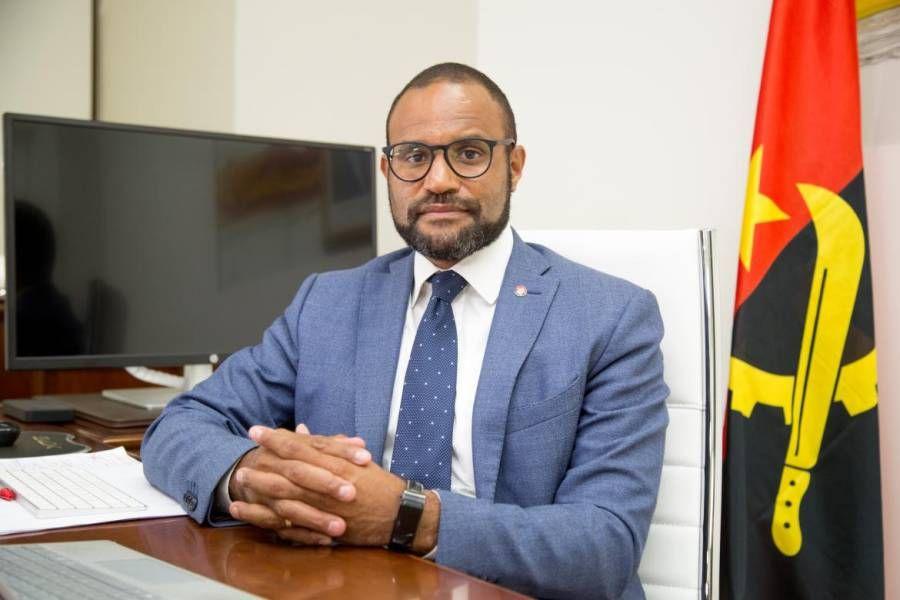
Leading Angola’s Diversification & Transformation Agenda
Some analysts have hailed Angolaʼs macroeconomic improvements, recorded in the last two years. Can you share some of these successes with us?
Our country was coming out of a 5-year recessive cycle of economic activity and a scenario of profound macroeconomic imbalances, whose removal forced the adoption of a Macroeconomic Stabilization Program, supported by the International Monetary Fund:
Ÿ
Fiscal sector: Between 2014 and 2017, there was a period of successive deficits in the fiscal accounts that was reversed in 2018, as a result of a comprehensive fiscal consolidation process. However, in 2020, due to the negative effects of COVID-19, the country returned to a deficit of 1.9%. In 2021, fiscal surplus balances resumed, with the global of 3.8% and the primary of 7.7%, in relation to GDP. For 2022, the forecasts point to a fiscal surplus with an overall 6.6% and a primary surplus of 9.7%, in relation to the GDP.

AFRICANLMAGAZINEwEADERSHIP ww africanleadershipmagazine co uk
COVER
18
Ÿ
For the coming years, the Government will remain committed to controlling the non-oil primary deficit, in line with the Public Finance Sustainability Law

Regarding Government Debt: The stock of public debt denominated in foreign currency decreased from US$ 80.84 billion in 2017 to US$ 70.43 billion in 2021. The stock of domestic debt denominated in foreign currency followed the same trend, falling from US$ 36.09 billion in 2017 to US$ 19.79 billion in 2021. In relative terms, the stock of public debt went from 129% of GDP in 2020 to 77% of GDP in 2021, signaling the downward trajectory of debt ratio.
Ÿ External sector: In 2018, a process of reforms in the foreign exchange market was initiated, including changing the exchange rate regime from fixed to floating exchange rate, in order to provide an effective buffer against shocks, restore balance, ensure efficient allocation of scarce foreign exchange resources, improve the competitiveness of the economy, and support economic diversification.
The exchange rate adjustment had a positive impact on International Reserves, with a smaller contraction between 2018-2021, by approximately 7%, compared to the drop of almost 49% recorded in the period 20142017. Since November 2020, the country's foreign exchange transactions have become more secure and predictable and the foreign exchange market is functioning normally. The national currency has remained stable against major international currencies. In 2021, the national currency appreciated against the US dollar on the primary market by 18.24%, standing at US$/Kz 554.98. At the end of the first Semester of 2022, the national currency settled at US$/Kz 428.20 highlighting the remarkable stability of the foreign exchange rate, with the gap between the official and informal foreign exchange rate having reduced significantly, from 150% at the end of 2017, to less than 10% currently.
Ÿ Additionally, there was a reversal of the deficit trajectory of thecurrent account on the balance of payments from 2014 to 2017 (US$ 4.43 billion on average) to consistent surpluses in the period 2018 to 2021 (US$ 4.78 billion on average), as a result of policy measures aimed at reducing import levels by about 45% in order to stimulate domestic production. In the first quarter of 2022, the current account balance recorded again a surplus ofUS$ 4.7 billion.
Ÿ The improvement in the terms of trade, as well as the reforms made to the foreign exchange market, allowed the countryʼs International Reserves to be maintained at adequate levels. In the period 2014 to 2017,
International Reserves fell by US$ 14.1 billion, as they fell from US$ 27.7 billion in 2014 to US$ 13.6 billion in 2017. In the period from 2018 to 2021, International Reserves fell by only US$ 1.2 billion, due to the new exchange rate regime adopted. In the first half of 2022, Gross International Reserves stood at around US$ 15.5 billion.
Ÿ
Real sector: The macroeconomic stability that the country is experiencing has allowed for a gradual recovery of our economy and, in 2021, the country emerged from the situation of economic recession that it had been in since 2016, with GDP growing by 0.7%, as a result of the macroeconomic reforms initiated in 2018, with non-oil GDP growing by 6.2%, which offset the strong contraction of 11.6% in the oil sector
Ÿ
The first Quarter 2022 saw year-on-year GDP growth of 2.6%, with the oil sector including gas growing 1.9% and the non-oil sector growing 2.8%.
Ÿ
After inflation peaked at around 42% in 2016, there was a downward trend, settling at 17.1% in 2019, as a result of better coordination between monetary and fiscal policy, as well as increased domestic production, especially agricultural production. However, the downward trend was reversed in 2020, with inflation settling at 22.4%, due to the negative effects of COVID19, remaining at high levels in 2021 (27.03%), as a result of disruptions in global distribution chains that have caused food commodity prices to rise in international markets. However, since January 2022 a downward trend incinflation has been registered, standing at 21.4% (YoY) in Julycthis year
Ÿ
The increase in domestic production brought more employment. In the period between 2018 and the first half of 2022, there were 490,769 new formal jobs, an average of 108,855 jobs per year, with 2019 recording the most jobs, close to 153,034 jobs. In 2021, due to COVID 19 Pandemic, only 45,689 jobs were created. This job creation trend is a result of the implementation of a set of programs and initiatives of the Government,
COVER AFRICANLMAGAZINEwEADERSHIP ww africanleadershipmagazine co uk 19 P A G E
Ÿ
of which we highlight the Action Plan to Promote Employability (PAPE).
During the 2017-2022 period, in order to diversify the economy, the Government is implementing programs such as the PREI (Program for the Requalification of the Informal Economy), the Program for Production Support, Export Diversification and Import Substitution (PRODESI) and the Privatization Program (PROPRIV).
Angolaʼs flagship Programmeto Formalize the Informal Economy (PREI), has yielded tremendous results for MSMEs sector. Can you tell us more about this programme?.
The Programme to Formalize the Informal Economy (PREI, www.prei.ao) is part of the Government's various initiatives to accelerate the process of diversifying the economy. The program is developed within the framework of a Transition Strategy from the Informal to the Formal Economy and its Action Plan.
On November 16, 2021, the Campaign for the Formalization of Economic Activities was officially launched. It soonbecame one of the main instruments for a broad approach of proximity services for the formalization of economic activities, including organization of municipality markets and street vending activities. By June 30,the Campaign had reached all 18 provinces and formalized more than 200,000 economic operators, of which 74% are women.
Additionally, PREI has generated more than 3 thousand new jobs, through the availability of 2 thousand microcredits in the amount of more than US$ 6 million.
Angola has just joined the Africa Finance Corporation as a shareholder and its 35th Member state. How would this partnership help to Advance the countryʼs development agenda?
The partnership with Africa Finance Corporation (AFC) will help drive the countryʼs growth and development, as this institutionʼs investment approach is aligned with Governmentʼs priorities through its focus on financing infrastructure projects that promote economic diversification and resource-based industrialization.
As matter of fact, we have recently approved PLANAGRÃO (National Plan to Promote the Production of Grains –Presidential Decree 200/22),to boost the production of grains, namely corn, beans, rice and wheat with the vision to position Angola as one of the largest grainsʼ producers in Africa. The financial resources needed for the next 5 years to implement PLANAGRÃO is approximately US$ 5 billion and as AFC provides financing to infrastructure and agro-processing projects,it is expected that this partnership would support Angolaʼs transition from a state-led and oil-financed economic model to a private sector-led growth model.
Angola is currently managing a strategic transition from Oil-led economy to a private-sector-led growth model in the country. While this is a long-term plan, can you share
We are strongly engaged in an economic transition process to change the current economic model, to a growth model based on the dynamics of the private sector, aiming at the resilience of the economy and the generation of employment.
some of the progress this far?
Yes, we are strongly engaged in an economic transition process to change the current economic model, to a growth model based on the dynamics of the private sector, aiming at the resilience of the economy and the generation of employment.
Since 2018, the Government has implemented various programs in this regard, namely:
Ÿ Program to Support Production, Export Diversification and Import Substitution (PRODESI, prodesi.ao), which has already enabled the creation of more than 60,000 jobs, through the financing of 1,300projects, until the first half of 2022, mainly in the agribusiness sector. Additionally, more than 63,000 producers hadbeen registered in the National Production Portal (PPN, ppn.gov.ao), which has allowed for the signing of more than 2,700 future purchase contracts and the holding of more than 170 fairs promoting national production.
Ÿ
The Privatization Program (PROPRIV) is also being implemented and has already allowed for the privatization of 84 assets out of a total of 132 to be privatized and processes are underway for the privatization of other relevant assets in the financial, telecommunications and industry sectors, having already begun the process of initial public offering (IPO)that wouldallow for the spreading of the capital of these assets, also to small investors.
To accelerate the economic and social development of municipalities, we are implementing the Integrated Program for Intervention in the Municipalities. With this program, a total of 2,730 projects are being developed, 630 of which are already completed.
To attract more investments, we continue to implement actions aimed at improving the business environment. An Action Plan for the Improvement of the
Business Environment has been developed for the 2021-2022 period, in line with the World Bankʼs new approach, without, however, refrainingthe initiatives in implementationthat are seen as vital for the countryʼs development.
These reforms have triggeredthe economic activity, led
COVER AFRICANLMAGAZINEwEADERSHIP ww africanleadershipmagazine co uk 20 P A G E
by the non-oil sector, which has proven capable of counterbalancing the systematic decline in the oil sector.
The weight of the non-oil sector in the GDP structure registered a substantial increase, rising from 57% in 2011to 72% in 2021, signaling a clear trend of the diversification of our economy. Our goal is to reach 85% by 2027 and I have no doubts that it is achievable.
Economic growth of any economy is, to a large extend, dependent on performances of micro businesses within the country. Can you share with us your ministryʼs economic policy for SMEs and start-up
Our Government recognizes the fundamental role that SMEs play in the process of economic diversification. In this regard a set of financial instruments hasbeen designed and are in operation to support small and median enterprises, associations and cooperatives, namely:
In order to strengthen the technical capacities of entrepreneurs, 8 training packages have been designed, and more than 5,000 producers and owners had been trained;
For instance, “Envolver” is a project funded by the European Union which has a partnership between INAPEM (Angolan SME Institute), IAPMEI(Portuguese SME Institute) and IPS (Polytechnic Institute of Setúbal in Portugal), with the aim of training officers from commercial banks, courts specialized in commercial, industrial and intellectual property matters, as well as entrepreneurs and INAPEM officersin matters related to financial literacy and business management;

The project Envolver is based on four fundamental pillars of capacity building, namely (i) strengthening INAPEMʼs capacity to encourage and expand MSME access to banking and financial services; (ii) Increasing financial literacy and capacity to develop projects; (iii) Improving the capacity of banks to diversify financial services, including the use of innovative financial instruments; and (iv) Improving legal capacity in commercial litigation.
In addition to the above mentioned initiatives, INAPEMhasthe online platformNosso Saber(port.: Our Knowledge) which has available online courses for the training of entrepreneurs.
Ÿ
BNAʼs notice 10/2022, provided by commercial banks, 371 projects approved, US$ 1.5 billion;
Ÿ
Credit Support Project (PAC), provided by our National Development Bank for SMEs,1120 projects approved, US$ 105 million; and
Having financial resources and capacity building initiatives, we want to support the proliferation of start-up incubators oriented not only from the supply side, but also from the demand side of the economy, that is, companies would present their challenges, we would provide financing they would develop the sollutions.
Ÿ
Economic Relief Measures (COVID-19 credit response window), provided by our National Development Bank for SMEs,237 projects approved, US$ 84 million;
For the next five-year period, we plan tosecure financing to up to 300 start-ups designed within the framework of fostering entrepreneurship;
Besides the availability of these financial instruments, other actions have been developed to facilitate access to the internal market (formalization of more than 3000 contracts and organization of more than 150 fairs) and access to the external market (export support);
The governmentʼs diversification agenda, anchored in the Privatization Program 2019-22 (PROPRIV), has moved forward, although slowly, due to global disruptions, caused by the COVID-19 pandemic. How is this program performing now?
The Privatization Program (PROPRIV) represents one of the most ambitious initiatives of the Government in terms of liberalizing the economy and promoting private economic initiative. In its original formulation, this program contemplated 195 assets and companies, and with the necessary updates, highlighting the exclusion of 33 assets
COVER AFRICANLMAGAZINEwEADERSHIP ww africanleadershipmagazine co uk
21 P A G E
and the subsequent inclusion of 16 assets, giving us a current number of 178 assets/companies, of which it has already been possible to privatize 91. The remaining 87 assets/companies to be privatized are in progress.
The privatization of these 91 assets/companies allowed the signing of contracts whose value amounts to more than US$ 2 billion.
Itʼs been over two years since you came on board as the Minister of Economic Planning of Angola. What are some of the high points of your leadership?
It has been an almost 3 yearsʼ journey at the Ministry of Economy and Planning.
First as Secretary of State for the Economy (Jan 2020) and then as Minister of Economy and Planning (Sep 2021). As Secretary of State for the Economy, our focus was to support the Minister to implement and deliver on PRODESI, our economic diversification programme as mentioned above.
As Minister, we managed to fuel this economic diversification trend by restructuring one of our financial instruments operationalized by our National Development Bank specifically for scale up projects. We visited all crops and animal production small and middle-sized projects in all 164 municipalities in the whole country and provided tailor-made financial resources, looking for quick wins. In 5 months, more than 1,100 projects were financed by our National development Bank. We also restructured our venture capital state company (FACRA, facra.ao) to support SMEs with risk capital when accessing the financial market. Last, but not least, we restructured our service Feitoem Angola (made in Angola, feitoemangola.gov.ao) to give dignity and identity to our local products. Our seal Feitoem Angola has an innovative feature embodying a QR code to provide the right information to consumers and to track the destiny goods.
On the other hand, our first task as a Minister was to design and implement the campaign to formalize the informal economy (PREI). We managed to launch it in all 18 provinces and formalize more than 200,000 economic operators. PREI was supposed to be implemented in 2013 but was never implemented. We are now transforming this programme into a permanent service, focusing on sustainability to broaden the tax base and provide better working conditions.
Besides PRODESI and PREI, our biggest responsibilities under National Development Plan, we managed to improve working conditions at the Ministry, capacitate and promote officers stacked due to lack of vacancies to grow in their professional career
Can you share with us and the world your leadership journey thus far to the present leadership role as it contributes
to the socioeconomic growth and wealth creation of Angola and by extension Africa?
We had to make shock in our market. The way market was structured in the last 30 years in Angola, it was nothing else than a logistical operation. Goods were imported and distributed to industrial units or commercial centers to be consumed.
We needed to change it as most of our foreign exchange reserves were used to import goods where Angola had comparative advantages. We needed to bring a new “elephant” in the room, which is the local production and slowly but surely unlock our economy We needed to transform the potential wealth of Angola into real wealth. Our approach was to ease the doing business environment and to create financial instruments and products to develop the agribusiness sector we managed to make this change. In 2019 less than 50 projects were financed in our economy and from 2020 to 2022, more than 1,700 projects mostly in the agribusiness sector were approved in the amount of US$1.7 billion. The agribusiness sector, including fisheries, is now the main engine of our economy and is growing more than 5% a year. Last year we grew 0.7% after 5 years of negative growth and this year (2022) we believe we can grow close to 3%. We can now feel the “train” moving and increasing its pace in the right direction. We are now creating market where the main engine is the local production.
We are focused in helping creating market in Angola and strengthen its institutions to follow the trend. We are even more excited as the Government has decided to invest more than US$ 1 billion a year in the agribusiness sectorand be an important player in the free trade areas of regional economic communities, where Angola belongs, including AfCFTA.

COVER AFRICANLMAGAZINEwEADERSHIP ww africanleadershipmagazine co uk
22 P A G E
ACCIDENTAL BANKING CZAR
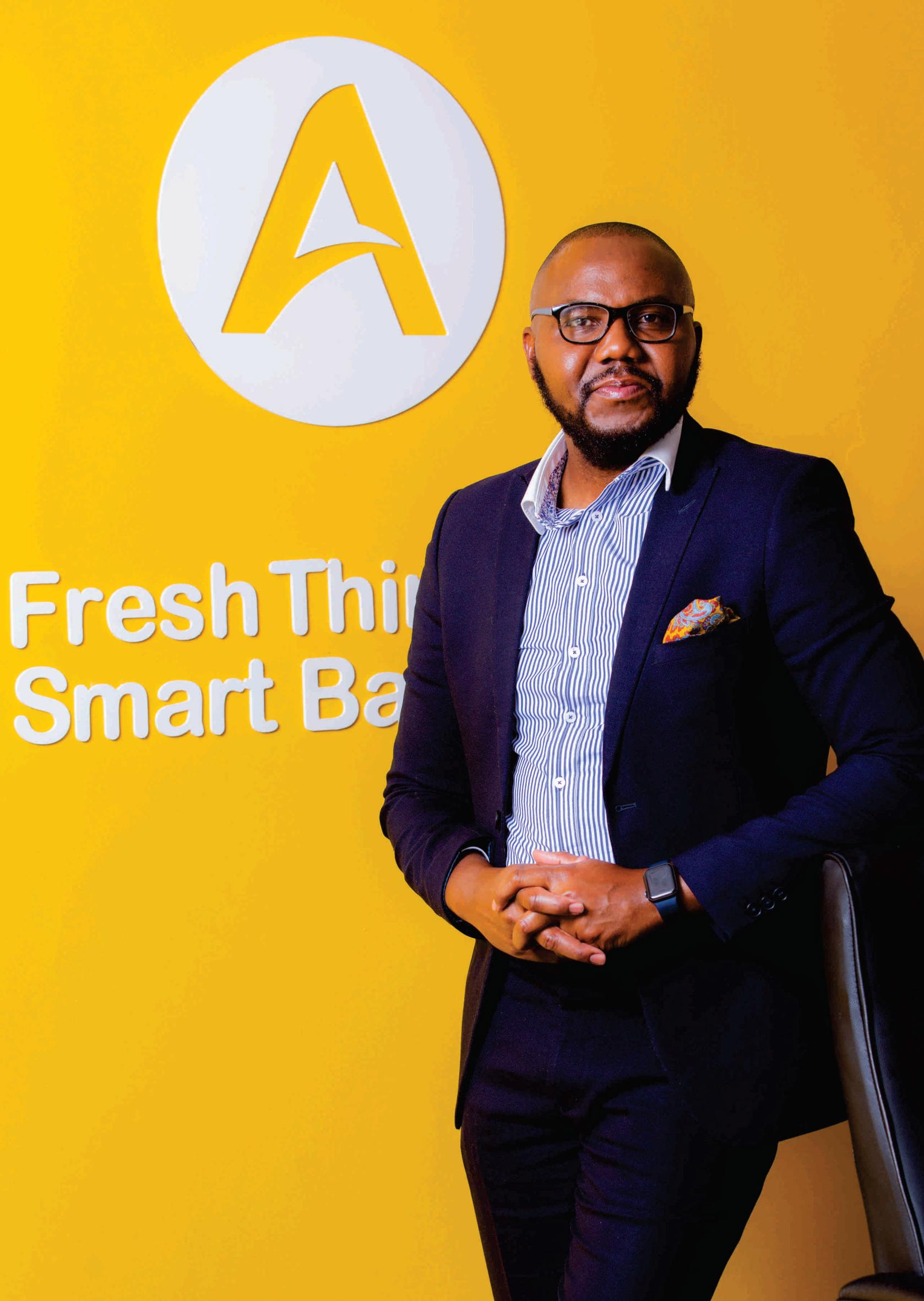
THE
23 P A G E
BancABC's rich history of supporting Zimbabwe's productive sector and traditionally strong Corporate Banking services, has positioned the Bank as a leader in financial services in the country and the continent. The CEO's towering status as one of the continent's finest bankers, having led about 5 Banks as CEO, has also added to the Bank's growth prospects in the continent. In this exclusive interview with African Leadership Magazine, Dr Lance Mambondiani, CEO, BancABC, tells us about the Bank's efforts towards redefining banking in Zimambwe and beyond. He also shares his experience as a veteran banker, as he discusses the ABC of Banking, Excerpts:
You have held the position of CEO in about five institutions. You have done exceptionally well in these roles; I read somewhere you were quoted saying you have never applied to be CEO; you have mostly been invited. What have you done and continue to do that has kept you at the top of the financial sector chain?
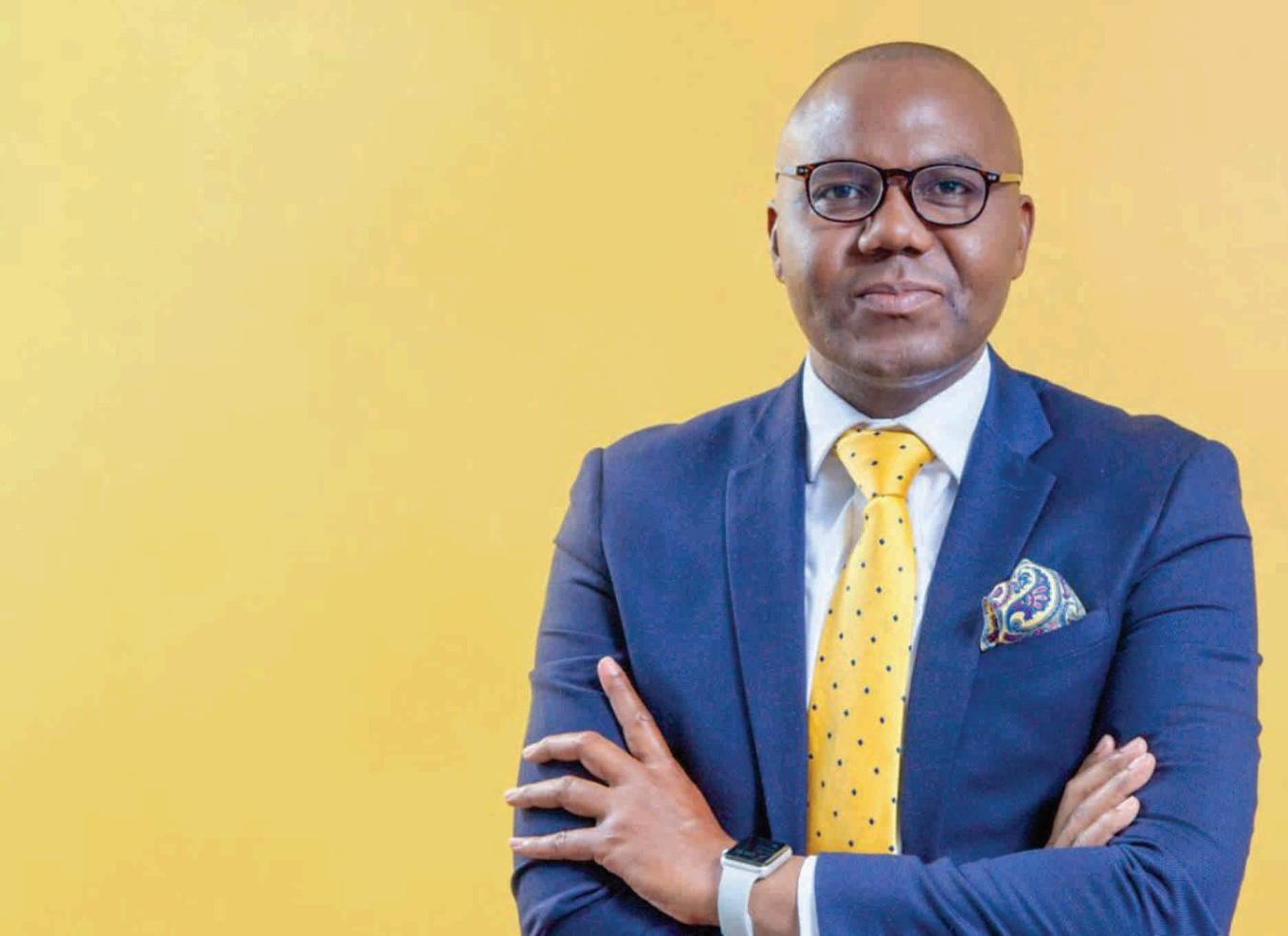
Firstly, let me start by expressing my gratitude to everyone at African Leadership magazine for choosing to have me on this platform, it`s truly a humbling experience. To your questions, I will admit that to be called into any position of leadership is an incredible honor and privilege which I do not take lightly. I have often described myself as “The accidental CEO”. My main desire is to serve and make a difference in the small ways I can, in whatever assignment I am gifted to lead, and anyone can do that without a title.
I am not afraid to take bold risks and also make mistakes, because I believe that is the only way you can succeed at producing groundbreaking initiatives!
My formula, if you will call it that, has always been to bring the most authentic version of myself. It allows me to connect with the people and that's why I continue to tell my story as it is. I am not any smarter than my peers but extremely driven and equally enjoy being a part of a driven team. I am not afraid to take bold risks and also make mistakes, because I believe that is the only way you can succeed at producing groundbreaking initiatives! I am committed to change, and I am committed to legacy building as a core principle of any leadership position. It has been proven that Entrepreneurship is what stimulates development in any nation or state; what are you doing as a financial institution to promote Entrepreneurship among the Zimbabweans, especially women and youths?
24 P A G E
Entrepreneurship is definitely at the heart of stimulating development, and this is essentially true for any African economy. In Zimbabwe, as in most countries, SMEs are the biggest employers, playing a critical role in spurring economic activity and sustaining value chains. BancABC has been quite involved in supporting SMEs through their growth phases. Our popular iGnite SME initiative provides lending, training, and access to markets for small businesses. One of my favourites is our flagship Annual SME summit where we bring together SMEs and young entrepreneurs from across Africa, to share their stories and debate common challenges faced by small businesses and how they can overcome these challenges. We often conclude the Summit with a pitching competition where startups can win funding from various investors. We have started making preparations for the 3rd edition of the SME Summit later on this year and I`m looking forward to engaging with entrepreneurs from all over Africa.
Financial inclusion is one area we must mention when we discuss banking in Africa. Going by the number of unbanked people in the continent, do you think it is getting
the attention it deserves from financial institutions, and what are you doing to address the situation not just as a bank but as a CEO?
There has been a lot of progress made in addressing financial inclusion in Africa largely because of the fintech revolution and the significant penetration of mobile phones across the continent. Well known examples are of course M -Pesa in Kenya and Ecocash in Zimbabwe which are mobile wallet services, that allow previously unbanked people to access financial services using the USSD Mobile Platforms for transactional purposes. While much of this has been through necessity, the convergence of financial services and the mobile phone has been hugely significant in addressing financial inclusion.
Financial inclusion is at the core of our mandate as BancABC and also my personal approach to banking. I firmly believe that banking should be accessible to everyone, and this has been my mission in the banks I have been privileged to lead. At BancABC, our low cost KYC lite account product offering is accessible to all Zimbabweans. We also have one of the biggest footprints in the country through our Instore banking
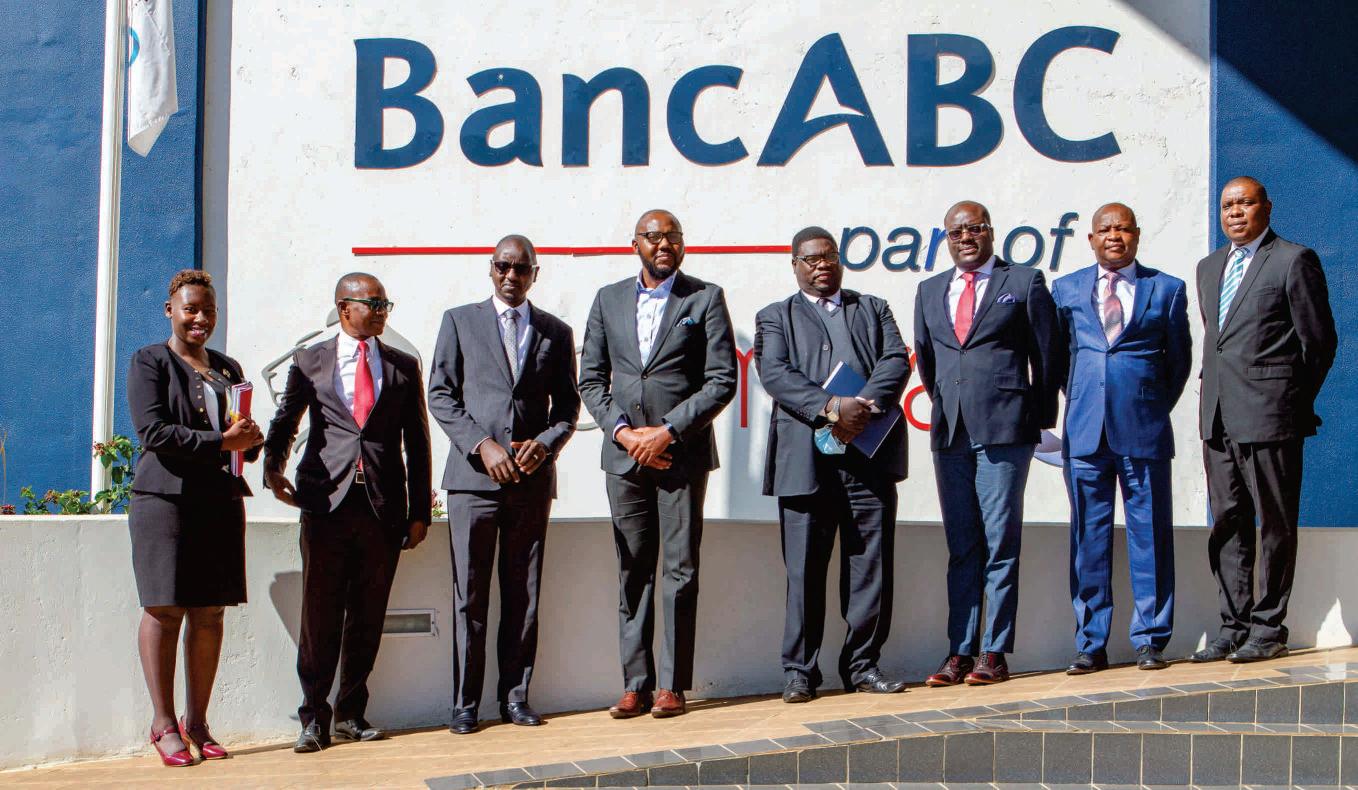
partnership with Pick n Pay where we provide limited banking services in 52 kiosks in almost all major cities and towns.
Because of the Covid-19 disruptions, you recently asserted that "Banking will never be the same again; more and more, we are going to see banking being moved onto platforms that were inconceivable a couple of years ago – platforms that are accessible in real-time, anytime, anyplace". What innovations have you introduced to accelerate this transformation in your bank?
Despite the intolerable human suffering, the pandemic was also a catalyst for digital adoption and transformation for all industries and Banking is no different. During the first lockdown, we saw an opportunity to introduce our hugely popular virtual branch – Branch X, which allows our customers to transact virtually without ever visiting the branch. We also launched a WhatsApp Banking Service we call Ally, which allows our customers to enjoy all our banking services on the popular social media platform. Looking ahead, we are aware that our clients are adapted to doing banking anywhere but never at a Bank. Our agenda is to accelerate our digital
25 P A G E
transformation agenda to meet this new expectation.
From what we know about you, I think it is safe to say you are an IT-driven banker. However, implementing IT policies is not always a smooth ride as many people think. What strategy have you adopted over time to achieve successful implementation and operation of IT?
I am passionate about the digital transformation of the financial sector. The traditional banking model is antiquated and does not address the mutating demands of a new type of tech-savvy clientele. To survive in the new environment, Banks have to provide service that is frictionless for the customer in real time, anytime anywhere. Innovation and tech platforms can aid this process and make Banking simpler, more adaptive and relevant to modern demands. We live in a fast-changing social media, generation, the bank of the present and the future has to be as intelligent as Google, as Easy to use as Apple and as engaging as WhatsApp.
In Zimbabwe, 80–90% of transactions are conducted by informal traders or small- and medium-sized enterprises (SMEs); what services and products do BancABC currently employ to cater for these categories of people?
We certainly have the SME clientele at heart, and we have created an SME account (The Ignite Account) that is tailored to cater for the numerous needs of this important segment. We have a dedicated business banking unit for our SME clients, to ensure once the account is opened the SMEs are provided with all the necessary support they need to succeed. We like being a part of our clients' growth stories.
Any partnerships or plans to increase BancABC accessibility across Africa?
BancABC as a group has a rich history as a true Pan-African Bank. Whilst the Group is currently scaling back and in the middle of divesture transactions which are a matter of public record, we have had operations in Botswana, Mozambique, Rwanda, Zambia, Tanzania and of course in Zimbabwe. We have always been an African Bank and proud to have done banking in many African communities.

We also have ambitious plans to extend our product range across the continent where possible. Following the huge success of our local remittance service, “City Hopper”, in December 2021 we launched a cross border remittance service which we have called “Border Hopper”.
In partnership with Mama Money and TM Pick n Pay we are processing cross-border remittances between Zimbabwe and South Africa. Any of our clients in SA can walk into a Mama Money agent (including in PnP stores) and send money to
Zimbabwe for collection in any one of our 41 kiosks in TM Pick n Pay stores across the country. Our aim is to offer banking services to everybody who needs it. We speak African, we understand Africa and we have become a part of many stories across the continent.
In the post-COVID-19 era, with the emergence and growth of FinTech and the digitalization of banks, what would be the concerns or challenges of the banking industry?
Cybersecurity risk is a serious threat of an accelerated digital transformation drive. The goal is to identify risks and assess whether the rewards outweigh these risks. If we can find ways to mitigate risks we then move at break-neck speed to design, execute and launch to market. Nonetheless, change is the only constant.
One of the biggest threats to banks is the accelerated growth of fintench players that are more agile and can offer some services that are traditionally offered by banks such as lending, savings and payment options without the need for a banking license. To survive in this fast-changing environment banks will need to partner with fintech players for agility rather than attempt to compete.
As an individual, you have constantly maintained that you want to make bigger contributions to the country and with your track records; you have contributed amazingly to society. What
26 P A G E
do you plan to do differently from what you have done in the past and currently?
I would like to be a part of a generation that stands for something and would like to leave the business or my country better than I found it. We owe it to our children and our children's children to do better than those who precede us, generating value not only for ourselves but also for those we are privileged to lead and serve. I strongly believe that losing yourself in the service of others is the only way we can overcome and build a better tomorrow
For us to play our role effectively as financial service providers, we need to be an institution that is always looking to be part of projects that are nation building, that contribute to the country`s economic growth. In whatever assignments or transactions we do, we need to be relevant.

You must have faced a lot of battles to get to where you are right now. Which experience is your most memorable, and would you say made you stronger?
Challenges create an opportunity for success, and I have had many, too numerous to mention. I have fallen many times, been fired a couple of times. Every decision we made in the past inevitably shapes our future and I am happy to have learnt from my past. I don't always get it right, but I am conscious of the fact that when in a position of leadership, we are sometimes living our lives as an example for others. I live by the old adage that 'life itself is a battle, its either you are in one, going into one, or coming out of one'.
Your slogan is "you can outsmart me but never outwork me" What will you say to the young people who look up to you and still do not understand this slogan?
You don't always have to be the smartest person in the room, but you must show up everyday and put that extra effort if you are to succeed. I believe strongly in good old-fashioned hard work, passion and pouring one's heart and soul into every assignment! True success often happens to those individuals willing to pay a price to achieve it.
Success is embracing failure as an option and learning from it. You have to be bold, courageous and take calculated risks if you are to achieve your goals. Lastly, the burden of leadership is to give each other Hope, inspiring each other to do better and acknowledging that someone doesn't have to fail for you to succeed. We can all succeed together
'Do good by you and when done, Please Do good by others.'.
I believe strongly in good old-fashioned hard work, passion and pouring one's heart and soul into every assignment! True success often happens to those individuals willing to pay a price to achieve it.
27 P A G E
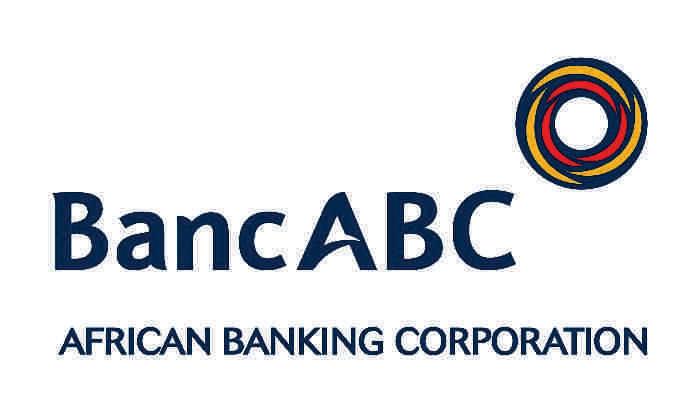



28 P A G E
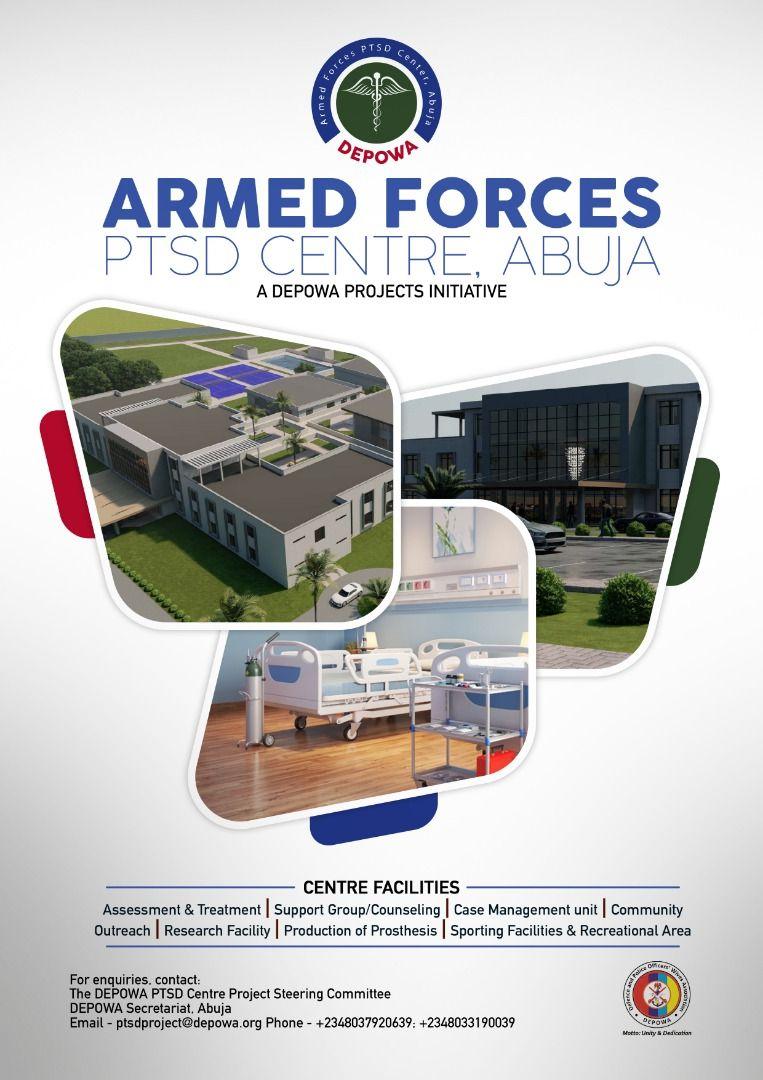 P A G E
Mrs. Victoria Irabor & Depowa
P A G E
Mrs. Victoria Irabor & Depowa

Uplifting the Wives of Fallen Heroes' By Extending a Helping Hand
Barrister (Mrs.) Victoria Irabor, President, Defence, and Police Officers' Wives Association (DEPOWA), a vast and well-read professional in the fields of law, conflict, security, development as well as corporate management and finance law has decided to use her indepth knowledge and experience to take on the challenge of changing the narrative of the lives of widows in Nigeria, with special focus to the wives of fallen heroes in Nigeria. In her role as the DEPOWA president, she has not only led by example but has gone further to make sure that the military widows of the nation benefit and succeed.
She believes in fulfilling the African dream by harnessing the power of the skilled woman and has gone over and beyond to see to the social inclusion of these women via relevant skill acquisition. The wives of our fallen heroes are heroes in themselves and we must recognize them. They must be equipped to re-join society. Irabor has come in with a fresh pair of eyes for innovation and expansion with projects that goes beyond helping the widows of fallen heroes of Nigeria to helping the heroes themselves.
Women have always played an essential role in the development and growth of any society and Barrister (Mrs.) Victoria Irabor through the office of the president of DEPOWA has made it her mission to make sure that Nigerian widows lead better lives through skill acquisition projects, social inclusion, and establishment of PTSD Rehabilitation centres for their husbands. She has shown tenacity, resilience, compassion, and a strong drive for excellence in the course of her service to Nigeria.
A team of editors caught up with her recently where she talked about her passion and motivation in helping widows.
AFRICANLMAGAZINEwEADERSHIP ww africanleadershipmagazine co uk
30
We would be thrilled to know a little more about the woman behind such great works.
I am Mrs. Victoria Irabor, fondly called Vicky by my friends and family I am married to Major General Lucky Eluonye Onyenuchea Irabor. We believe in the grace of God and Jesus Christ, our Saviour. I am who I am today because God has made me so. My marriage is blessed with two beautiful children, a son and daughter
My parents were civil servants. My father was a teacher and principal of schools and my mother was a nurse, so they were exposed to education.
This afforded me the opportunity to start school. I was exposed to a good education because my parents were educated. Today I am a lawyer and married to a military officer. I would relate who I am to date to the experiences I had as a child. With benefit of hindsight, I recall that as a child, my mother would look at me and she would praise me. She would say, “you see you're so tall. I can imagine you reading law. “When you stand in court to speak, your presence will intimidate the judge”. With this nudge from her, fell in love with the profession after I researched. Later I came back to my mom and told her that I wanted to be a lawyer but I wanted to work with the police so that I'll be able to fight crime and investigate crime. At the end of the day, I could not join the police but I married the military officer. So I think that my dream did come true, only in a different way than.
I graduated from the University of Benin where I obtained an LLB. I also proceeded to the Nigeria law school where I obtained my BL and was called to the Nigerian bar. After that I acquired three masters, first from the legal state university, where I obtained a masters in corporate management and finance law, then a Masters of law from the Lawton University Bangladesh, and finally a Masters in conflict, security, and development from the Nigerian defence academia. I actually did my Masters in conflict, security, and development to support my husband
in his job as a military officer
You have a vision for DEPOWA as it were. Where did you meet it and where do you intend to leave?
When I met DEPOWA it was a very comfortable place to start off work The past DEPOWA Presidents have done wonderfully well. DEPOWA as an association is the coordinating body for the army officers' wives' association, Naval officers' wives' association, air force officers' wives' association and the police officer's wives' association.
As the president my position allows me to relate with women across the services. My vision for the association is broken down into parts. We have our traditional objective which is coming together as women and relating with one another Sharing the same challenges with someone is usually reassuring. Another one of our traditional goals is to not leave the widow isolated. I have a goal to go beyond just support, I want to give skills to those that do not have and then also sharpen their skills by organizing pieces of training. I intend to go beyond the traditional objectives and goals.
I have found a project that I think would launch DEPOWA to greater heights and that is looking beyond ourselves, not just what we can offer to the officer's wives but to see what we can do for our husbands, because our husbands today have a huge problem that is plaguing them and that is the issue of Post-Traumatic Stress Disorder, PTSD
For the past decade, Nigeria has gone through conflict and when the men come back home, they return with so many issues. At the end of the day, the women and children in their lives are the first to receive the impact of these negative outcomes. Women watch their husbands go to the conflict zone and change.
Some of these women have complained that their husbands cry at night, they scream in their dreams and some become very violent and take it out on the wives and children. As a soldier or officer, you cannot go
to the war zone, return and go straight back to your family. But in Nigeria, we do not have the system where these men are evaluated and if the problem of PTSD becomes existent in their lives, they don't have a chance to be rehabilitated. We need that type of centre and that is why I am proposing that DEPOWA works towards establishing a rehab PTSD evaluation and rehabilitation centre for the armed forces. That is my big project and goal. I believe one of the effective ways to help women is to give them a peaceful and safe home, to do this we must make sure that their husbands are sane and without any form of post-war trauma.
In some of your works you have partnered with migration and refugee organizations, how did that assist and benefit your goals?
Yes, I partnered with them but right now we're trying to reach out to the downtrodden in the society. The widows, the sick in the hospital, especially victims of conflict we are paying specific attention to the northwest zone because of the grave levels of insurgency. This is the Zero Hunger Project.
Hunger is not just about food. Anything that makes you deprived is hunger and if we say zero, the kind of hunger we are talking about is ending hunger for food, shelter, love, and health. We want to reduce any problem that is plaguing the society We are prepared to meet these needs no matter how little thus the name of the program; Zero hunger. I am sure when people see that they expect food but we go beyond that, they will appreciate it. Last month we were at 44 hospitals where we donated 13 motorized wheelchairs and some assistance for the patients.
Looking at DEPOWA and your skill acquisition programs that you organize, a lot of people have come to question how you organize and departmentalize it. How do you decide which skills gap you want to breach?
For DEPOWA our skills acquisition and target audience are different from other skills acquisition done by
INTERVIEW AFRICANLMAGAZINEwEADERSHIP ww africanleadershipmagazine co uk
31 P A G E
other organizations in the sense that we focus primarily on widows, the orphans, and the less privileged in our military community. As I mentioned earlier, Nigeria has gone through a lot of insecurity and insurgency in the last decade, hence more men of the force have been deployed to protect our country. This would mean that the number of widows in the military community has increased. We have so many of them in the barracks and there's no way DEPOWA can turn a blind eye to what is the current reality.
That's the reason why we have taken this very seriously It is not enough to just pay their debt, and the debt benefits of their husbands as saved out of the barracks. Where do we go from there? So, we ask these women if they have any skills and quite a number of them do not. We then concentrate on exposing these women to skills that can improve their standards of living by giving them a stream of income. These skills could range from catering, tailoring, ICT, bead making, and so on. And we don't just stop at the training when they graduate, we set them up with start-up capital. We buy the tools and equipment's they would need to start and pay their rent for one year Then we monitor them for some time. When they are established, we can let them stand on their own. This scheme nurtures these women from beginner levels up until they are grounded in their craft and can sustain a cashflow system independently
To keep track we have a database of the women whose husbands are deceased under our scheme. Every time a soldier dies in the war zone, we update our data. We follow up on the women to know the ones that would require our support. What we are doing is limited to the military community and we do it with passion not just because we want to go into skills acquisition, but because our community needs this. We are cantered on remembering the wives of our heroes, the men who put their lives on the line for our great country
COVID-19 disrupted a lot of livelihoods, disrupting businesses and many people lost jobs just like most organizations. DEPOWA also has some kind of intervention relief for this set of people. Could you tell us more about what DEPOWA is doing regarding this?
Yeah. From time to time, we gather the widows in the military community and we give them relief materials. It is something we do on a regular basis, and we're still prepared to do this in the coming years. We also incorporate an inclusive approach when planning our programs for these widows. For example, we had a general meeting two months ago and we found opportunity to gather the widows again, we do this to stay in touch and make these women have a sense of belonging.
Every day as we eat, as we dress up and put on makeup, we must recognize that we have these women amongst us for the sake of love for the nation, their husbands died. We must never forget them. They are part and parcel of DEPOWA and will always be remembered. If we don't remember them or reach out to them who will? society does not know them. We cannot abandon them!
Losing a loved one is difficult, but losing a loved one who fought to protect the nation is difficult yet prestigious and that is why we must regard these women.
For a big organization like DEPOWA one of the major challenges a leader can face is finding a work-life balance. A lot of people look up to you and most of them are also professionals. How are you able to maintain that delicate balance between work, family, as well as also ensure that you stay on top of your project and programs at DEPOWA.
To start with I would like you to know that I still have my professional career outside DEPOWA. I have the choice to take a leave of absence to focus on DEPOWA but I deliberately decided to continue and when my MD called me and asked if I was sure I said, why not! The reason is I intend to teach the women not by saying it, but by example. As a woman, you must be gainfully employed not just provide civil service but you must be actively engaged in a business or career that earns you a living. You can't be married to an officer and be idle.
In fact, in the current age and time we live in, idleness is not an option. Women from advanced countries work 23 jobs, I don't see a reason why I shouldn't be able to hold down my various responsibilities provided I manage my time and resources effectively. If you are not working in an office, you should work from home or have your business and that is the only way you can earn your respect and be useful to the society
We must decide to be useful to our husbands, children, and ourselves. Our husbands need a lot of support from us. The idle brain is the devil's workshop. We don't want women to be a liability. We want them to be useful, useful to their families and the society. How am I able to manage? I have always worked long before I married my husband so it comes naturally to me. I have worked long enough both as a single woman and as a married woman.
Over the years I've learned how to juggle and combine both family and work-life to coexist. It became natural to play this role as the DEPOWA president and work in my office. My office is in Kaduna but they've allowed me to work from home. So sometimes I'm here with my laptop. And if I don't have time to work in the daytime, at night I sit up to work here when they need me.
My close team members all work elsewhere and I encourage it. No woman around me is idle. To thrive in the Nigeria of today you must bring something to the table. I don't want a DEPOWA where we are gathering to clap hands. You need to be versatile. You need to be current. You need to know the issues in your community, our community, the military community. If you don't know what the issues are, you would not be able to deliver anything. Every woman has got a brain, so every woman here is thinking and that is what I want to see in DEPOWA.
INTERVIEW AFRICANLMAGAZINEwEADERSHIP ww africanleadershipmagazine co uk
32 P A G E
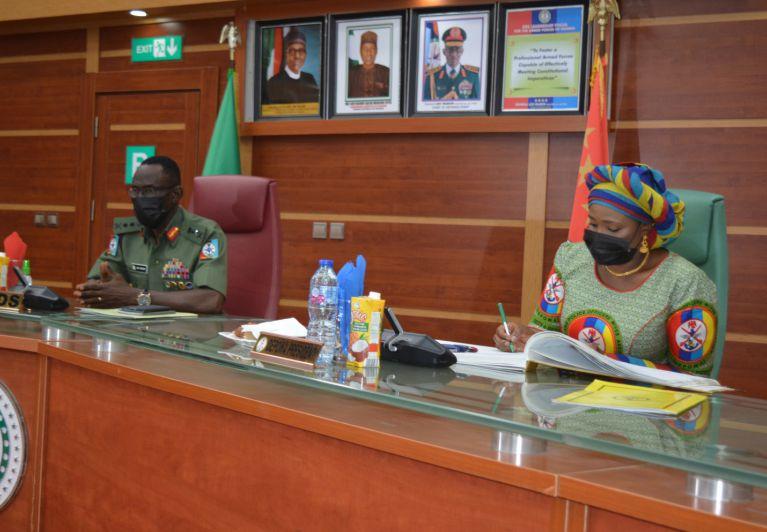
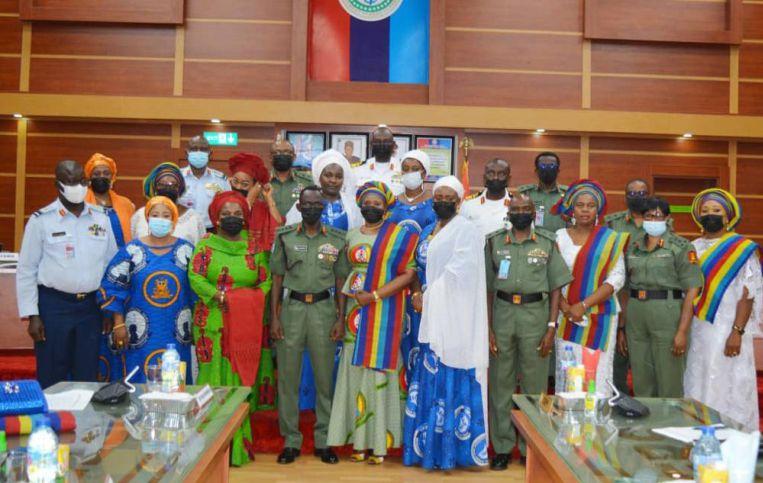

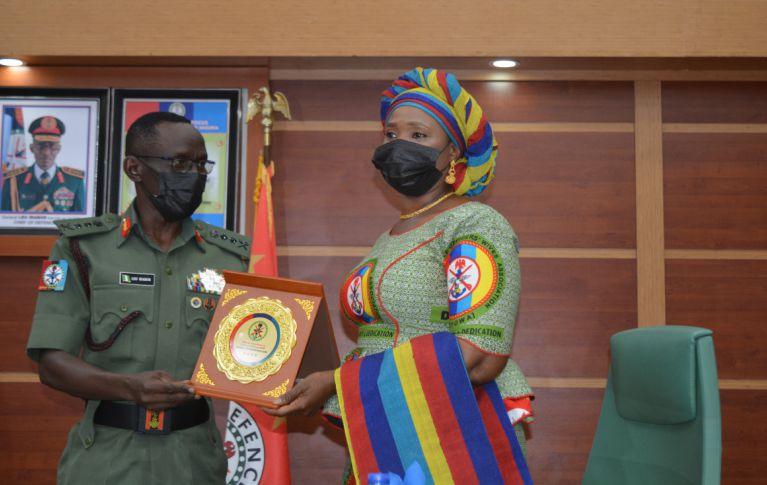






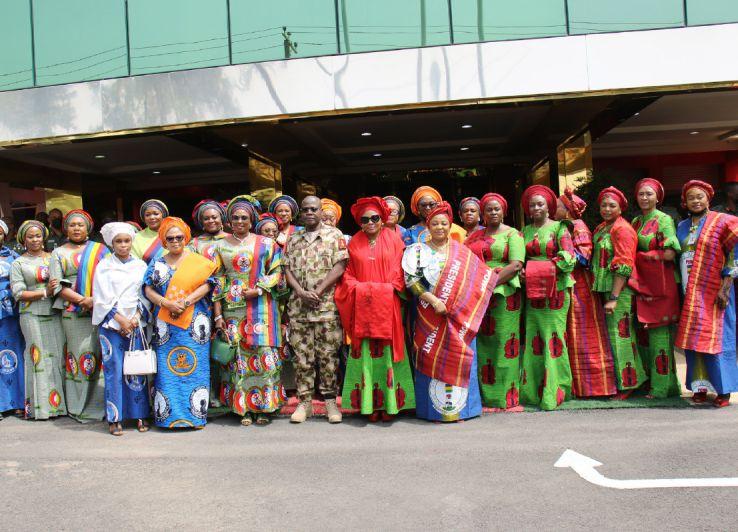
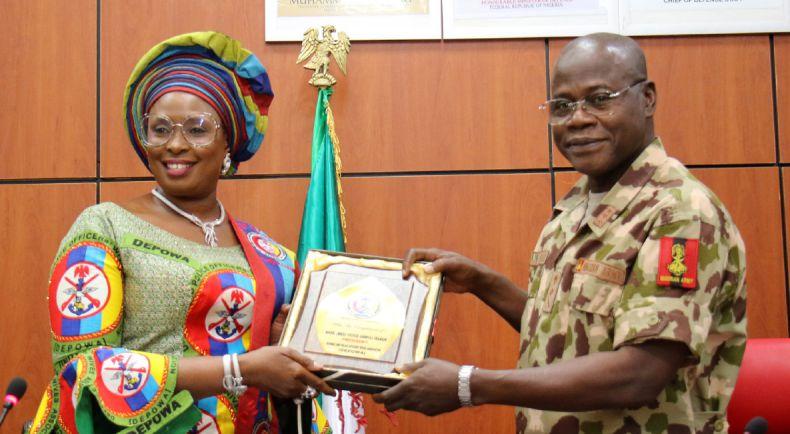
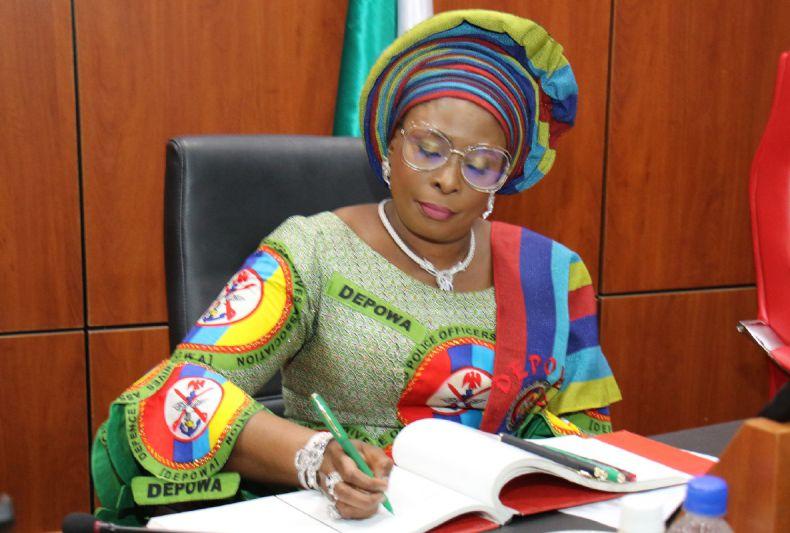
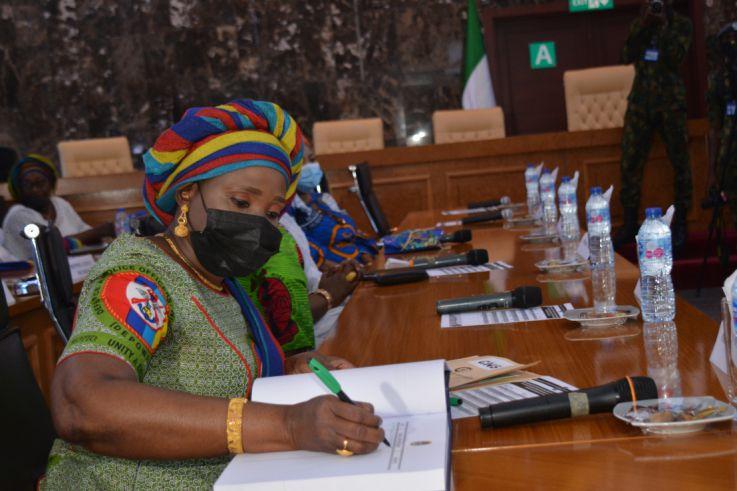

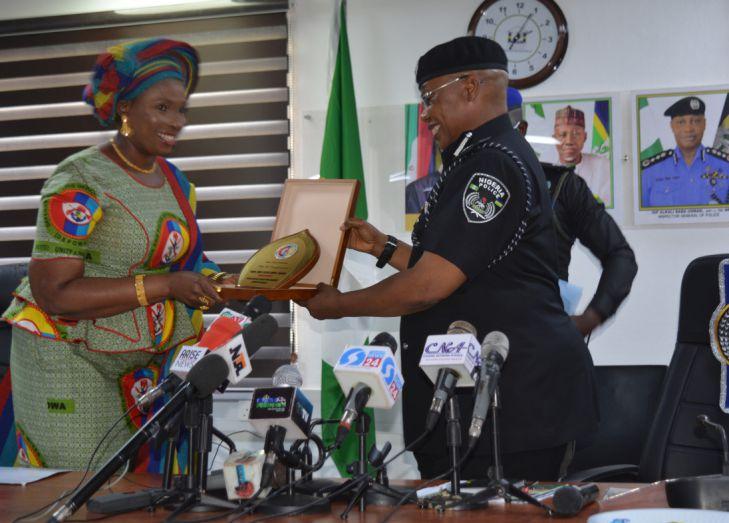








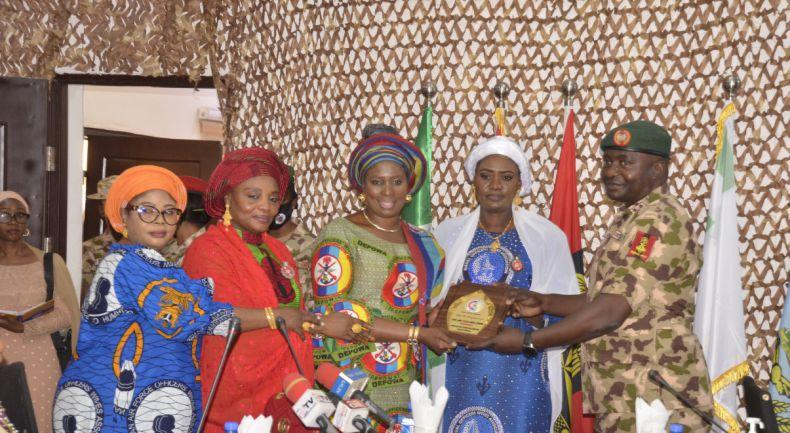
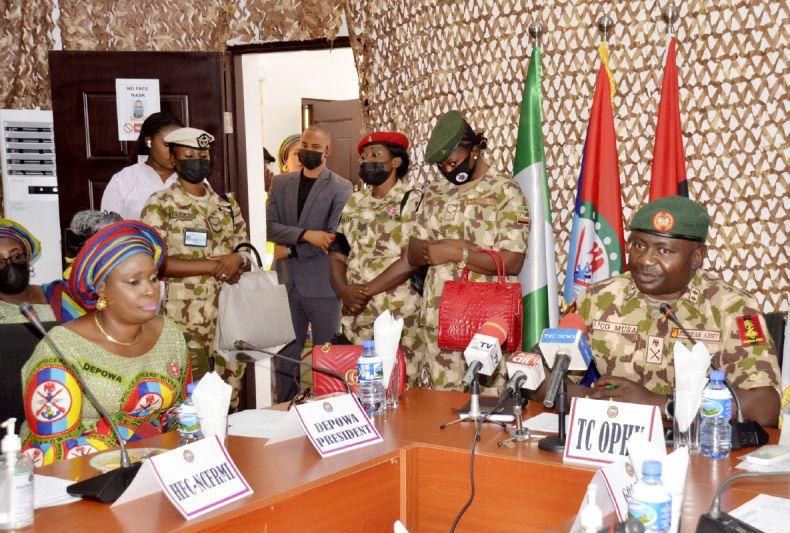
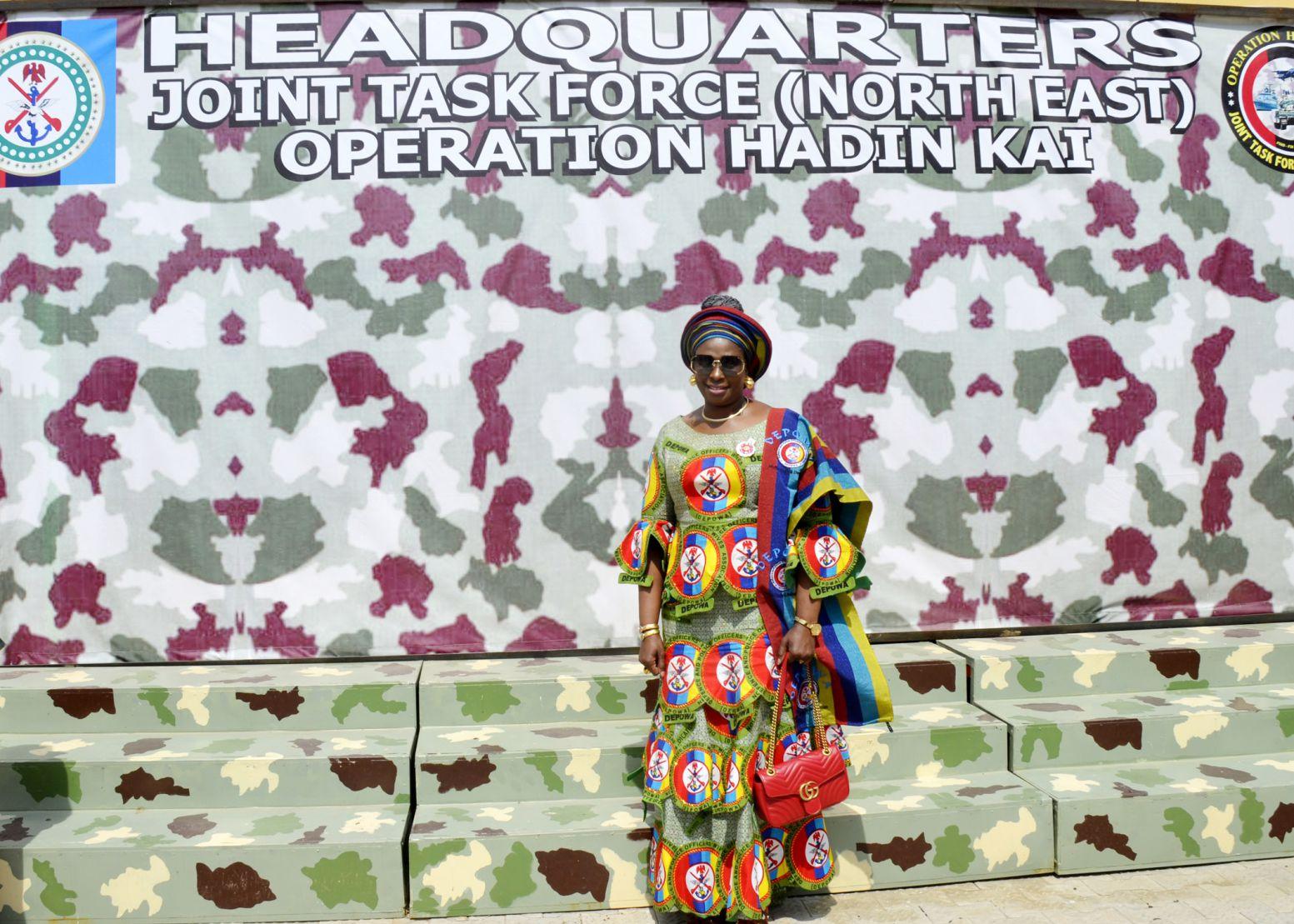

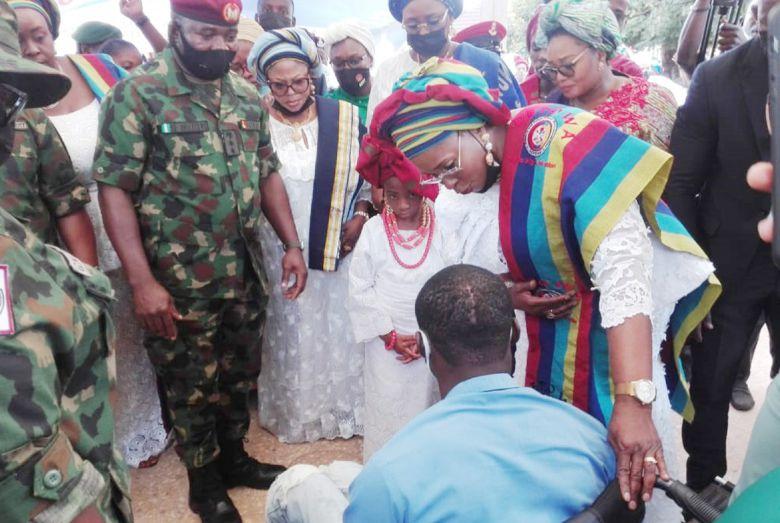
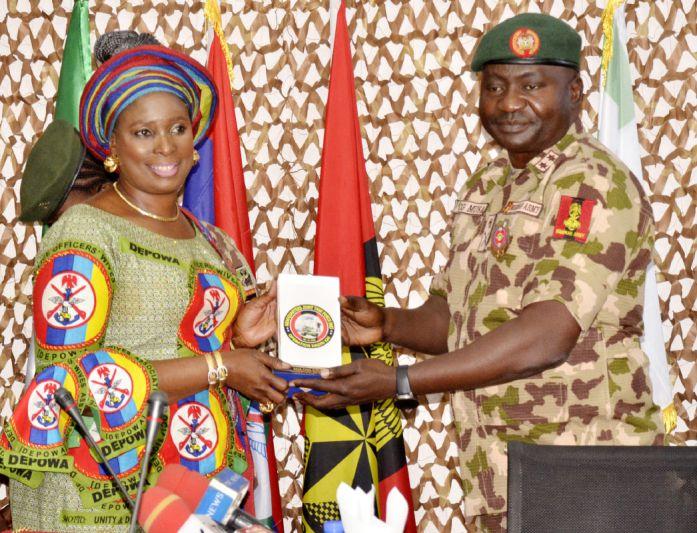
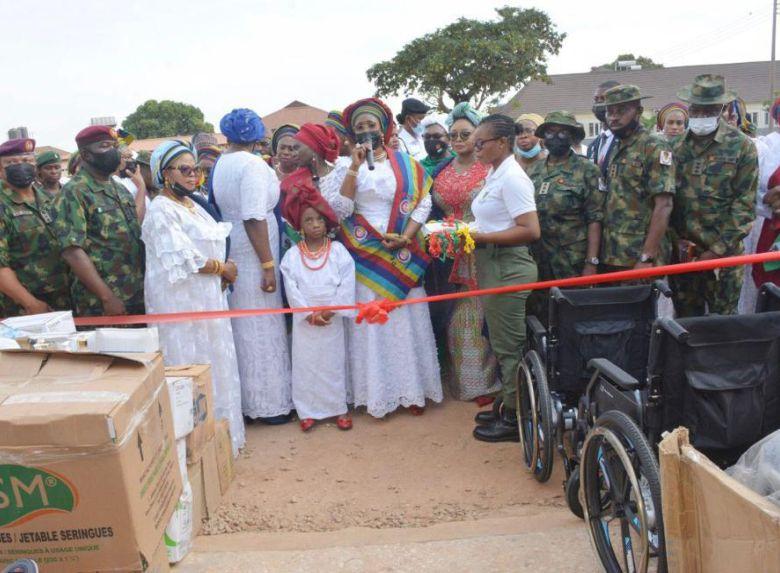
 Mr José de Lima Massano Governor of Bank of Angola
Mr José de Lima Massano Governor of Bank of Angola
From stabilizing the nation's currency, to keeping unemployment at bay, Central Banks across the world are perfecting the art of staying the course amidst global economic crunch.
The Angolan Central Bank have particularly become adept in managing the country's monetary policy and making the currency surge ahead of the rest.
In this exclusive interview with José de Lima Massano, Governor of the National Bank of Angola, we discussed the performance of the Angolan economy and other issues. Excerpts;
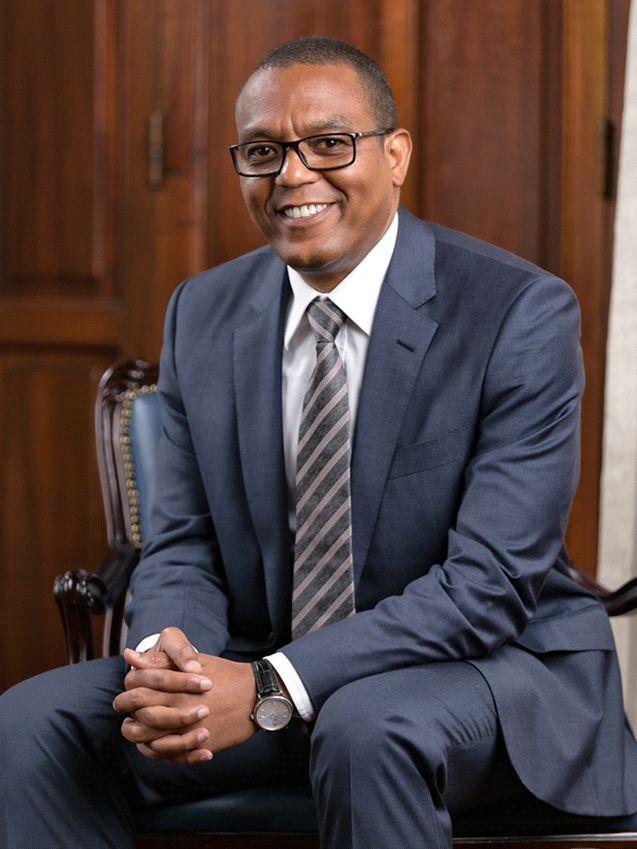
Staying The Course Amidst Troubled Economy
AFRICANLMAGAZINEwEADERSHIP ww africanleadershipmagazine co uk
38 P A G E
You have had an impressive career Please tell us briefly about your professional background and how that has supported you in your current role?
I have spent most of my working life in the financial sector, having completed a Master's degree at the City University in London.
I was on the board of directors of the state-owned commercial bank for 6 years, and thereafter was the CEO of the largest private commercial bank in Angola for another 6 years, with a break in between of 4.5 years during which time I served as the Governor of the Central Bank. This experience gave me an in-depth knowledge of the workings of the financial sector and of the economy, and was invaluable for my current role.
At a Conference in Carcavelos, you stated that the main objective of the institution's monetary policy is to ensure that inflation falls to single digits by 2024, adding that you are migrating to an inflation targeting regime. Please, can you talk more about this strategy, and what policies you plan to introduce bearing in mind the rising cases of inflation globally?
At the end of 2017, we transitioned from an exchange rate objective in controlling inflation to a monetary objective, with money aggregates being the operational variable of the monetary policy, whilst at the same time preparing the ground for the implementation of a free-floating exchange rate regime, which was achieved in October of 2019. This policy has served us well up to now, however, our objective for the future is to progress to an inflation targeting regime that will see the Central Bank establishing a numerical target for medium term inflation, which will be publicly disclosed.
In the meantime, from an organizational point of view, the reforms we have implemented, which, amongst others, include formalizing the independence of the Central Bank and strengthening its accountability, as well as establishing price stability as its primary objective, have
contributed towards creating the internal conditions for the implementation of the inflation targeting regime.
As for the rising cases of inflation globally, we are obviously monitoring those movements, taking note of the strong measures being applied by Central Banks worldwide to bring inflation back to their target levels. In our monetary policy decisions, whilst we define our policy in line with our particular circumstances, we also consider the inflation levels of our trading partners and the extent to which they may impact on our internal inflation.
Angola's national currency, the kwanza, has seen an appreciation in recent months and is now worth around 430 kwanzas per dollar, appreciating about 30% against the dollar. What would you say is responsible for this achievement?
Angola depends on oil sales for its foreign currency, and therefore the significant drop in the oil price which started around mid-2014 significantly reduced the availability of foreign currency. The reluctance at the time in devaluing the domestic currency due to the country's dependance on imports, exacerbated the shortage of foreign currency and led to a significant overvaluation of the domestic currency. This resulted in the complete malfunction of the foreign exchange market.
At the end of 2017 we established a new foreign exchange policy focusing on normalizing the functioning of the foreign exchange market through the elimination of administrative controls and the implementation of a free-floating foreign exchange regime. Initially we had a regime of “managed depreciation” and in October 2019 we transitioned to a free-floating exchange rate regime.
As expected, immediately after freely floating the currency, there was an overshooting of the exchange rate as the banks adjusted to this new regime. In addition, shortly thereafter, we were confronted with the Covid 19 pandemic, and a crash of the oil price,
linked to uncertainty on all levels, which caused some disturbance in the functioning of the foreign exchange market. However, as the Covid 19 was brough under control, the functioning of the foreign exchange market started returning to normal, and we saw the exchange rate move back to more sustainable levels, which explains the appreciation in the first half of the year.
From your perspective as the Governor of the National Bank, how do you rate the performance of the Angola economy?
The quarterly national accounts released by National Statistics Institute indicate a quarterly growth of real GDP of around 1.60% (+1.1pp) in the fourth quarter of 2021, resulting in a growth of 2.2% (+1.30pp) year on year, which determined a slight annual expansion in 2021 of 0.7%, after 5 consecutive years of economic recession. The favorable evolution of the GDP is in line with the positive sentiment of business people about the economy
Of course, there is still a lot of work to be done, but we are on the right path.
Are there any plans to regulate financial technology (fintech) firms in the same way as banks are regulated in Angola?
The provision of financial services in Angola, including payment services, is regulated by the Central Bank. We have specific payment systems regulations which cover all payment service providers, whether they be banks or not. Fintech firms that are payment service providers are therefore regulated by the Central Bank according to the nature of their business model.
One issue that is attracting a lot of interest currently around the world is crypto currencies. While some countries are adopting crypto, some are also banning them. What is the banks position in relation to crypto adoption?
Only two countries have so far adopted crypto currencies as official legal tender, making their acceptance
INTERVIEW AFRICANLMAGAZINEwEADERSHIP ww africanleadershipmagazine co uk
39 P A G E
mandatory. We have no plans whatsoever to do this. We are closely following international developments on the use of crypto “currencies”, including the discussions within the Central Bank space with respect to regulation and supervision, and will take a view in due time as to the course of action to follow in respect of these “currencies”
In what ways has the National Bank worked to ensure the safety of consumers and the financial system, while facilitating innovation and competition?
In terms of the safety of the financial system, the Central Bank has adopted the European model of regulation and supervision of financial institutions in order to ensure a robust financial sector, aligned with international best practices, prepared for the future.
The safety of the consumers of financial services is inevitably linked to the stability of the financial sector. We have also implemented specific regulation ensuring the conduct of banks towards their clients is appropriate and protects the clients' interests at all times. In addition, we have instituted a Deposit Guarantee Fund which guarantees bank deposits under a certain amount and which covers a large percentage of the depositors.
On the innovation front, the Central Bank has partnered with specialized entities to create the first fintech regulatory sandbox in Angola, with the objectives of increasing financial inclusion through technology and job creation.

The project was aimed at allowing fintech start-ups to test their products and services in a real market environment, whilst providing guidance on regulation and acquisition of licences, as well as in the definition of the market strategy and the matching up with potential investors.
The Central Bank has also modernized the payments system regulation to widen the range of authorized service providers in line with technological developments in the payments space. You introduced new reforms, and responded to the pandemic with policy and regulatory reliefs for the banking and SDI sectors, what is the broad
vision of the Central Bank of Angola for the industry?
As mentioned previously, we have introduced numerous reforms in the financial services sector and foreign exchange market in order to align these to the best international practices.
The reforms support our vision for the banking sector, which is to have a strong sector fulfilling its primary role of providing a safe haven for the funds of the public and a means to allocate those funds to servicing the economy, through loans, in particular, to the productive sectors. We understand that a robust banking sector is essential to economic growth and development, creating opportunities, providing jobs and facilitating commerce.
You have just been nominated to be conferred with the African Public Service Leadership Excellence Award by the African Leadership Magazine for displaying innovative leadership. How do you feel about this honour?
I would like to thank the African Leadership Magazine for the award. Together with my team at the Central Bank, we work every day to achieve our objective of ensuring price stability and the solidity of the financial system, with a view to adding value to our society. It is, of course, gratifying when this effort is recognized by an international organization such as the African Leadership Magazine.
On the innovation front, the Central Bank has partnered with specialized entities to create the first fintech regulatory sandbox in Angola, with the objectives of increasing financial inclusion through technology and job creation.
INTERVIEW AFRICANLMAGAZINEwEADERSHIP ww africanleadershipmagazine co uk
40 P A G E
The Nana Addo Dankwa Akuffo Addo-led administration in Ghana has continued to attract global attention for the government's commitment towards improving the lives of its citizens. One of the key policies of government that has attracted local and international commendation is the Free SHS Program. However the policy would have collapsed without the Free School Feeding program, which is anchored by the National Food Buffer Stock Company. In this exclusive interview with the African Leadership Magazine UK, the Chief Executive Officer, MR. HANAN ABDUL-WAHAB, tells us about the company's efforts towards sustaining this important government policy and feeding millions of students daily, among other important issues. Excerpts:
Since your first appointment as the CEO of the National Food and Buffer Stock Company in March, 2017, you have been credited with several gains that have transformed the company. What would you say are some of your proudest achievements in office and how you were able to achieve them?
Well, as you rightly pointed out, I was privileged to have assumed the position in 2019 after being appointed by the President of the republic, Nana Addo Dankwa Akuffo Addo and together with the governing board and my team, we set out to achieve two things; contribute towards the successful implementation of the free senior high school programme and how to innovate and scale-up our operations. And we have been able to make some impacts on our modest achievements within the period. We expanded our operations to cover all 16 regions, we have had our head office building in Accra renovated to befit a corporate status. We increased our staff strength from a little over 20 plus to almost 100, we played key role in the fight and management of the Covid-19 pandemic, we have helped to reduce post-harvest loses by providing ready-market for our farmers and created jobs for thousands of people directly

AFRICANLMAGAZINEwEADERSHIP ww africanleadershipmagazine co uk
41
P A G E
and directly after re-organizing our supply system.
My proudest achievement however has been our contribution towards the success of the government's flagship free SHS programme. The then Education Minister, Dr. Mathew Opoku-Prempeh had said it publicly that he feared that “If something could collapse the free SHS policy, it would have been the feeding of the students”, and for us to have run the feeding system seamlessly all this while gladens my heart and it is one thing that keeps me going.
First of all, we set up a Food Safety Department to work with our Licensed Suppliers and Buyers on the quality side of it. We are particular about unwholesomeness, poisoning and infections or contaminates. After that, we procured Weighing Scales and distributed to all schools to enable them check quantity. No room for shortchanging.
Our Licenced Buyers go all the way to the farmgate to buy from the rural farmers fresh locally grown and processed food for our children. We act with high integrity in order not to compromise the programme. By
Ukraine War has taught Africa in particular, it is the food sufficiency, food security and the need to pay a bit more attention to farming and agriculture. I subscribe findings of recent research by the United Nations which have concluded that” to avoid a significant disaster, national governments and the international community must focus on employment and income protection for those groups whose food claims have been negatively affected, via temporary jobs programmes, unemployment insurance or cash transfers. In addition, there needs to
NAFCO has contributed greatly in the area of feeding about 1.2 million pupils daily. How have you been able to sustain this feat?
So as you may know, at the commencement of the programme the numbers were a bit lower but as it progressed it got increased and we are anticipating further increments in enrolment numbers. It has not been easy but with careful planning and regular engagement with all relevant parties, we have been able to sustain the progress.
working with all head authorities, teacher unions and other interest groups, the food needs of the students are addressed with speed.
And this is how we have sustained the programme to date.
What's your assessment of the contemporary African agricultural environment and how to maximize the emerging resources to ensure food security in Ghana and Africa, by extension?

If the Covid-19 and the Russia-
be readiness to protect the health and education of members of household under food stress to avoid long-term consequences of the food shock”
Again, issues of hunger, starvation and malnutrition go well beyond food systems and depend on social arrangements (including the markets for food and labour, for instance), the economy, and the functioning of the state and governments and that is why a concerted effort by governments on the continent to
INTERVIEW AFRICANLMAGAZINEwEADERSHIP ww africanleadershipmagazine co uk
42 P A G E
prioritize food systems and agriculture will be a good decision to take.
You are also known to be a philanthropist with goodwill gestures that have benefited a number of young people in Ghana. Please, briefly tell us about your philanthropic activities?
Through others, some of us became who we are today and through us, others should also become who they want to be, and this has been my guiding principle. I am naturally a compassionate person and the Moslem religion also emphasizes on the need to give to those who are in need. So yes, I have being helping people, particularly, the aged, children, the sick and poor.
I set up The Aludiba Foundation, as a vehicle to basically drive our little philanthropic gestures. I mainly focus on the promotion of education, health and livelihood empowerment mainly in rural communities.
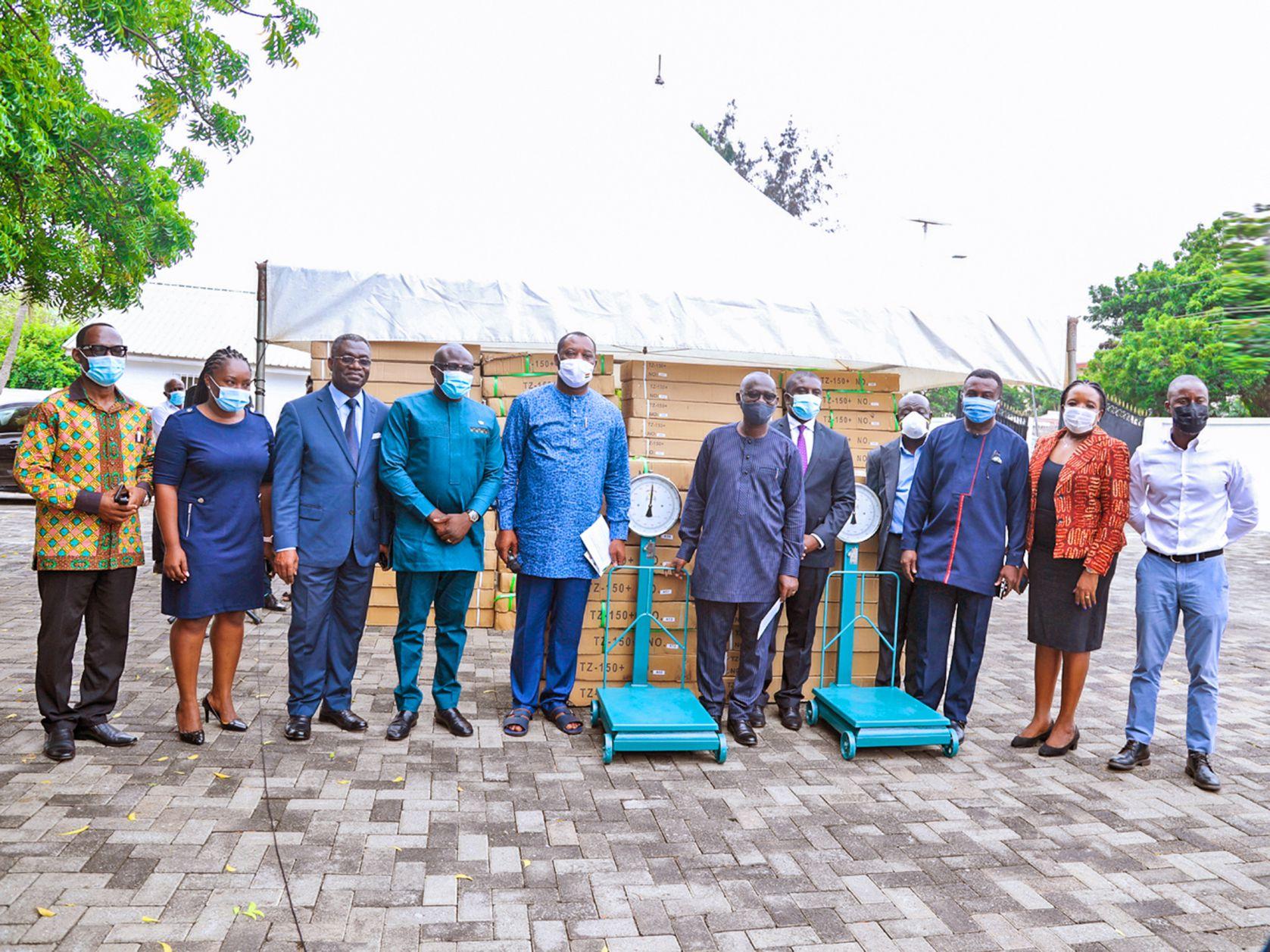
The needs differ as the circumstances. Some require their fees to be paid to enable them access education, some are worried about the poor nature of the water they drink, others are concerned about some minimal capital for a livelihood intervention. I try to do my best, to put a smile on faces.
You have been selected by the African Leadership Magazine to receive Special African Business Leadership Commendation Award, during the 8th International Forum on African-Caribbean Leadership (IFAL) in New York. How does this make you feel?
I humbled and truly so. I do engage in several projects or initiatives because I feel obliged to do them and not necessarily for recognition, but when they are acknowledged by others, it obviously feels good. Such honours also give us reasons to do more. More for our women, more for the deprived, and more for young people, because as former UN Secretary-General puts it “ have confidence in the young people, give them a chance, and they will surprise you”. I am indeed grateful for this international recognition.
INTERVIEW AFRICANLMAGAZINEwEADERSHIP ww africanleadershipmagazine co uk
43 P A G E




Spearheading Pipeline Transportation of Petroleum Products & Storage In Zimbabwe
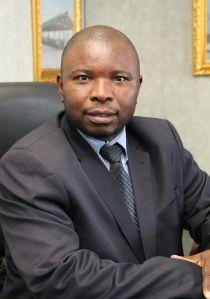
NOIC is in the business of pipeline transportation of petroleum products as well as storage and handling in the Company's depots.The Company has depots in strategic sites around the country, namely Bulawayo, Mutare, Beitbridge, Msasa and Mabvuku. NOIC has blending facilities at its depots and undertakes blending services on behalf of its clients. Under the leadership of Mr Wilfred Matukeni, the current CEO of NOIC Zimbabwe, the company has undertaken a lot of laudable new projects while also upgrading existing ones. The CEO, Mr Wilfred Matukeni had a chat with the African Leadership Magazine in this exclusive interview. Excerpts;
Under your leadership, the NOIC has been working on a lot of fuel storage depots, building pipelines and upgrading existing ones across Zimbabwe. Can you give us a brief insight on projects undertaken and progress made thus far?
NOIC has undertaken several projects, and these include;
and commissioned by 30 June 2023. Subsequently, the Company, in conjunction with its Mozambican counterpart, CPMZ intends to expand the capacity to 5 billion by end of 2025.
Once the product is in Zimbabwe, we have taken measures to ensure that we efficiently re-deliver to our customers. Our depots around Zimbabwe have an installed capacity to load a combined total of 15 million litres of fuel per day. This is to ensure that fuel is readily and timeously available to consumers.
What are some of the projects currently going on that you feel are vital to not just the petroleum sector but are key for the country's economic growth?
Zimbabwe has embarked on a journey to become the in-land fuel hub for land locked Southern African countries, such as Zambia, the DRC and Botswana. Our facilities are able to serve the hinterland markets and enable them to access their fuel closer to their countries at terminals in Harare, instead of driving a further 551 km to Beira, Mozambique. This will result in efficiency in the transportation of fuel to the destined markets. In addition to the above, the transportation of fuel through the pipeline will ensure adherence to tenets relating to protection of the environment and, in particular to Zimbabwe, economic growth.
P A G E
Ÿ
The construction of a road loading gantry with a loading capacity of 4 million litres per day that links with the regional markets.
Ÿ
The current increase of the pipeline capacity from 2.16 billion litres to 3 billion litres by end of year 2023.
The nation has undertaken massive road rehabilitation and infrastructure development which
Ÿ
The acquisition of a fuel depot with a total capacity of two (2) million litres in Bulawayo, to service the southern part of Zimbabwe.
Ÿ
The construction of two (2) ethanol storage tanks at the Mabvuku Depot with a combined capacity of 6 million litres which is mainly for mandatory blending purposes.
Ÿ
The establishment of a Public Private Partnership (PPP) through a joint venture with Triangle Limited to produce ethanol for mandatory blending purposes.
Ÿ
The establishment of a subsidiary Company Genesis Energy (Pvt) Ltd that retails fuel to enhance Government participation in the fuel sector
Zimbabwe has doubled its demand for fuel as of last year, which has been attributed to the increase in business activities in the country. How are you coordinating the NOIC to continue meeting the increasing demands?
The company has sufficient storage capacity and can accommodate the increasing demand. As mentioned above, the current pumping capacity is 2.16 billion per annum, with the upgrade, the first phase targets to increase the pumping capacity to 3 billion litres per annum. This is scheduled to be completed
INTERVIEW www africanleadershipmagazine co uk
45
is set to result in substantial economic developmental impact over the years to come.
In addition, the current increase in the mining activities is expected to culminate in the generation of foreign currency reserves required for the importation of capital goods. This enhanced economic activities across all sectors of the economy as highlighted above will, consequently result in increased fuel consumption.
It has been proven that public-private partnerships (PPP) have the potential to unlock the much-needed financial resources to fund projects which somewhat reduces the financial burden on the government. How do you ensure that the private sector partners and participates in some of your projects?
NOIC is currently in a publicprivate partnership (PPP) with Triangle Limited in the production of ethanol for mandatory blending purposes. By way of background, in line with the global trend towards the use of cleaner fuels and further, the need to curtail the importation bill, the Zimbabwean laws require that all unleaded petrol consumed in the country be blended with ethanol. The blending ratios vary from time to time depending on the availability of ethanol. With a view to contribute to these objectives NOIC partnered with Triangle Limited on the basis of two underlying motivations, thus:
Ÿ
To enhance the national production levels; and
produced products will always be preferred to foreign products of similar quality and specifications.
Being at the top of an important organization like the NOIC definitely will be a rich and rewarding experience for anyone. It will also come with challenges, tough decisions, and historic moments of great significance for you as an individual and the organisation at large. How has the journey at the top of NOIC been for you so far?
I have had a memorable journey and rewarding experience in this position so far. As you have correctly noted, the challenges are numerous, some of which we thought we would not be able to surmount when we first observed them.
Nonetheless, the entire cocktail culminated in the success we see today. I would hasten to say that the lessons learnt far outweigh the achievements made.
However, our efforts would have been in the absence of the appropriate fundamentals.
I am grateful for the support we continue to receive from our Government, through the creation of a conducive operating environment. The invaluable contribution of the NOIC Board through wise counsel and astute strategic leadership and direction is greatly cherished.
high return on capital for investors.
Over the past two to three decades there has been significant economic growth in Africa and those who were perceptive enough to see it and join the party have not regretted.
In my view, it is not appropriate to take the stencil of investment for other continents and try to impose it on Africa. The fundamentals are different and therefore, a different model is required. The secret is to identify the appropriate model.
An important factor that will encourage investors is the creation of a favorable/ enabling business environment and obviously, equitable means of repatriating income realised. This has to be balanced with the principle of ploughing back into the economy which has created the value.
You have just been nominated to be conferred with the African Business Leadership Excellence Award for displaying innovative leadership. How do you feel about this honour?
I am humbled and at the same time encouraged by the recognition of my work and I am honoured to receive it as an affirmation (even to myself) of the hard work that we have put in as the NOIC team.
Ÿ
To ensure consistency of supply and blending at the prescribed level.
How are you ensuring that the implementation of these projects maintains a certain level of Zimbabwean content?
As far as possible, subject to availability of the requisite skills, we try to ensure that we engage local entities as contractors for our projects. We also encourage contractors to partner with external contractors to ensure that there is transfer of skills. With regard to materials and equipment the locally
Lastly, corporate leadership and governance is not a one-man band. I have worked with a vibrant and committed team which has been and continues to be ready and willing to go all out to make NOIC a success.
What do you see as Africa's chances on investments in the short and medium term and What necessary measures should be taken to encourage foreign investors into doing business on the continent?
There are vast investment opportunities in Africa across all sectors of the economy continent, because of its largely, greenfield characteristic. Africa offers a growing population and abundant labour force that can provide 'an engine' for
The award propels me and challenges me to keep striving for excellence. Continuous improvement is key. One definition of figurative death is the absence of improvement.
I am sincerely grateful to the African Leadership Magazine for this honour and to the NOIC team for the effective teamwork and commitment that enable us to walk this momentous journey. I thank you.
The award propels me and challenges me to keep striving for excellence. Continuous improvement is key. One definition of figurative death is the absence of improvement.
INTERVIEW AFRICANLMAGAZINEwEADERSHIP ww africanleadershipmagazine co uk
46 P A G E
and diligence.
During his tenure at NOIC, Wilfred attained several notable achievements. He successfully executed and commissioned infrastructure projects of a significant nature with immense contribution to the economy. Some of them are summarised below:
Ÿ
The increase of the pipeline capacity from an annual throughput of 1.44 billion per annum to the current 2.16 billion litres per annum. Currently, in collaboration with its Mozambican counterpart, CPMZ, NOIC is undertaking a project to ramp up the capacity to 3 billion litres per year, with plans to reach a capacity of 5 billion litres by 31 December 2025.
Ÿ
The development of a road loading gantry at NOICʼs Mabvuku Depot with a combined loading capacity of 4.8 million litres per day. Prior to this, the Mabvuku Depot could only load fuel through rail.
Ÿ
Mr Wilfred Matukeni is the Chief Executive Officer of the National Oil Infrastructure Company of Zimbabwe (Private) Limited (NOIC). NOIC is a very critical and strategic company in the nation as it is responsible for ensuring of security of supply of fuel products in the land locked country. It also provides a gateway for supply of fuel to the hinterland markets in the Southern African region.
Mr Matukeni has oversight over all activities relating to the transportation of petroleum products by the pipeline from the Port of Beira, Mozambique into Zimbabwe and the subsequent storage and handling of same. NOIC owns and operates more than half a billion litres of fuel storage infrastructure in Zimbabwe. Mr Matukeni has been at the helm of the organisation since 2011 when the company commenced operations on the ashes of the restructuring of the former National Oil
Company of Zimbabwe (NOCZIM). At the time of inception, NOIC was a loss-making enterprise. The company now boasts of an annual revenue of US$212.700 million for the year ended 31 December 2021.
An economist and accredited accountant by training, Mr Matukeni is a seasoned administrator whose experience spans over 26 years. He combines and utilises all his skills and experience to execute his mandate with excellence, astuteness

Ÿ
The acquisition of a fuel depot with a total capacity of two (2) million litres in Bulawayo, which is in the southern part of Zimbabwe, to ensure that all parts of the country always have reliable access to petroleum products.
The construction of the two (2) ethanol storage tanks at the Mabvuku Depot with a combined capacity of 6 million litres to ensure consistent blending of petrol with ethanol in line with the global trend towards the use of cleaner energy sources and the national objective on import substitution.
Ÿ
The establishment of a Public Private Partnership (PPP) through a joint venture with Triangle Limited to produce ethanol for mandatory blending purposes.
Ÿ
The establishment of a retail arm of the Company, Genesis Energy (Pvt) Ltd to enhance Government participation in the sector. Genesis Energy now control 7.5% of the Zimbabwe retail market.
Under Wilfredʼs able leadership, NOIC is also constructing a Liquified Petroleum Gas (LPG) storage and handling facility with a total capacity of 2 000 metric tonnes in Ruwa, Zimbabwe.
Wilfred holds a BSc Economics (Hons) from the University of Zimbabwe and an Executive Masters in Business Administration, (EMBA) from the Midlands State University (MSU), Zimbabwe.
He is a member of the Chartered Institute of Management Accountant (CIMA, UK) and the Chartered Institute of Secretaries (CIS).
Over the years he has received several awards in recognition of his contribution to strategic business leadership, management and administration.
INTERVIEW AFRICANLMAGAZINEwEADERSHIP ww africanleadershipmagazine co uk
47 P A G E
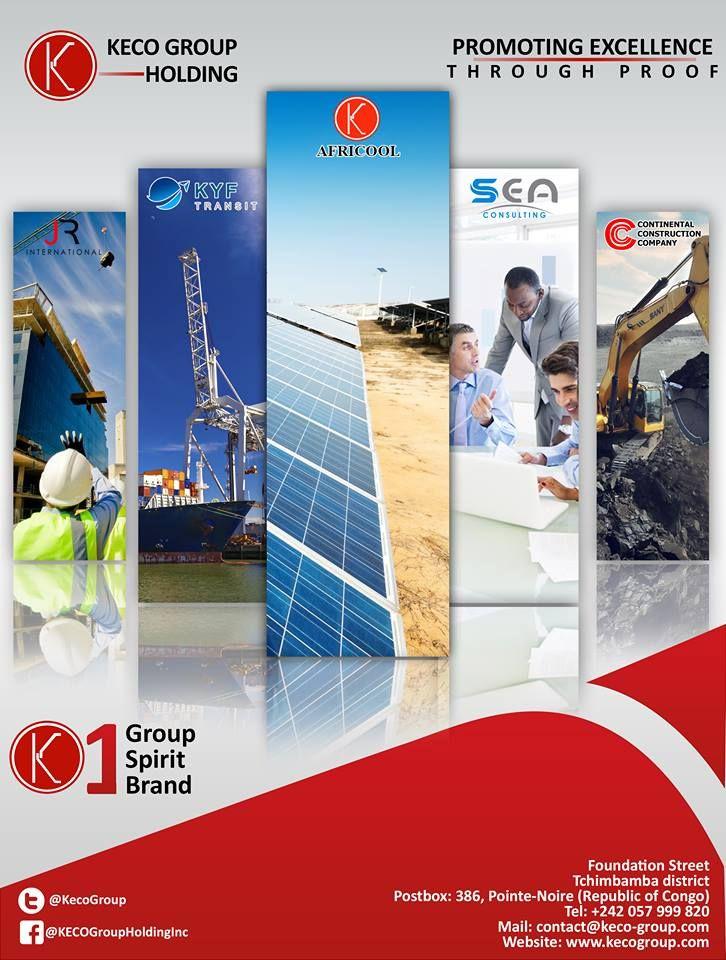
In line with its mandate of telling the right story about the country and changing warped misconceptions about the Rainbow Nation, Brand South Africa, the country's foremost brand and image management company has continued to up the ante in its management of the country's image, both locally and globally

Brand South Africa was created with the mandate of inspiring pride, patriotism, social cohesion, nation building and positive change in South Africa. Brand South Africa has continued to bring to life and share how South Africa is consistently 'Inspiring new ways' through each of its communication pieces and in every campaign.
Over the years, Brand South Africa has continued to deploy innovative approaches towards showcasing the uniqueness of the country. One of such innovations is
the annual Nelson Mandela Leadership Series, which has become a platform for evaluating progress made by leaders across the globe and how Nelson Mandela's legacies can help shape a better world for all of us.
This year, Brand South Africa organized the Webinar, titled Leadership through the Lens of Nelson Mandela: Lessons for Today's Global Environment, as part of activities to mark the 2022 Nelson Mandela Day, held annually in July to commemorate the UN declaration, celebrating the leadership legacies of the great Nelson Mandela.
The webinar was organized by Brand South Africa in strategic partnership with the African Leadership Magazine UK. It had speakers drawn from the political and diplomatic communities, including Lord Peter Hain, a Member House of Lords, Baroness Sandy Verma, a member House of Lords, Pumela Salela, UK country Head, Brand South Africa, Kingsley Okeke, Group Managing Editor, African Leadership Magazine U.K. In their responses to the discussions, Dr Liaqat Alli Azam, CEO of Leading Like Mandela Leadership Institute, and Dr Thelela Ngcetane-Vika, of Traversing a Leadership Avalanche, took turns to underscore each speaker's contributions and how it relates to the prevailing challenges confronting the world.
Speaking during the event, a member of the UK House of Lords, Lord Peter Hain, highlighted some of the undeniable qualities of late President Nelson Mandela, former President of South Africa, that global leaders must adopt to help curb some of the prevailing global challenges. Lord Hain made this call during this Keynote address at the just concluded Webinar organized by Brand South Africa, in partnership with the African
TRADE & ECONOMY AFRICANLMAGAZINEwEADERSHIP ww africanleadershipmagazine co uk
49 P A G E
Leadership Magazine UK. The Webinar, titled Leadership through the Lens of Nelson Mandela: Lessons for Today's Global Environment, was organized as part of activities to mark the 2022 Nelson Mandela Day, held annually in July to commemorate the UN declaration, celebrating the leadership legacies of the great Nelson Mandela.
According to Lord Hain, "Nelson Mandela's greatness as a leader has some lessons we can all learn from as leaders. Mandela not only endured his incarceration in the tiny cell in Prison at Robin Island but also became stronger. Also unique was his courage to face the judge at the Rivonia Trial in 1964."
Lord Hain added, "he didn't try to apologize for leading the underground campaign after the ANC was banned. He stood by his principles and gave a memorable speech which many of us still remember."
"In the circumstance, many of us would have thought to make a speech to appeal to the judge. Because they all faced the death sentence; but, he gave this defiant speech in which he said what his ideals were, that he continued to believe in them and that if he had to die for them, then he'd accept that as well. Of course, we know that he was sentenced to life imprisonment instead," he said.
Lord Hain also highlighted Nelson Mandela's toughness as a virtue that leaders must emulate in today's world. In his words, "The second characteristic of his Leadership was his toughness. People always remarked on his humanity, generosity, and refusal to be vengeful regarding his former oppressors, but he was also very tough. When the President at the time was negotiating with Nelson Mandela, it was a very tough negotiation because Nelson Mandela stood on his principles and refused to give in to all forms of tactics and intimidation."
"Those who now criticize Nelson Mandela failed to recognize the historic situation in which he found
himself and the ANC leadership found themselves as well. And he was very, very tough. He said, no, we will stick by our principles of one person, one voice of a democracy representing the will of the people. And, of course, he won through on that, despite the President unleashing the security forces who meted out a wave of terror on grassroots ANC supporters. More people were killed in that period between Nelson Mandela coming out of Prison and becoming President than at any time in apartheid history because the regime was seeking to negotiate its opposition."
“The apartheid government realized it had to, or the country would collapse into civil war, economic decay, and deprivation. So, it was negotiating with Nelson Mandela and trying to assert its power and kill many of its followers. So, he showed great toughness and resolution in standing up for what he believed in, and ultimately winning through the next principle is his determination," he added.
He also hailed Nelson Mandela's commitment to promoting constitutional democracy. According to him, "Mandela's belief in a constitutional democracy is another sign of His greatness as a leader, as is his generosity. He was always insisting on never hating anybody. That's difficult for all of us emotionally, from time to time in our lives, especially if we read politics. And never humiliate your enemy. Because he had this
phrase about, there is nobody so dangerous as one who was humiliated. So, he believes in respect, even for your enemies, but remaining resolute and tough in sticking to your principles. Nevertheless, I ended up on this other character as a leader."
He also described Nelson Mandela as a people person. Hear him, "I don't boast about the fact that I have had the privilege not just as a friend of Nelson Mandela, but also to meet leaders right across the world in my position as a government minister, a cabinet minister, and in other roles that I've played in over half a century in politics. I've had kings and queens, including the British monarch. I've met presidents and prime ministers. I've met pop celebrities, rock stars, and sporting stars. I've never met anybody like Nelson Mandela, who is a people person. He was a people's leader. He never lost his interest in people." And that is one of the things that I think marked his greatness.
On her part, Baroness Sandy Verma, reiterated the importance of Nelson Mandela's legacy of inclusion in today's global environment.
According to Baroness Verma, “when we talk about leadership through the lens of nelson Mandela, one of the things that we must not forget, is the recent event of COVID The event of COVID thought us that unless everybody was safe, nobody was safe. Yet, we witnessed how so many people in poor countries, were left out of the great speed in getting vaccination. That did not deter those countries from looking at their own solutions and I think that was a turning point for many people to realize that they have the strength in their own hands and great confidence in what they themselves can deliver.”
Over the years, Brand South Africa has continued to deploy innovative approaches towards showcasing the uniqueness of the country.
While highlighting the need for greater partnership and collaboration, Baroness Verma stated that, “the world is split into two – the west with an aging population; and the developing world with a dividend of young people. So, we cannot ignore the fact that at some point, there is going to be some kind of interdependencies across those
TRADE & ECONOMY AFRICANLMAGAZINEwEADERSHIP ww africanleadershipmagazine co uk
50 P A G E
boarders. We should therefore begin to revisit the way we exist, side by side.”
Baroness verma also emphasized Nelson Mandela's commitment to peace. In her own words, “Nelson Mandela was a pioneer in enduring white minority rule in South Africa and post-apartheid, he didn't come out with anger and hate, but, with reconciliation. He also came with a mission towards building a country that wanted to eradicate poverty.”
“I always say, when you dream, the best way to achieve that dream is by including the dreams of other people, because, having a single dream, will not change the way the world exists. We still live in a time when the leaders who hold the levers of power, make decisions that does not always include the majority of the populace. If we have learnt anything from great leaders like Nelson Mandela, it is that we have got to reach out, she said.”
The Chief Executive Officer of Leading Like Mandela, Dr Liaqat Alli Azam, while responding to the keynote speeches, maintained that all leadership begins with self-leadership.
According to Dr Aazam, “Nelson Mandela's leadership style was one that was grounded in his identity. And this is what every leader needs to understand that all leadership begins with self-leadership. They cannot lead others if we do not lead ourselves. One needs to be at peace with yourself, for you to be able to bring about peace in the world. And most of our leaders and or and many leaders
Continuing, he averred that, “Nelson Mandela firmly believed and fought for this principle of oneness, and it is embodied in Africa; it is known as, I am because you are and he has stated that your freedom and mine cannot be separated.”
Dr Aazam, also, “went on to challenge thought leaders who participated in the event to tap into the power and the resource we have within us and unleash. This is what enables us to own trust. He further iterated on the need for transparency”
The webinar was organized by Brand South Africa in strategic partnership with the African Leadership Magazine UK. It had speakers drawn from the political and diplomatic communities, including Lord Peter Hain, a Member House of Lords, Baroness Sandy Verma, a member House of Lords, Pumela Salela, UK country Head, Brand South Africa, Kingsley Okeke, Group Managing Editor, African Leadership Magazine U.K. In their responses to the discussions, Dr Liaqat Alli Azam, CEO of Leading Like Mandela Leadership Institute, and Dr Thelela Ngcetane-Vika, of Traversing a Leadership Avalanche, took turns to underscore each speaker's contributions and how it relates to the prevailing challenges confronting the world.
The webinar, which is designed to celebrate one of Africa's most extraordinary leadership exports-Nelson Mandela, is organized in partnership with the African
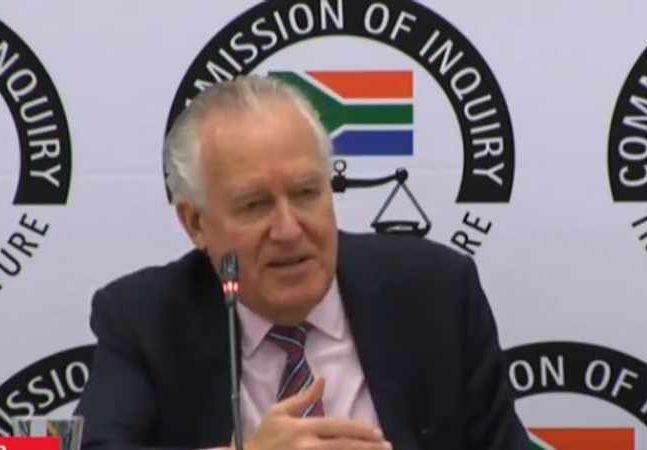
TRADE & ECONOMY AFRICANLMAGAZINEwEADERSHIP ww africanleadershipmagazine co uk
were quick to utilize force as opposed to the inner power”
51 P A G E
Leadership Magazine U.K.
The world is at a critical juncture and in dire need of leadership. With the rising cases of Coup De tat in West Africa and the global uncertainties occasioned by the war between Ukraine and Russia –leading to a deeply polarized world, this conversation is as important today as it was many years ago.
Nelson Mandela is an asset to South Africa, Africa and the world. This event helps to therefore remind leaders across all facets, including governments, civil society and business, that leadership is all that matters in critical times.
The webinar also explored how leaders can draw inspiration from Nelson Mandela's leadership style and apply it to business, civil society and government. They will reflect on how they view leadership through the lens of Nelson Mandela.
About Brand South Africa
Brand South Africa is the official marketing agency of South Africa, with a mandate to build the country's brand reputation to improve its global competitiveness. Brand South Africa's primary focus is to develop and implement proactive, coordinated marketing and communications reputation management strategies for South Africa. Our main objective is to market South Africa to domestic and international audiences, positioning South Africa as a competitive investment destination and inspiring and instilling active citizenship amongst South Africans.
Over its two decades of Nation Brand building, Brand South Africa has collaborated with incredible South Africans whose triumphs have made the world watch in awe. Its campaigns have profiled achievements that were alive with possibility and subsequently, inspired new ways. In launching the new Nation Brand tagline in 2012, the CEO of Brand South Africa at the time, Miller Matola said, “Inspiring new ways is an overarching country position for South Africa relating to everything we do and what we are including our people, our culture and heritage, tourism, exports, governance and investment and immigration. At Brand SA, we want to inspire all South Africans to play a role in shaping the future of our country
Brand South Africa has gone on to position South Africa as a prominent standing feature at the World Economic Forum in Davos which went on to enhance awareness of the country's Nation Brand identity, image and competitiveness. In 2016, the inaugural Nation Brand Forum emerged as a platform to positively influence the Nation Brand's reputation through stakeholder collaborations. From time to time, Brand South Africa has also willingly supported fellow African nations in the development of their Nation Brand institutions and strategies.
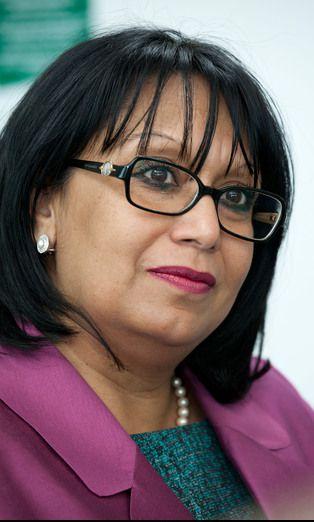
TRADE & ECONOMY AFRICANLMAGAZINEwEADERSHIP ww africanleadershipmagazine co uk
52 P A G E
T R AD E-D RI V E N INDUSTRIALIZATION IN AFRICA
The African Import and Export Bank in its recent report argued that the African Continental Free Trade Area would be the game changer in driving Africa's industrialization, writes Dike Onwuamaeze
The African Export and Import Bank (Afreximbank) has affirmed that the African Continental Free Trade Area (AfCFTA) agreement would be the continent's industrial accelerator It stated unequivocally that, “AfCFTA will accelerate the growth of labour intensive manufacturing industries.”

The Afreximbank's affirmation was contained in a report it published in this month, which was titled “Africa's 2022 Growth Prospects: Poise under Post Pandemic and Heightening Geopolitical Pressures.” It said in the report that the AfCFTA agreement would usher in a period of renaissance in African manufacturing sector and become a critical driver of African economic growth in the near term.
The report identified East and West Africa as the regions
manufacturing would play a critical role in sustaining economic growth.
“The sustained injection of patient capital and rise of East Africa's automotive industry is helping to expand opportunities for labour intensive employment under a proven manufacturing-led growth model and will expand the fiscal space to gradually strengthen the foundation of macroeconomic stability,” the report said.
Turning to West African subregion, the report said that despite the protracted negative effects of conflict and insecurity, especially in the Sahel region, members of the Economic Community of West African States (ECOWAS) are also expected to enjoy robust growth in 2022.
“The sub-region will be supported by the usual assortment of strong performers (Benin, Cote d'Ivoire, Ghana, Guinea and Senegal), and by Nigeria, where the purchasing managers' index (PMI) rose sharply to 57.3 in February 2022, the largest expansion since November 2019. The telecommunications and financial
services sectors, as well as extensive investment in strategic industries, are enhancing growth resilience in Nigeria. The oil sector, too, will benefit from a gradual easing of OPEC production cuts and higher prices, which have received another boost from the Ukraine crisis. The latter are expected to remain above the country's fiscal breakeven price of $62 per barrel, “it stated.
LDR and SMEs
The report added that the Central Bank of Nigeria's loan to deposit ratio (LDR) policy would spell a boon for micro, Small and Medium Enterprises (MSMEs), especially those in manufacturing.
The report, which was authored by the Chief Economist and Director of Research at Afreximbank, Dr Hippolyte Fofack, stated that trade integration reform would reinforce macroeconomic stability across Africa as the agreement on the Rules of Origin, which would become effective later this year would accelerate the diversification of sources of growth and trade.
TRADE & ECONOMY AFRICANLMAGAZINEwEADERSHIP ww africanleadershipmagazine co uk
53 P A G E
A section of the report, which was sub-titled, “The AfCFTA as the Industrialisation Accelerator,” projected that AfCFTA would increase the value of African automotive market from $30.44 billion in 2021 to $40.06 billion in 2027.
The report also highlighted that AfCFTA would awaken the revival of industrialisation of African economies and also deepen and create an increasingly competitive regional value chains; it would also facilitate the emergence of more resilient supply chain and add more value chains through backward activities.
The report emphasised the role of the manufacturing sector in this projected economic growth. It said: “Moreover, AfCFTA will bolster sustained welfare improvement, with the rise of a strong manufacturing base which has been a catalyst of increasing opportunities for labour intensive employment acting as an elevator out of poverty
“Africa's industrial and manufacturing output, which went through a long period of sustained decline towards the end of the last century, giving rise to the premature deindustrialisation argument reversed course a decade ago and has been increasing steadily since.
“Expressed as a share of GDP, manufacturing exceeds 12 per cent according to most recent estimates, up from less than 10 per cent a decade ago, having declined from 17 per cent when Structural Adjustment Programmes (SAP) was introduced in the early 1980s. The revival in manufacturing's fortunes has been strong, especially after adjusting for income and population. Since 2000, manufacturing output has risen 91 per cent in real terms.”
Manufacturing share of Exports
The report said that manufacturing share of the continent's exports has expanded as well, from 35.5 per cent in 2008 to 54.2 per cent a decade later, with exports becoming increasingly more integrated into global value chains
It noted that the sectoral drivers
of manufacturing in the continent have also witnessed increasing diversification, extending beyond traditional original equipment manufacturers (OEMs) of products with low degrees of automation such as leather, footwear, and garments to include technology and fintech industries, which are driving digitalisation and more sophisticated industries with greater potential for structural change.
The bank stated that the growth in technology and fintech industries have become increasingly important and accounting for around half of Africa's growth in output per worker in the first decade of this century
In addition to the emergence of strategic industries such as refineries and cement, the automotive sector has become a magnet for patient capital. “After Volkswagen established a car manufacturing centre in Rwanda, Peugeot and Opel followed suit by opening plants in Namibia to assemble up to 5,000 vehicles per year
“Ghana, too, is now home to assembly plants from Nissan and Volkswagen. Meanwhile, Morocco has been extremely successful in developing its car industry, with around 80 per cent of its exports oriented towards Europe and the rest to domestic and regional markets,” the report said.
Boosting FDI inflows
In addition to boosting FDI inflows, empirical evidence has shown that joining a free trade area could raise them by around a quarter
Relatedly, through improving economies of scale, the free trade area will afford companies more opportunities to spread the risks of investing in smaller markets.
The report stated that in some countries, output would continue to expand above regional and world averages, being “supported by the increasing diversification of sources of growth that is expanding manufacturing output and trade.”
It referred to the World Bank's
estimation that the AfCFTA's reform has the potential to increase Africa's exports by $560 billion mostly in manufacturing, and boost Africa's income by $450 billion by 2035.
In addition to transforming the region's productivity landscape, the AfCFTA promised to deepen and create new and increasingly competitive regional value chains, as well as to facilitate the emergence of more resilient supply chains.
It would also add more value to the continent's commodities to integrate global value chains through backward activities, especially in the automotive industry that would play a key role in structural transformation.
For instance, in 2019, intracontinental automotive exports accounted for around 16 per cent of Africa's automotive exports to the world. And following current trends, a full implementation of the AfCFTA underpinned by a strict implementation of the rules of origin would greatly increase these numbers.
“Estimates have shown that the value of the African automotive market would reach $42.06 billion in 2027, up from $30.44 billion in 2021, propelled by large economies in East Africa, including Ethiopia, Kenya, and Tanzania. Ethiopia is slated to achieve the most impressive growth, with demand increasing from 30,380 units in 2020 to 112,814 in 2035,” the report said.
The Afreximbank's report also observed that African governments are beginning to wake up to the responsibilities to aid economic growth.
It said: “To support the AfCFTA's implementation and capitalise on its growth potential, governments are developing critical economic infrastructure. This includes the expansion of special economic zones (SEZs), which have been instrumental in other parts of the world, most notably Asia, in developing regional value chains and boosting countries' participation in global value chains.”
TRADE & ECONOMY AFRICANLMAGAZINEwEADERSHIP ww africanleadershipmagazine co uk
UNCTAD SEZ Programmes 54 P A G E
According to the United Nations Conference on Trade and Development, the numbers of African countries with SEZ programmes have increased from just four in 1990 to 47 in 2020, with most nations hosting several SEZs.
A growing number of countries are executing plans to improve domestic production capabilities in manufacturing. In Zambia, the national strategy for the AfCFTA's implementation recognised the critical importance of MSMEs as drivers of growth and export diversification and is facilitating their integration into regional and global value chains.
At the regional level, countries are coordinating their efforts for greater policy alignment. For instance, regional economic communities are working towards more united strategies, starting with industrial policy and trade partnerships with OEMs, and developing mutually beneficial bilateral and multilateral country agreements.
The report stated that two other factors would further accelerate Africa's manufacturing renaissance under the AfCFTA: first, the reordering of global supply chains, which has been accelerated by both the COVID19 pandemic and geopolitical
realignments, which could lead to the emergence of competing blocs with distinct technological standards and cross-border payment systems.
The report identified the second factor as the changing nature of China-Africa engagement. It said that despite the cost advantages of the just-intime global supply chain model that is characterised by lean inventories and outsourcing to lowcost locations, the pandemic has highlighted its inherent risks and encouraged a shift towards the regionalisation and 'friend-shoring' of supply chains.
“Combined with the rules of origin that prioritise 'Made in Africa' goods, the reordering of supply chains offers another opportunity to accelerate domestic manufacturing in support of intra-African trade.

“The changing nature of engagement, namely emphasising trade and investment promotion, announced during the eighth Forum on China-Africa Co-operation held last year in Senegal will bolster Africa's manufacturing boom. The Chinese leadership has decided to raise its annual imports from Africa to more than $300 billion, up from $105 billion in 2021 over the next three years and shift compositions to increase the manufacturing content of
those imports.
“This includes the injection of $10billion in major industrialisation and employment promotion projects in Africa, direct support for the growth of African MSMEs and the establishment of a cross-border renminbi centre.
“Beyond reducing the excessive dependency on commodities to rebalance China-Africa trade, such measures will accelerate the process of technology transfer and raise productivity. Ultimately, this will enhance Africa's integration into the global economy, in no small part because global trade growth has historically been higher in more technology-intensive sectors,” the report said.
The changing nature of engagement, namely emphasising trade and investment promotion, announced during the eighth Forum on China-Africa Co-operation held last year in Senegal will bolster Africa's manufacturing boom.
TRADE & ECONOMY AFRICANLMAGAZINEwEADERSHIP ww africanleadershipmagazine co uk
55 P A G E
MASTERCARD:
The Division President, Sub-Saharan Africa - Mastercard, Mark Elliott, in this engaging interview with the African Leadership Magazine, speaks on Mastercard’s contributions to financial inclusion in Africa, support for African SMEs and promotion of the continent’s digital economy. Excerpts:

Can you share some of your companyʼs efforts in the past one year towards creating pathways for financial inclusion in Africa?
In Africa, Mastercard is directly contributing to the building of robust digital payments ecosystems that support the continentʼs potential for economic transformation. To meet Africaʼs unfulfilled demands for goods and services, close infrastructural gaps, create jobs, displace cash, and decrease poverty, Mastercard is bringing together an entire ecosystem of key players at different touch points to deliver digital solutions that have a far-reaching impact.
One of the areas we, as a company, are innovating for impact is in financial and digital inclusion. In 2020, Mastercard doubled down on its financial inclusion commitment to connect a total of 1 billion individuals and 50 million micro and small merchants to the digital economy by 2025 – with a direct focus on 25 million women entrepreneurs. To reach this goal, we developed
and launched several technology innovations in partnership with our customers in Sub-Saharan Africa.
For example, last year Mastercard teamed up with MTN, a mobile network operator in Africa, to bring more digital services to MTNʼs platform. That work puts data analytics and payments tools right on the phones of local entrepreneurs, helping them manage their businesses. We are also working with mobile network operators to reach more people with financial and digital literacy programs.
In South Africa, we funded two entrepreneurial development programmes in 2021 run by non-profit Junior Achievement South Africa, which saw more than 180 young women gain entrepreneurial skills to start or grow their own businesses. And in Kenya, Mastercard partnered with Unilever and Kenya Commercial Bank (KCB) to offer new lending models for micro-merchants. The JazaDuka program gives small shop owners short-term credit and digital payment capabilities to help them build their creditworthiness and stock their shelves without having to rely solely on cash. And recently, we teamed up with Kasha, the purpose driven digital retail and distribution platform, to include an additional 5000 Micro Small and Medium-Enterprises into the program.
These are just a few examples of how Mastercard is driving Africaʼs digital transformation with the goal to create a digital economy that works for everyone,
AFRICANLMAGAZINEwEADERSHIP ww africanleadershipmagazine co uk
56 P A G E
everywhere.
You recently launched the Digital First program in Africa and other regions. Kindly tell us about your program and successes in promoting the agenda of a digital economy in Africa?
For the digitally connected consumer who seeks immediacy and convenience, Mastercardʼs Digital First program delivers an innovative and secure experience that makes it easier to pay and enjoy the value of the card in ways that personally matter
Backed by the speed and security of Mastercardʼs global network –including the Mastercard Processing platform to enable instant issuance –the Digital First program offers consumers the ease of applying online, instant digital card issuance, real-time card management and secure, straightforward online payments.
Mastercardʼsʼ Digital First program gives consumers a whole host of options in making payments – from ecommerce to contactless to QR, using any digital device of their choice. It also enables consumers to have control to manage their finances, as well as enhanced security for peace of mind. Not to mention, consumers get to interact with card benefits and offers that deliver real value in moments that matter to them.
Mastercard is enabling our customers to innovate faster by providing a network of partners that support each step of the consumer digital journey – from acquisition and card usage to management and engagement, with a physical card option. Building a robust network of qualified enablers is helping customers quickly launch digital products from the ground up.
For the Digital First program in Sub-Saharan Africa, the Mastercard network includes a cohesive list of Digital First partners including technology and fintech players who have the expertise to simplify the process of bringing best-in-class capabilities into the issuer environment. This means that our customers can leverage the excellent global partnerships with end-to-end Digital First enablers, such as Thales, Network International and Verestro, along with regional partners with stellar reputations, such as Ukheshe, and Paymentology
Together with Mastercard, these players work with issuing banks to ensure the foundational requirements of the Digital First Card Program are met, which has been built to deliver an optimal and secure consumer experience, while connecting more people to the digital economy
It is estimated that SMEs make up 90% of the private sector in
developing nations and provide an estimated 80% of jobs across the African continent, which makes it an important driver of economic growth. What are some of your contributions and achievements in supporting SMEs growth in Africa?
A stable, growing, connected small business can be the key to financial inclusion for the whole community. As a technology company, Mastercard has leveraged the power of partnerships to deliver inclusion by providing financial, technology, product, and services support to small, micro and medium enterprises across Africa.
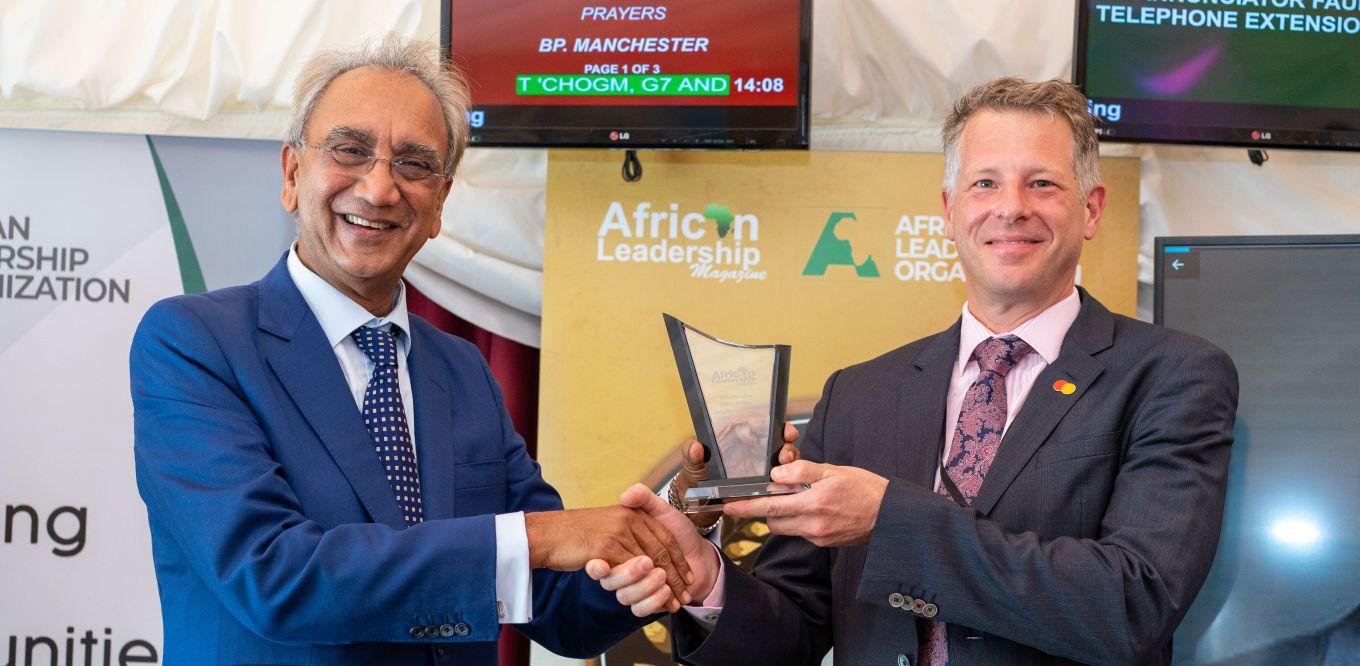
SMEs have been trending toward digital banking and payments for a while, but Covid-19 has accelerated this shift. In fact, 82% of the SMEs surveyed in our Global State of Pay report said they were interested in increasing the number of digital payments they make, and theyʼre looking for low-cost solutions that are simple and easy to use.
That goes for acceptance too. Although digital adoption has been growing before Covid-19, the pandemic has highlighted the importance of digital payment acceptance as part of staying open, securing income, and boosting growth. While small businesses traditionally lagged larger ones in omni-channel presence, the trend of
AFRICANLMAGAZINEwEADERSHIP ww africanleadershipmagazine co uk INTERVIEW
57 P A G E
shopping from home, and the need for touch-free payments in-store ignited a need for them to accept digital payments.
For example, when we realized that the most urgent need of SMEs in South Africa was to start selling online using e-commerce without having access to tools or knowledge, our collaboration with Standard Bank resulted in a solution that helps businesses move online and accept digital payments. The online solution involves having a dedicated website in a matter of minutes, receiving orders, accepting payments, and finding a delivery partner
New technologies like Mastercardʼs Tap on Phone, which turns an Android phone into a contactless acceptance device, is further helping small businesses to adapt. For microbusinesses who largely operate in the cash economy, Mastercard Quick Response (QR) code technology provides a simple and more affordable solution to accept card payments than traditional POS devices for both online and faceto-face transactions.
We also aim to expand the contributions of women entrepreneurs and are committed to advancing social progress to provide financial literacy training and encourage the growth of entrepreneurship especially among women. When everyoneʼs talents are included, we unlock new ideas to solve the worldʼs most pressing problems.
Through the Mastercard Centre for Inclusive Growth, we awarded a women-owned and led business, The OmanessSkinfood Company, with a grant to expand their business in Nigeria. Our support provided the skinfood merchants with microinventory credits, marketing support and business development training, enabling them to start a profitable business, alongside opportunities to sell more, earn more, scale faster and ultimately benefit from a sustainable income.
According to available data, the agricultural sector in Africa can help
reduce poverty, raise incomes and improve food security for 80% of the world's poor, yet only 3% of the sector receives banking credit, limiting the sectorʼs capacity to grow Therefore, kindly tell us about the Mastercard Farm Pass and your contributions towards changing the narrative.
In Africa, farmers face significant challenges, including limited access to markets, access to working capital to secure quality seeds and pesticides, and access to relevant financial tools to pay and get paid efficiently. This has led to insecurity, inefficiencies, and a waste of resources and food, preventing farmers from running sustainable businesses.
To help smallholder farmers overcome these challenges and transition from subsistence to commercial farming, Mastercard launched a digital platform in 2015 called Farm Pass, bringing together various agri-sector stakeholders from the supply and demand sides in one agricultural marketplace. Smallholder farmers can sell their produce at a better price, access quality inputs and farming information, get paid and pay digitally and develop a financial profile that can unlock financing opportunities for working capital and inputs
Across Africa, Farm Pass has already helped nearly 670 000 smallholder farmers access better prices. It is transforming agricultural ecosystems and connecting farmers to the formal financial system, also providing them with a digital record that could support future loan applications. During the pandemic, farmers were able to sell produce at 25%-50% higher prices by connecting directly with buyers in Farm Pass, even though local markets were closed.
Soon, more farmers will discover its benefits as a result of the partnership between Mastercard and Ecobank Group, which will see Farm Pass rolled out to 33 countries across Sub-Saharan Africa, growing the solutionʼs footprint beyond Uganda, Kenya and Tanzania where it is currently live. And as more farmers
move from subsistence to commercial farming, it will in turn stimulate agricultural growth, increase competitiveness, and improve food security in Africa – which has also experienced the knock-on effects of disrupted supply chains due to the Ukraine crisis.
Farm Pass is part of Mastercardʼs strategy to connect underserved communities to essential services through Community Pass, a shared interoperable digital platform that supports the companyʼs commitment to connect one billion people and 50 million small and micro businesses to the digital economy by 2025. Mastercard was recently conferred with the African Business Integrity Leader Award during a ceremony held at the House of Lords in London, United Kingdom. What does this mean to the organization?
Winning such a prestigious award is an absolute honour for us as an organization. This award is a testament to the confidence our partners continue to put in our brand, products, and solutions. For more than 50 years, weʼve been using our technology and expertise to make payments safer, simpler and seamless. We leverage technology to deliver solutions that solve real pain points and strategically partner with a wide variety of stakeholders including fintechs, financial institutions, telcos, retailers and governments, to make the digital economy work for everyone,
AFRICANLMAGAZINEwEADERSHIP ww africanleadershipmagazine co uk INTERVIEW
58 P A G E
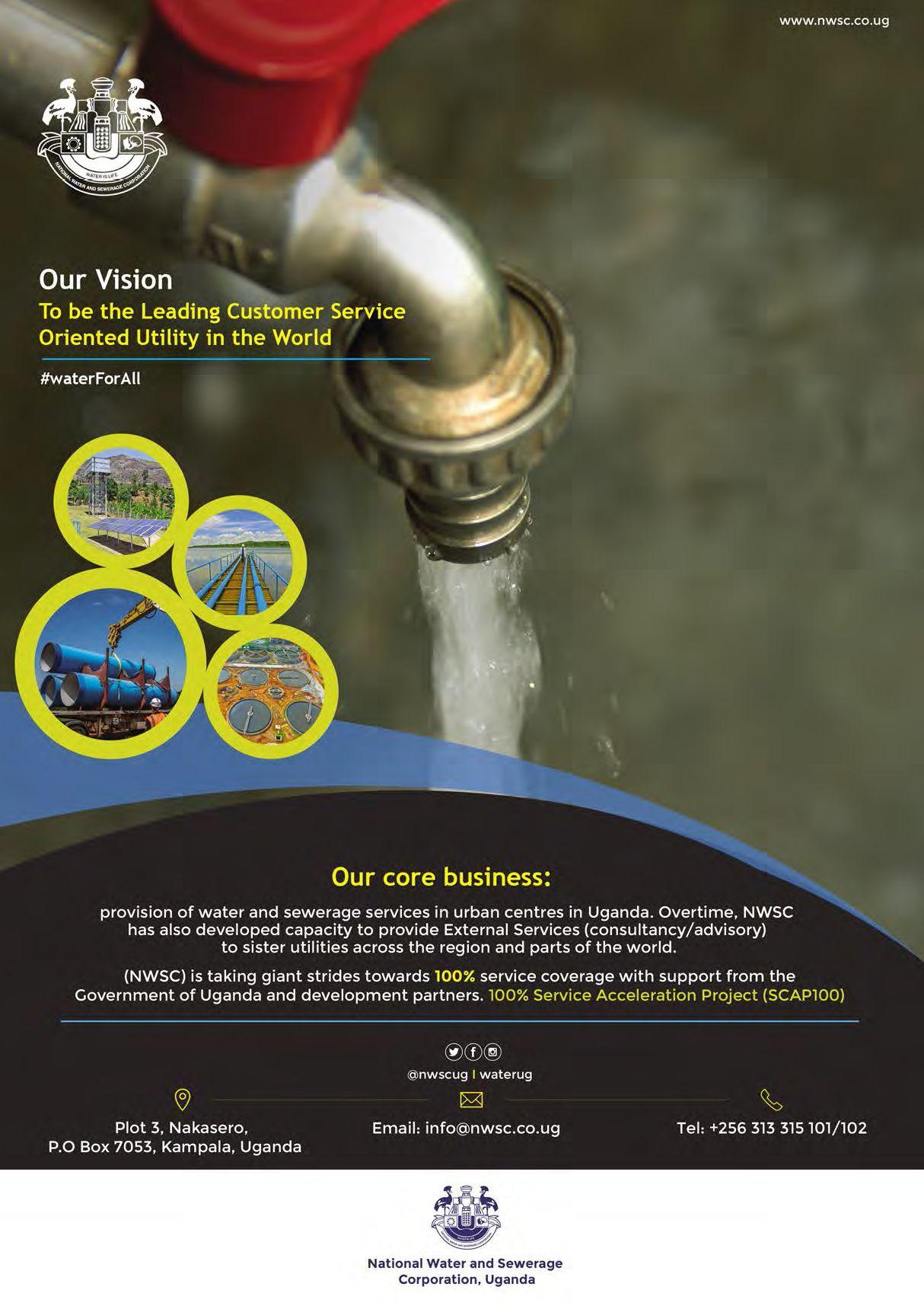
Beyond being the first Cocoa exporter to be certified as Organic in Sierra Leone and creating over 10,000 direct and indirect jobs in the country, Capitol Group has since its inception in 1998 has continued to sustain the rich history of business excellence that dates back to over 100 years. In this exclusive interview with the African Leadership Magazine, the Chief Executive Officer of Capital Foods, …..talks about the company's legacies and commitment to jobs and wealth creation in Sierra Leone, excerpts.
A vibrant private sector is the engine of growth which generates decent jobs and creates increased opportunities for more inclusive and sustainable economic growth in a country. What is your company's mandate and how has it contributed to Sierra Leone's economic growth and development particularly over the last 4years?
The last four years has seen our largest growth as an organization, it has been within this timeframe that we started production of the first local fruit juice product and established the first cocoa processing plant in Sierra Leone. In the process, we have created over 10,000 direct and indirect jobs throughout our value chain both upstream and downstream. Our mission has always been “We nurture lives whilst empowering farmers.” We chose nurture lives because we desire an impact that goes beyond our end consumer, and in multiple ways. We are proud that within the jobs created are those of over 5,000 farmers all over the country. We do not only source fruits and cocoa beans from Farmers, but we also work closely with them by providing inputs, trainings, and guidance. This ensures higher yields per farmer and improved produce quality which translates into higher incomes for the farmers. We have partnered with different communities to develop more than 1,000 hectares of cocoa farms with improved varieties, this will increase the country's production of Cocoa by 10%.
Our development journey started with being the first Cocoa exporter to be certified as Organic in Sierra Leone, a step which led to the full certification of all of Sierra Leone's cocoa exports as organic securing high premiums in European and North American markets. In November 2022, we opened our Cocoa processing plant, where we will produce Cocoa Mass and other chocolate products for both local consumption and export. We are expecting to increase proceeds from cocoa products export by more than 20%, Sierra Leone will be able to export cocoa products to the international market and also support the creation of a regional confectionary industry.
A successful business model is one that can provide solutions to the needs of people. What was the motivation to establish your company in Sierra Leone, i.e., what need did you see and how is your business fulfilling that need in Sierra Leone?
There is growing consumer awareness of health and wellness worldwide and although slower in West Africa there has been significant increase in this awareness in recent times. In Sierra Leone, this has certainly boosted the demand for non-alcoholic beverages coupled with an increase in the number of middle-income consumers. Before Sierra Juice, the only affordable option for recreational or thirst-quenching beverages were carbonated or alcoholic drinks, imported fruit juices are very expensive and inaccessible to the majority of Sierra Leoneans.
On the other hand, as Sierra Leoneans, we are proud of our great tasting fruits but most of those fruits were not even harvested due to lack of markets.
We identified the gap and the opportunity and capitalized on it by creating the first locally produced juice brand which we called “Sierra”. Within two years of operation, it has become the preferred beverage for many because there was a need for a beverage option that is enjoyable, healthy and affordable to a wider consumer base.
We applied the same principle and value concept to cocoa and chocolate products, while we import relatively expensive chocolate-based products, we export our raw beans at much lower prices. We saw a clear need to pioneer the first cocoa processing plant in Sierra Leone. How many years have you been operating in Sierra Leone? Can you tell us about your experience in establishing and operating your business in Sierra Leone?
Capitol Group was founded in 1998, however, I come from a family line that has been doing business in Sierra Leone for more than 100 years. After graduation, I joined our family business in 2005, and since then we have founded more than five successful businesses spanning across the agriculture, logistics, tourism, and energy sectors.
While each market and each sector have its own opportunities and challenges, there has been a continuous positive trend on multiple levels. One of the most important enablers of doing business in Sierra Leone is the
60 P A G E
friendly environment from both the population and the government. Both the urban and the rural communities we operated in regarded our activities as a positive development and embraced us. In fact, I personally believe that the credit for our success goes to the patronizing of the nation. However, since the manufacturing industry is nascent in the country, one of the hard-learnt and costly lessons is that you need to be a 360 degrees company. The lack of supporting industries mean you have to be able to do internally a lot of the services that would ordinarily be outsourced. This threat has become an opportunity for us as we have become more vertically integrated, enabling us to become more resilient and adaptive to global disruptions.
What is your company's medium- to long-term goals and how do you plan on achieving them?
One of the long-term goals is to export at least 30% of our production to the neighboring Guinea and Liberia within the next 5 years. We have been working on increasing our production capacity by installing a new juice processing plant which will increase our production sufficiently to satisfy the local market and beyond. In the short term, we are introducing environmentally friendly packaging which will not only reduce our footprint but give our products a longer shelf-life. For our Cocoa production, we intend to add processing steps that will allow us to produce Cocoa Butter, Cocoa Powder, and chocolate-based confectionaries. Beyond Fruits and Cocoa, we are determined to pursue essential food products that can be produced from locally grown agricultural produce. This is imperative given what we witnessed in terms of food sufficiency during the Covid19 pandemic. Our commitment to Farmers continues, to strengthen our outgrowers base, we have been working with multiple local and international organization to gather data about farmers, the distribution of fruit and cocoa production in different regions, the efficiency and quality of production of the Farmers. This exercise will help us
optimize our fruit and cocoa supply chain.
To pursue these goals and more, the company is intending to go into a funding round very soon. We have launched our transformation Plan and started discussions with multiple financial and development institutions, we believe we will be able to conclude this round by end of 2022.
The private sector is an enabler for job creation especially for the burgeoning youth population. How many direct and indirect jobs has your business created? What has been the socio-economic impact on local communities, and the country at large?
We have created over 10,000 direct and indirect jobs throughout our value chain in our Cocoa, Fruit juice, hotel and logistics companies. In our Cocoa and Fruit business in particular we target a female gender quota of 30% and youth quota of 30%. Before our interventions, the agricultural sector was dominated by smallholder subsistence farmers using poor agronomic practices, these Farmers have seen an increase in their incomes by 150% in the last 10 years. We also provide literacy training for our farmers and encourage the creation of SMEs along our value chain to ensure sustainable incomes and occupations.
His Excellency President Julius Maada Bio's New Direction Agenda (20182023) recognises the need to create a positive enabling environment for the private sector. What are the main areas that the Government of Sierra Leone has provided support to you to grow your business? Also, what areas do you think the Government can improve to support you and the private sector in general in the country?
Since His Excellency President Bio won the election, he made it very clear that he believes that the private sector is what can create a sustainable economic growth. To this end, his government has introduced multiple incentives as laws in the subsequent finance acts covering Corporate Tax
Holidays, Reduced Custom Duties on equipment, machinery and raw materials, and Reduced Corporate Taxes for provinces-based companies. They have also made it easy to bring expatriate staff while ensuring that local expertise would be developed. The Ministry of Trade and Industry provided all the support we needed to join the Ecowas Trade Liberalization Scheme which allows us to export duty free to ECOWAS countries. Fuel is one of our main costs, we relied heavily on our inhouse power plant, however, today we run substantially on the grid, reducing our costs drastically
Yet, the work is far from done. A systematic change would require further investment in infrastructure and human capital. His Excellency is a staunch believer in both as pillars from this transformation.
The Government is focused on its support to private sector investment and public private partnerships in key growth sectors and development of value chains. What investment opportunities do you see ahead in Sierra Leone and how can the private sector and the Government work together to make that a reality?
I do believe that the private-public partnership is the way forward even in unorthodox projects like Agri processing as it can be linked directly to food security whilst still having a high-income potential. On the other hand, there is a great potential in the areas of waste management, energy generation and distribution especially of renewables, government digitization, infrastructure projects including housing, market-systemenabling projects, logistics and transportation, communication, mining and of course tourism.
Sierra Leone has been blessed with lot of resources which were not properly utilized due to the war and its impact: a fertile land, a beautiful coast, abundance of minerals, and an underdeveloped public services.
61 P A G E
AFRICA YOUTH LEADERSHIP:
Accountable leadership remains one of the biggest challenges to development in Africa. Leaders in Africa have not always responded effectively to the needs of the continent, but there is hope in the rising generation of youth who could play a critical role in building accountability for successful economic transformation, representation, and public service. The urgency of these efforts is not lost on the youth, as they have the most to lose if solutions are not enacted.
By 2030, 375 million young people in Africa will reach working age—a population equivalent to the combined populations of Canada and the United States. Just two years ago, the International Labor Organization reported that 160.8 million youth in emerging and developing countries were living in poverty, i.e., on less than $3.10 a day, with young women and minorities disproportionately affected. Youth unemployment, which improved from 11.6 to 11.2 percent in sub-Saharan Africa from 2008 to 2018, still needs much work to decrease significantly more. Part of the solution will be to strengthen democracy and governance systems throughout the continent.
Many of the countries that were swept up in the global wave of democratization and liberalization in the 1990s are now facing weak institutions and failing to fulfill citizens' basic needs. Despite notable progress, too many citizens still face insufficient security, poor healthcare and education, unemployment, illegitimate elections, inadequate judiciary systems, and challenges to free expression and participation in civil society. But, young people across the continent are important to creating structural change.
YOUTH IN POWER: A SEAT AT THE TABLE IS NOT ENOUGH
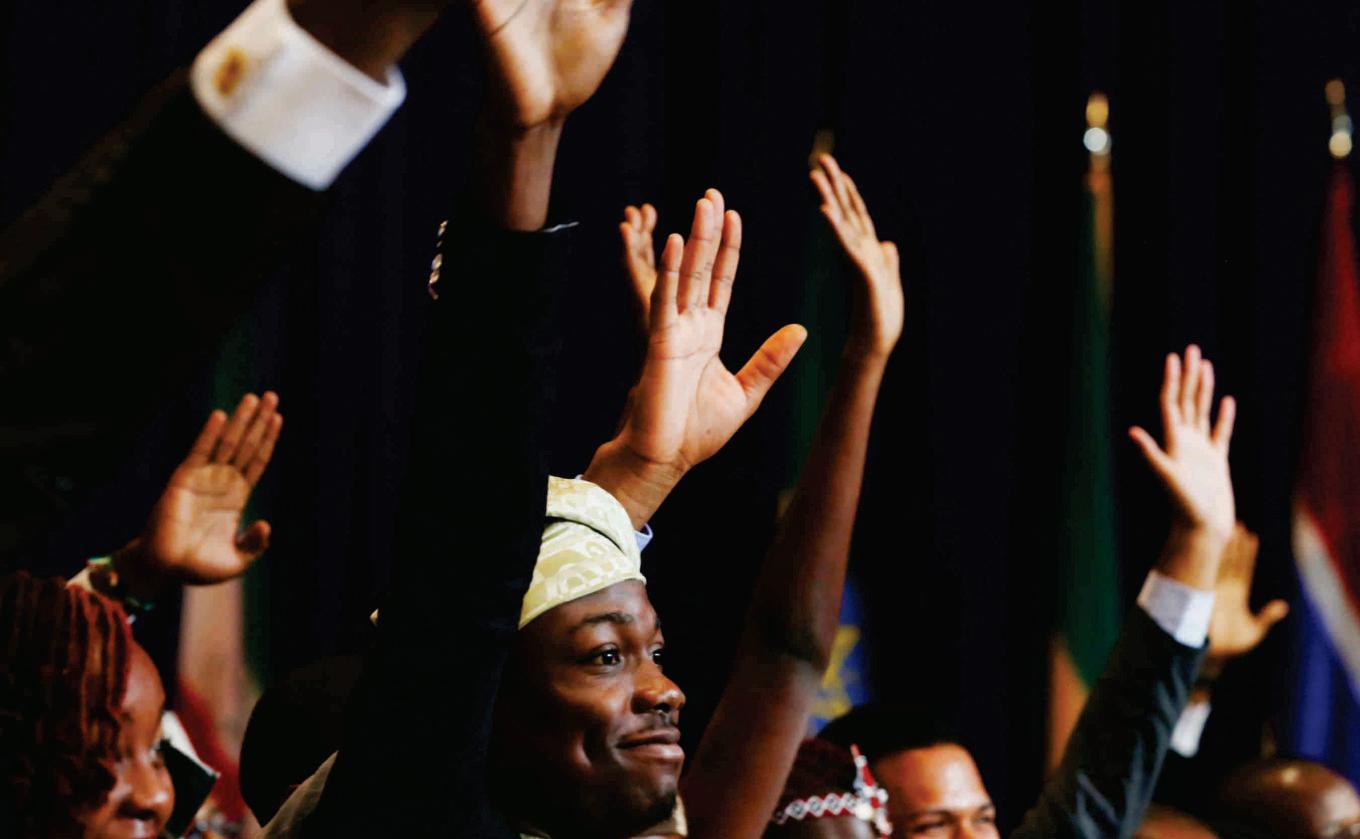
By current numbers, 70 percent of sub-Saharan Africa's population is under the age of 30, representing about 743 million of the 1.061 billion people in this region. This demographic bulge has significant implications for economic activity, public service provision, and state stability. By 2050, one out of three young people in the world will be living in sub-Saharan Africa. Given the actual high unemployment and vulnerable employment rates for youth, the group with the most at stake, young African leaders deserve to be part of the policy discussions that seek to find solutions to the challenge of employment.
Most African leaders are 55 years old or older, with some as old as 75. This represents a significant gap between those deciding policy and those who have to weather its effects. At the parliamentary level, only 14 percent of members are under 40 years old. African parliamentary compositions reflect the global trend, wherein only 14.2 percent of the world's members of parliament are under 40 years old. With African countries on track to account for half of the world's population growth and an exponential increase in the number of young people, the number of young parliamentarians should be higher
Further, the youth need to take more places in presidencies, councils of ministers, parliaments, national committees, corporate boardrooms, and civil society organizational teams.
Several programs exist already for youth inclusion in decision making bodies, including the United Nations
AFRICANLMAGAZINEwEADERSHIP ww africanleadershipmagazine co uk
YOUTH LEADERSHIP 62 P A G E
Population Fund Global Youth Advisory Panel and the Global Fund to Fight AIDS, Tuberculosis, and Malaria. But beyond symbolic memberships and flagship roles, youth should be fully vested with effective and executive responsibilities.

On the continent, some young people were appointed ministers by the age of 35 such as in Mali, Cote d'Ivoire, or Botswana. However, these outliers do not constitute the critical mass necessary for change.
Young leaders must have the courage to apply for official positions, and current officials should be willing to cede important tasks to young people's innovative ideas and influence. The number of young leaders must be higher considering the demographics of the continent.
When young leaders reach positions of influence, they should focus on building strong institutions for accountability and educate people about the importance of broad accountability for a successful continent. Countries with higher levels of accountability collectively outperform those with lower levels. Youth leaders can advance civil society growth, poverty reduction, economic expansion, and innovation throughout the continent by strengthening the participation of women and youth, promoting human
rights, facilitating access to justice, and ensuring inclusion of all communities.


THE FUTURE OF AFRICA AND THE WORLD
Young leaders are poised to take hold of powerful organizations, institutions, and groups because they have already led change at the social level. According to the African Leadership Institute report, “An Abundance of Young African Leaders but No Seat at the Table,” approximately 700,000 young Africans have already been exposed to some form of selective leadership initiative, so the challenge now is to tap into these pools of young leaders.
Youth-led movements like Y'en a marre in Senegal and Balai Citoyen in Burkina Faso are testaments to young Africans' capacity to reinforce constitutional accountability at the presidential level. Through self-organization and the integration of technology, youth have improved the implementation of programs and policy. Young people in Kenya, for example, used technology to track violence throughout their country in 2010 and increased political participation in their broader communities in the reporting process.
AFRICANLMAGAZINEwEADERSHIP ww africanleadershipmagazine co uk YOUTH LEADERSHIP
63 P A G E
Actions to Prepare African Countries Better for the Next Pandemic
Globally, cases of COVID-19 and related deaths are lower in June 2022 than they were at the beginning of the year. But the infection numbers are rising. Africa is no exception.
The past two years have caused unimaginable disruption of normal life. And these disruptions continue to delay the recovery of economies and health systems in Africa.
To meet the continuing health system challenges and avoid the same fate in future pandemics, African countries must take bold actions to repair their health systems and make them more resilient.
The Independent Panel for Pandemic Preparedness and Response set up by the the World Health Organization (WHO) released its second report in May 2022. In advising on how to curtail the current pandemic and prepare better for the next one, the report draws on scientific research and expert roundtable discussions.

Get your news from people who know what they're talking about. Get newsletter
I contributed to this report, Transforming or Tinkering? Inaction
lays the groundwork for another pandemic, which recommends global and local actions. As different continents and countries are at different stages on the road to meeting these recommendations, African countries should extract the actions relevant to them and work these into their health systems and epidemic preparedness plans.
The recommendations from this new report build on those from previous reports by the panel. They looked at five aspects: equitable access to tools; health financing; the WHO's role in surveillance, detection and alert; political leadership; and
5
HEALTH 64 P A G E
preparedness. The new report updates the recommendations to fix a still broken public health system.
Five actions to fix the system
1. Make tools available to all equally
The first action the panel recommends is to stop the current COVID-19 pandemic through equitable access to health tools such as medical supplies.
In 2020 the WHO launched the ground-breaking Access to COVID-19 Tools Accelerator. This global collaboration was intended to accelerate development, production and equitable access to COVID-19 tests, treatments and vaccines. It is now widely accepted that, when judged against equitability and access, the accelerator has not met expectations. For example while the global vaccine coverage for the first vaccine dose is 66%, for Africa this figure is 17.8%.
The panel recommends a comprehensive and independent evaluation of the Access to COVID-19 Tools Accelerator, involving civil society. The aim would be to learn lessons and improve it. African experts should contribute, because the continent has suffered most from inequitable access to COVID-19 medical products such as rapid tests and vaccines.
African governments should call for global intellectual property waiver policies for COVID-19 tests, treatments and vaccines and use these to grow domestic pharmaceutical capabilities. They should also push for a pre-negotiated platform to facilitate equitable and timely access to medical products on the global market during emergencies.
2. Make finance available
The second recommendation is to have a preparedness financing structure that “involves and serves every country”. Funds set aside for pandemic preparedness and response, primarily by G20 nations, were inadequate for the the COVID19 response. Dispersion was slow and the little available funds resulted in
lower-income countries incurring more debt. Going forward, international pandemic funding should be based on ability to pay and needs prioritisation.
3. Strengthen the WHO
The panel also called for strengthening the authority and financing of the WHO through increased member state fees. The aim would be to augment WHO's function of surveillance and detecting new threats leading to earlier warning. Differences in COVID-19 epidemiology and impact clearly demonstrated that Africa's health policy requirements must be informed by local events and data rather than global trends. So the WHO's regional body needs more support to respond in ways that are relevant to the African context.
4. Improve political leadership
The report identified a lack of coordination between national governments, regional bodies, UN agencies and other stakeholders. The recommendations call for a UN political declaration on pandemic preparedness and the establishment of a UN Council for Pandemic Preparedness. African countries should be represented on these bodies. Strengthening the authority of the WHO's African body and the African Union to rapidly announce potential pandemic threats, investigate them and recommend interventions without country impediment will expedite appropriate responses.
5. Prepare
The report makes several suggestions for preparing for the next pandemic. At a global scale it recommends formalising a periodic review of universal health coverage. And countries should conduct transparent reviews of their COVID-19 responses and learn lessons for future pandemics.
But COVID-19 has clearly shown that current indices of preparedness, such as COVID-19 readiness status, did not distinguish between lack of preparedness and vulnerability. Africa
was rated as poorly prepared for COVID-19 but was actually less vulnerable because of many factors, including demography and outdoor lifestyle. Therefore, preparedness indices should be revised to have a more comprehensive perspective of preparedness, vulnerability and resilience.
The next pandemic is unlikely to be COVID. The world must plan for new threats. The G7 has an ambition to be able to develop biological intervention to future pandemic threats within 100 days. But the experience of the 10 year wait for HIV antiretrovirals and challenges accessing COVID-19 vaccinations shows that the wait will be much more than 100 days for innovations from other continents to reach Africa. Therefore African countries needs to strengthen its basic public health interventions that protect across many different pathogens.
Superimposing responses to a new disease on already weak health systems in Africa has further weakened them. So in addition to public health, Africa's preparedness plans need to focus on health system strengthening and resilience. The next pandemic
When acting on the panel's recommendations, African countries must adapt them to address their specific health system weaknesses, such as the ability to produce medical supplies domestically
African governments and institutions also need to improve medical procurement and regulatory processes through already existent regional institutions and structures.
Only through domesticating the recommendations will African countries derive the greatest benefit and support from global initiatives.
AFRICANLMAGAZINEwEADERSHIP ww africanleadershipmagazine co uk HEALTH 65 P A G E
How The Zambian Kwacha Became The World’s Second-best Performing Currency
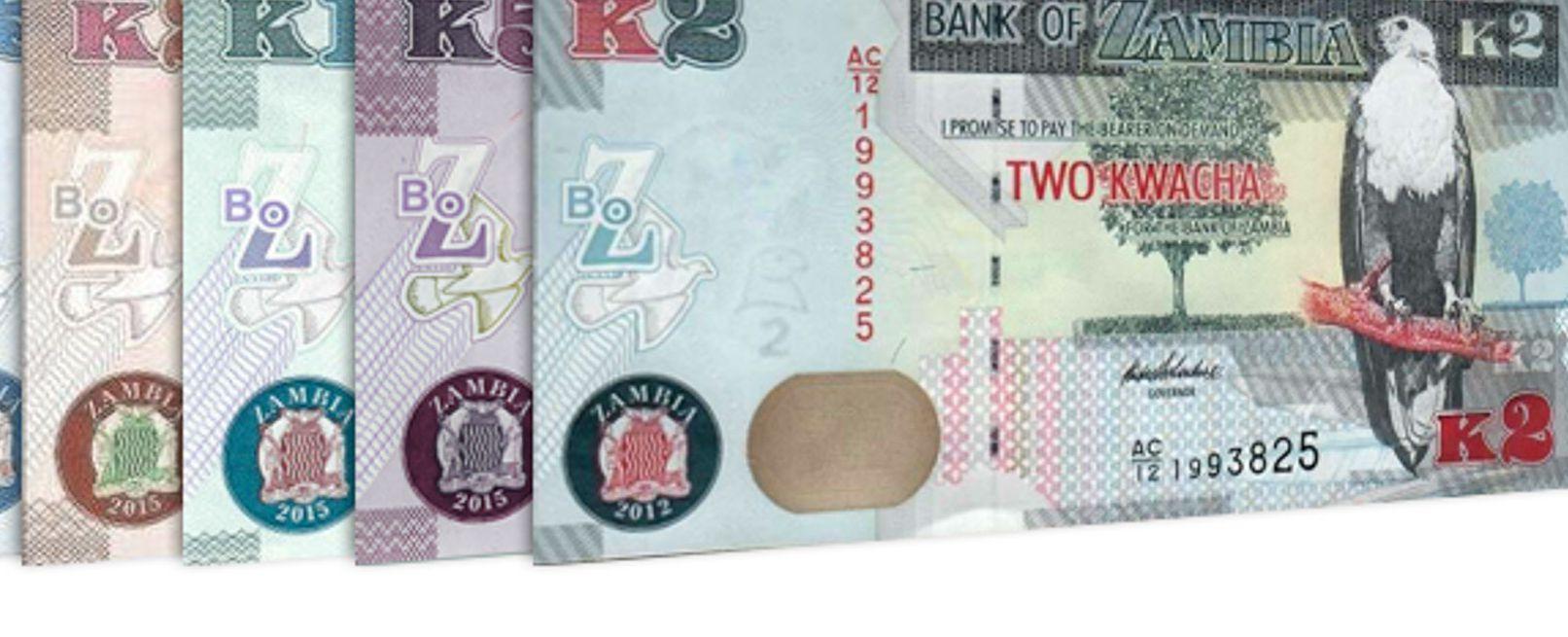
Zambiaʼs economic progress has become the talk of the continent today. But thereʼs more focus on how the Zambian kwacha is now the worldʼs second-best performing currency and Africaʼs 6th most powerful currency.
Itʼs not out of place that the world is surprised by this sudden growth because the Zambian kwacha was one of the worst performing currencies in 2020. However, the reasons for this surge are not far-fetched.
New-found political stability
In July 2021, the Kwacha fell to K22.6 per dollar, continuing a losing streak from the previous year. There were widespread concerns that (former) president Edgar Lunguʼs economic risk-taking was unsustainable. For instance, Zambia was Africaʼs first pandemic-era sovereign defaulter in November 2020.
But after the country held its elections and Hakainde Hichilema –a renowned businessman and activist–emerged president, there was a fresh burst of optimism. Following the general elections on August 12, the Kwacha gained 30 per cent against the dollar to hit K15.89 per dollar. The currency went on to record its best year since 2005.
Restored mining bullishness
hunting for new projects in the country. Anglo American Plc also announced a new joint venture in Zambia.
Aside from Hichilemaʼs zeal for the industry, thereʼs a growing awareness that copper and cobalt are central to the worldʼs shift toward renewable energy, and security of supply will become crucial in the coming decades. The global copper market is tightening, so new mines are difficult to find. In cobalt, Congo is so dominant that itʼs impossible to ignore. Consequently, the Zambian kwacha has been in high demand, as revenue from the countryʼs exports increased by 14.2 per cent to $5.9bn in 2021. According to the Bank of Zambia, copper contributed $4.4bn to the countryʼs total earnings that year.
Recently, First Quantum Minerals also launched a nickel mining project in Zambia. Nickel is a key metal in lithium rechargeable batteries, stainless steel manufacture and jet engines.
Massive debt relief
Hon Isaac Munyau, MCA Kee Ward
Zambiaʼs dollar debt, including arrears and state-owned company liabilities, rose to $17.3 billion by the end of last year. Paying back that much debt would mean the country needs more dollars, thereby weakening its currency However, Zambia is now intent on reworking its loans.
Zambia is Africaʼs second-largest copper producer, behind the Democratic Republic of the Congo. Mining has long been a cornerstone of Zambiaʼs economy, comprising 77 per cent of its annual export value and 27.7 per cent of its annual government revenue.
But despite the lucrative resources, western mining companies have for years put more effort into trying to get out of, than into the African copper haven. Policy u-turns and cash grabs have been the primary causes of their increasing frustration.
All of a sudden, thatʼs not the case anymore. Existing investors are doubling down, and others — like giant BHP Group — are snooping around the region for the first time in years. First Quantum Minerals Ltd. finally approved a billion-dollar expansion in Zambia, while Barrick Gold Corp., which considered selling its Zambian mine, is
On July 30, Zambiaʼs official creditors, led by China and France, agreed to negotiate a restructuring of their debts. Consequently, Zambia got final approval from the International Monetary Fund for a $1.4 billion bailout. Following this news, the Zambian kwacha advanced to its highest level since September last week
Investors are now keen to get their hands on local currency bonds issued by the Central Bank. At the end of December 2021, the size of Zambiaʼs government securities increased 7.1 per cent to K192.9bn ($11bn). Non-resident investors owned K54.1bn ($3.1bn) compared with K44.8bn ($2.5bn) at the end of June. Last Tuesday, Zambiaʼs $1 billion of Eurobonds due 2024 advanced for a 10th straight day, gaining up to 0.3 per cent to 60.9 cents on the dollar
AFRICANLMAGAZINE EADERSHIP EDUCATION www africanleadershipmagazine co uk 66 P A G E
Nigeria Pitches Debt Forgiveness for Climate-Change Funding Plan
Creditors should consider forgiving poor countriesʼ debts in return for a commitment to using outstanding payments on programs to mitigate climate change, Nigerian Vice President Yemi Osinbajo said, during his visit to Washington DC recently

In addition to freeing up government budgets, such a plan would enable creditors and debtor nations to allocate the spending to their so-called National Determined Contributions, Osinbajo said in a speech at the Center for Global Development in Washington DC. The NDCs, agreed in Paris in 2015, represent commitments by countries to reduce greenhouse-gas emissions and adapt to climate change.
“I think this might also be a point to consider especially when we look at the escalating debt situations of many developing countries, especially in the aftermath of the pandemic, and the Russian-Ukrainian crisis,” Osinbajo said.
A growing number of developing nations are facing debt distress as the economic effects of Russiaʼs war with Ukraine compound the impact of the coronavirus pandemic. At least 20 emerging market sovereignsʼ dollar bonds are trading in distressed territory, according to data compiled by Bloomberg.

Some of those may join Sri Lanka and Belarus, which defaulted this year.
Osinbajo also said that Africa will need a fourfold increase in investment to achieve the energy mix needed to limit global warming to 1.5 degrees Celsius.
The continent needs $40 billion a year -quadruple the amount thatʼs been invested since 2018 -- to provide its citizens with access to clean energy sources, Osinbajo said.
He called for a reversal of the trend in which 15% of the worldʼs population in high-income countries receives 40% of global energy investments, and developing countries with 40% of the worldʼs population receive only 15%.
“If energy access issues are left unaddressed, weʼll continue to see growing energy demand being addressed with high-polluting and deforesting fuels such as diesel, kerosene and firewood,” Osinbajo said.
AFRICANLMAGAZINE EADERSHIP CLIMATE www africanleadershipmagazine co uk
67 P A G E

CLIMATE CHANGE
Good Morning,
It is my pleasure to address this meeting of the Committee of African Heads of State and Government on Climate Change.
The COVID-19 pandemic has set back multilateral processes, including around climate change.
It is imperative that we do not lose momentum, and that climate change is not relegated to the periphery of the global development agenda.
Africa is experiencing the worst impacts of phenomena associated with global warming such as droughts, floods and cyclones. Climate change impacts are costing African economies between 3 and 5 per cent of their GDP's. Despite not being responsible for causing climate change, it is Africans

who are bearing both the brunt and the cost.
It is with pride that we can say that Africa spoke with one voice at COP26 in Glasgow late last year
A number of key outcomes and successes were achieved.
The conclusion of the Paris Agreement Work Programme which will provide a basis for Parties to implement fully the Paris Agreement, in the context of a Just Transition and Sustainable Development, and leaving no one left behind.
The complex Glasgow Climate Pact strives to strike the right balance by accommodating the differing national circumstances and capacities amongst the nearly two hundred Parties. The aim is that all are enabled and empowered to contribute their fair share
AFRICANLMAGAZINEwEADERSHIP ww africanleadershipmagazine co uk 56 P A G E
69 P A G E
as well as to enhance their climate ambition.
Glasgow further sends a clear signal that the world will be safer under the 1.5 degree temperature rise scenario, compared to 2 degrees or more.
Developed economy countries have agreed to support the implementation of Just Transitions that promote sustainable development, poverty eradication, and the creation of decent work and quality jobs.
Much more work needs to be done for Africa and the world to keep global temperature rise to 1.5 degrees Celsius by the end of the century.
It is still of concern that the necessary financial flows to enable developing economy countries in particular to mitigate and adapt to the impacts of climate change remain vastly inadequate.
Africa's Special Needs and Circumstances need to be recognized globally because of our natural resource based economies, and owing to high levels of poverty, unemployment and underdevelopment.
Such a decision will unlock the necessary financial flows to our continent as we embark on Just Transitions towards a low-carbon future.
As we prepare for the UN Framework Convention on Climate Change COP27 taking place in the Arab Republic of Egypt in November, Africa must once more speak with one voice, expressing their unwavering support for the implementation of the UNFCCC and the Paris Agreement, and for the primacy of multilateralism.
COP26 recognizes our right to develop our own development pathways towards shared global objectives, based on our national circumstances and the guiding principles of the UNFCCC. Foremost amongst them is equity, and the principle of Common But Differentiated Responsibilities and Respective Capabilities.
We must promote and defend this, as well as the right of all African and other developing countries to support in the form of finance, technology and capacity building.
A one-size-fits-all approach to complex issues such as a transition from fossil fuels that disregards the realties on the ground in Africa will simply not work, and is neither just nor equitable.
To achieve the expected results for Africa at COP27, it is imperative that we develop a strong and well-coordinated Common African Position, and that we formulate a set of robust key messages that encapsulate Africa's aspirations.
Most importantly, we must continue to work together in the spirit of unity and solidarity
I wish to take this opportunity to highlight some of the achievements mentioned in this report, namely
The finalization of the African Climate Change and Resilient Development Strategy and Action Plan 2022-2032 that will be launched during this meeting. It provides a
broad outline for harmonised and coordinated actions to respond to the impacts of climate change, as well as to plan for the continent's low-emission and climate-resilient future.
Work that has been done on advancing the Africa Adaptation Initiative. The AAI has successfully evolved into a promising vehicle for achieving transformative adaptation results for African countries.
The programme of work of the Africa Renewable Energy Initiative has continued. This is a transformative and Africa-led effort to accelerate and scale up harnessing the continent's huge renewable energy potential
The outcomes of the engagements, and progress on resource mobilization for Africa's Climate Programmes by the three Climate Commissions, as well as planned activities.
The report includes the African Green Stimulus Programme, as well as the African Union Green Recovery Action Plan. These plans were developed during the past two years, and seek to harness the opportunities that a green recovery of the continent can deliver.
Excellencies,
South Africa's term as coordinator of CAHOSCC has now come to a close.
I wish to take this opportunity to express my appreciation and gratitude to the both the African Group of Negotiators on Climate Change and the African Ministerial Conference on the Environment for their hard work
They developed the Common African Position on Climate Change ahead of COP26 and promoted and defended Africa's interests at the global climate change negotiations. This sterling work will have an impact for generations to come.
The nations of the world can only address the global climate change crisis by working together. All Parties should honour their undertakings and commitments, and base their climate actions and policies on latest available science. They should furthermore respect the UNFCCC's guiding principles.
I thank you.
I wish to take this opportunity to express my appreciation and gratitude to the both the African Group of Negotiators on Climate Change and the African Ministerial Conference on the Environment for their hard work.
CLIMATE AFRICANLMAGAZINEwEADERSHIP ww africanleadershipmagazine co uk
70 P A G E






































































 P A G E
Mrs. Victoria Irabor & Depowa
P A G E
Mrs. Victoria Irabor & Depowa
































 Mr José de Lima Massano Governor of Bank of Angola
Mr José de Lima Massano Governor of Bank of Angola





































